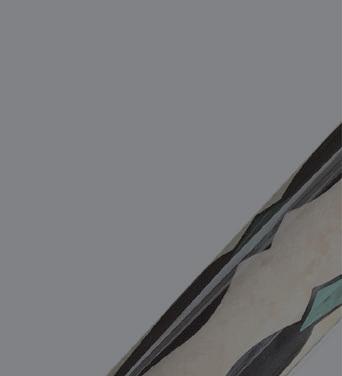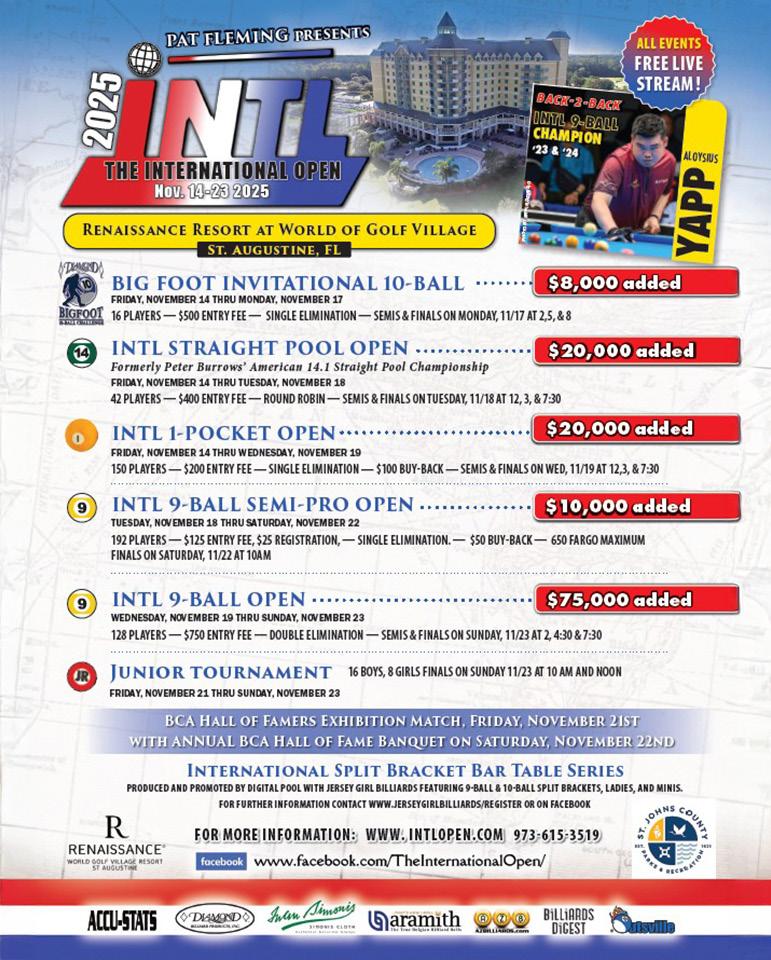




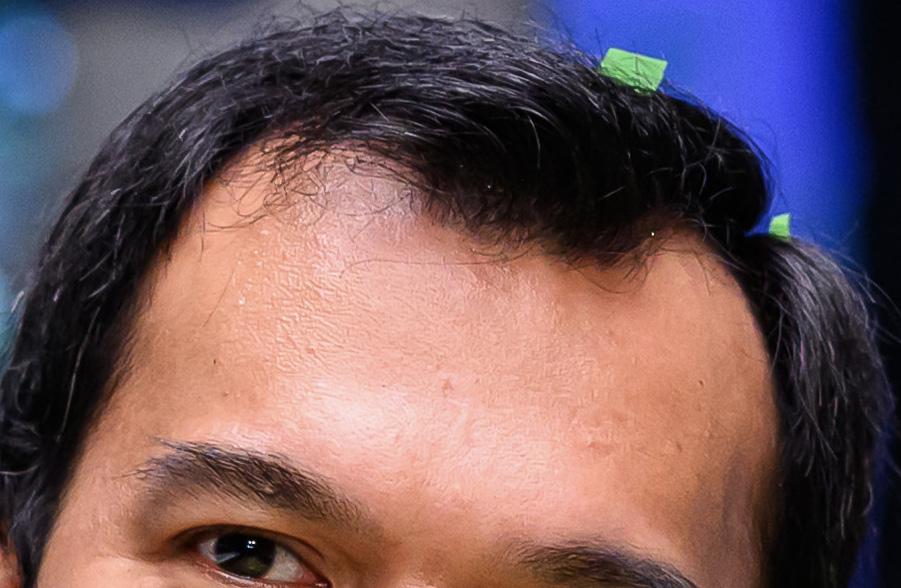
Volume 9, Issue #106
5115 N Dysart Rd #202-123 Litchfield Park, Az 85392 Ph: 678-919-7665
info@azbilliards.com
Brought to you by the team at AzBilliards.com
CONTRIBUTORS:
Skip Maloney
Erwin Dionisio
Phil Capelle
Anthony Beeler
Mary Kenniston
Steve Lillis
Tim Gallagher
Taka Wu - Matchroom Multi Sport Matchroom Multi Sport Ultimate Pool USA
COVER PHOTO:
Taka Wu - Matchroom Multi Sport
GRAPHICS AND LAYOUT: Natasha Dolovacki
Nebojsa Dolovacki
© 2017-2022, The Billiards Buzz is an online only monthly publication. It is published on or around the 30th of each month. All opinions & information expressed herein are exclusively those of the writers or advertisers and do not necessarily reflect those of the AzBilliards. All persons interested in submitting articles and material of interest are invited to do so. Submission of such articles constitutes permission for AzBilliards to use these articles in this publication or online on AzBilliards. com. Article submission or advertisers queries can be sent to us at info@azbilliards.com
MIKE HOWERTON
So, the latest controversy to take over the game seems to be "WaxGate" and the accusations that some players have been doctoring the cue ball with a little wax during their matches, to affect the amount of spin the cue ball will take on a shot.
What I don't see many people mentioning is that this is really old news. Players have been being accused of this sort of thing for the last twenty years. A little silicon sprayed on a player's towel or even in their pocket, that could be applied to the cue ball was not rare back in the day.
It seems like it's much ado about nothing though. Now that it's been brought to the attention of the powers that be, I think we will see less opportunities for players to handle the cue ball and more referees cleaning the cue ball with a towel in between racks.
It sure did give the influencers something to carry on about though.
Until next time, Mike
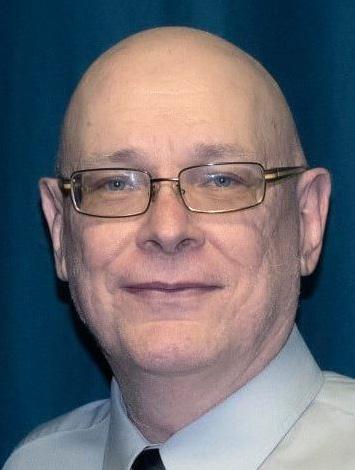
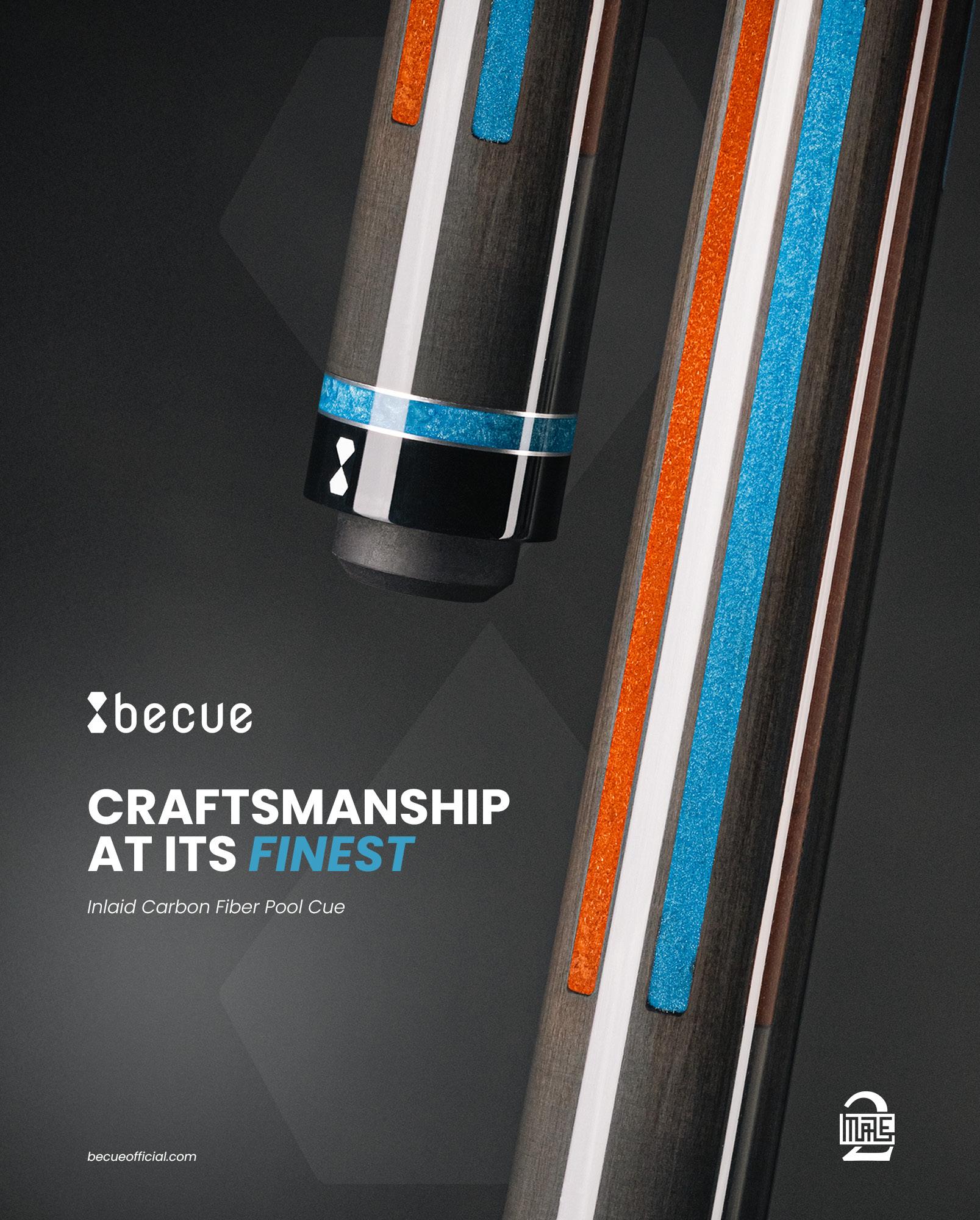
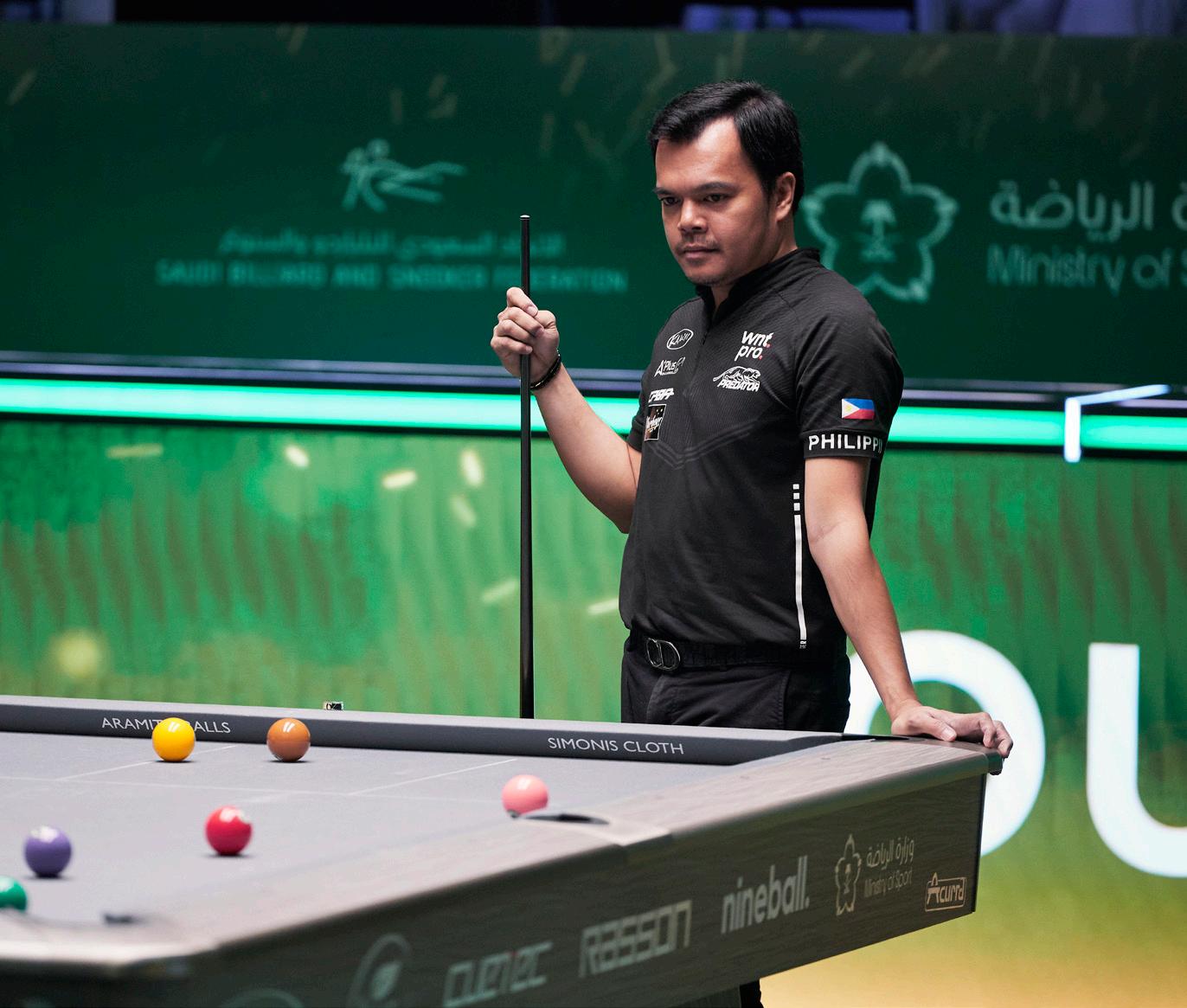

7 Lessons From The WPC Phil Capelle
10 Tip Size and Centering Anthony Beeler
12 On The Road … Again Mary Kenniston
16 World Class Pool
18 Gospel Trick Shots Steve Lillis
34 Pool World Loses Chang Jung Lin
Photo courtesy Erwin Dionisio
36 Chang Jung Lin Gallery
All photos courtesy Erwin Dionisio
38 Van Boening, Gunia and Stumfoll Are The Big Dogs
Article by Mary Kenniston / Photos courtesy Pool Action TV
40 BEF Junior National Results
Article by Samm Diep - BEF / Photos courtesy Erwin Dionisio
46 USA National Championships Inaugural Winner
Article by Skip Maloney - AzB Staff / Photos courtesy Erwin Dionisio
52 Ultimate Pool USA Kansas City Open Winner
Article by Mary Kenniston / Photos courtesy Ultimate Pool USA
54 Bonds Claims First Wheelchair World Titles
Article by Skip Maloney - AzB Staff / Photos courtesy Erwin Dionisio
56 European Junior Champions
All photos courtesy EPBF
58 The Pearl is Back
60 Annita Kan Jaya Joins Konllen Team
62 Tournament Results
66 Upcoming Events
67 AzBilliards Money List
PHENOLIC FERRULE NEW IMPROVED DEFY SHAFT
Introducing the Vanquish Mach 1 – our most technologically-advanced break cue. This state-of-the-art carbon fiber butt features our patented Variable Balance Point technology, which allows you to adjust the weight and balance of your cue. The Mach 1 comes equipped with our newly-engineered Defy break shaft with a Navigator Break Impact tip and phenolic ferrule for maximum power and control.
Availableinlinen,leather&no-wrapoptions!
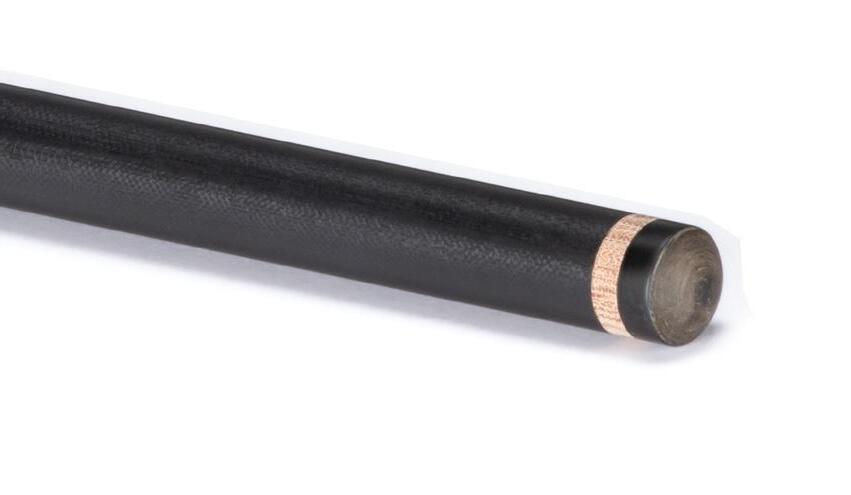
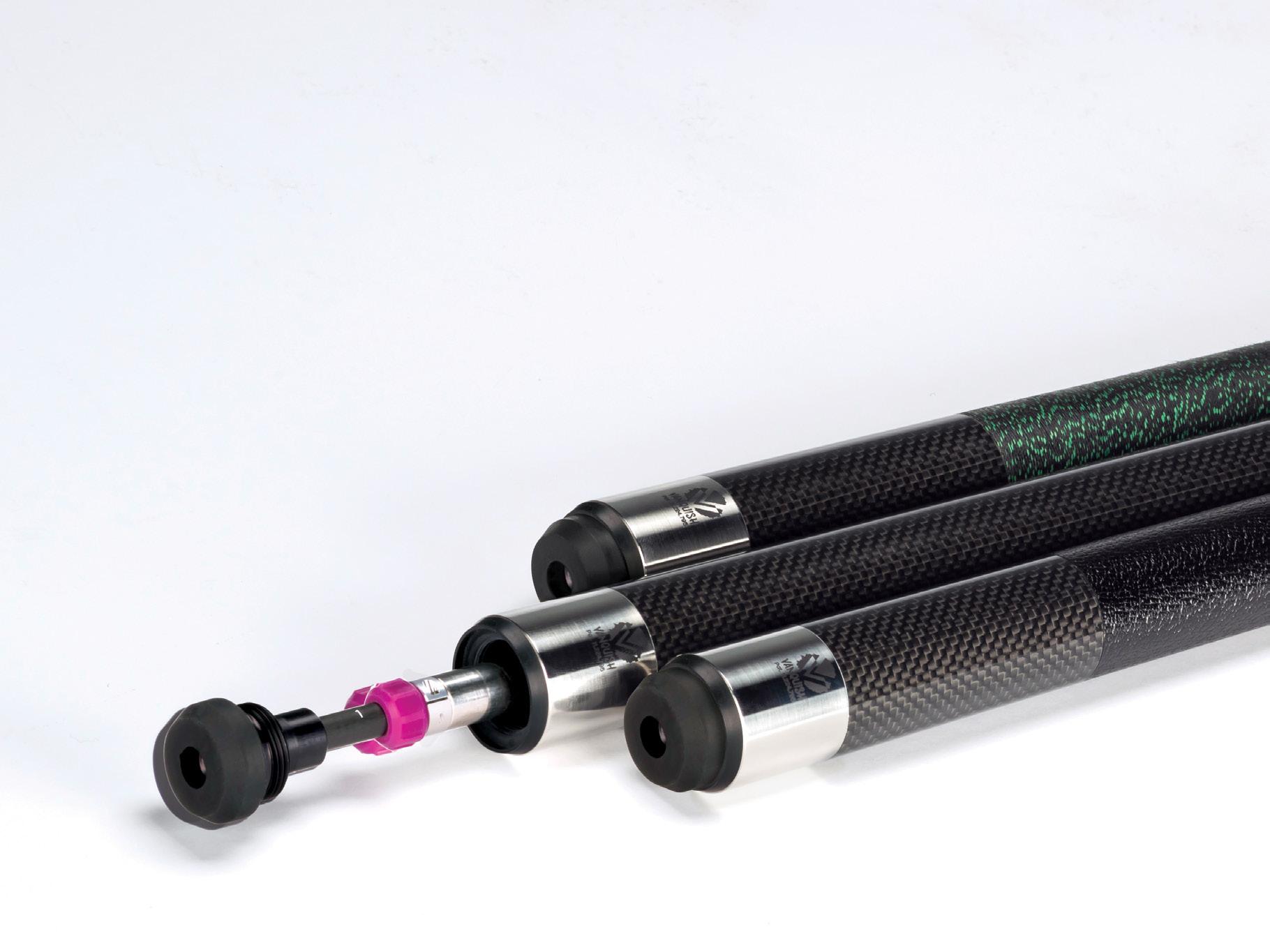
Navigator Break Impact is a hybrid phenolic break tip. Most phenolic tips are designed to generate power, but at the cost of cue ball control. The Break Impact tip’s hybrid construction provides tremendous cue ball control without sacrificing power.
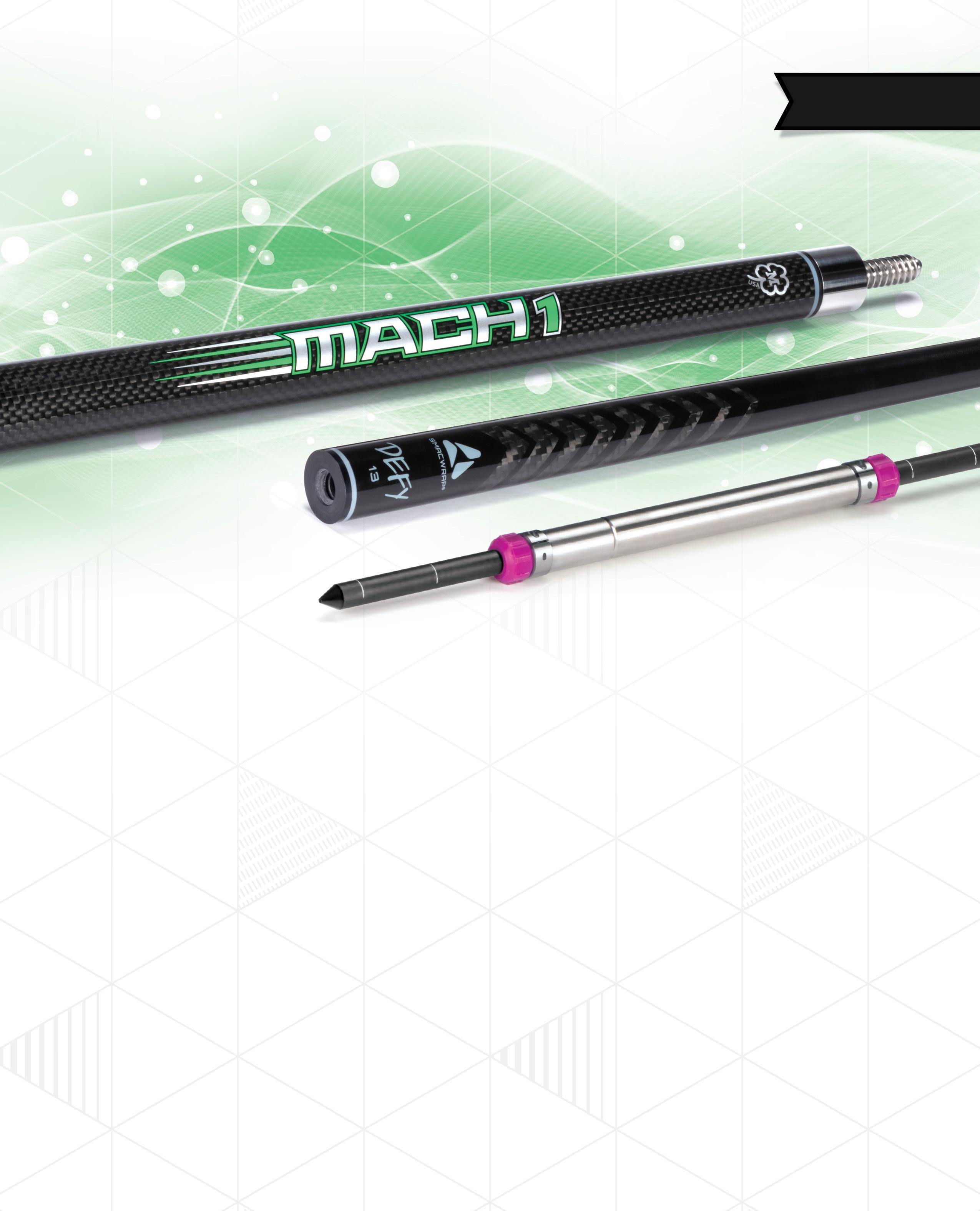
Learn more at mcdermottcue.com/mach1
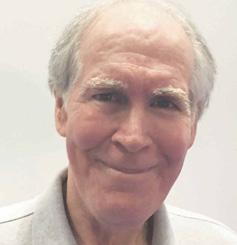
I chose a host of super shots from the recent World Pool Championship (WPC) for this feature, and I then created a series of lessons that were based on my observations. Those of you who read my books or these features in the Buzz know of my fondness for making and studying pool diagrams. While there are so many ways to learn pool, including watching the action live, reading columns and books, watching reruns of top pros in action, I contend that making diagrams is an underappreciated part of the learning process. Why? Because, while creating them, the principles of good play begin to jump out at you. And, as a result, you may develop concepts based on the elements at work – things of great value that you might miss when watching a match in real time where you quickly go from shot to shot.
I must confess that I had a blast watching the finals of this event between Fedor Gorst (Fargo of 847, third in the world) and Carlo Biado (Fargo of 836, ninth best) because, when watching cueists of this caliber playing a race to 15, you are guaranteed to see so many shots that belong on a highlight reel, and in a classroom on pool.
This feature is broken into 2 parts. This one includes my thoughts on Score Progression, the Walkover, Shadow Balls, and other assorted topics. In part 2, which will appear in the September issue, I will feature an
amazing shot by Gorst and Biado’s two closing wins that led to the title.
One of the great joys of watching pros is that, as a match progresses, the score is constantly changing, which is so unlike so many other sports where scoring droughts are so commonplace (See baseball, soccer, football, and hockey). In pool leads and deficits can vary from a single game to a much more. And, of course, the trailing player can tie up a match, which is always an exciting development for us sweaters. In the finals, for example, this race to 15 was tied up following games 4, 18, and 26.
When the score was tied at 13-13 the match turned into a race to 2. A contest that is tied this late in the proceedings is super exciting because we have two to three high pressure games at most in which fans’ rooting interest reaches great heights. Because of the excitement late match ties can generate, I think that they deserve a name. My early vote goes for Pre-Double Hill. What would you call these? Suggestions are most welcome.
Below is a brief summary match with the facts that underscore why, in my opinion, pool is the greatest spectator sport of all.
SCORE LINE: Carlo Biado 15 – Fedor Gorst 13
Gorst – gets off to a strong start with two wins
Biado – responds with a 9 game winning streak
Gorst – replies with a 7 game streak to tie it at 9-9. Race to 6
Biado – takes 4 in a row to reach prehill at 13
Gorst – wins 4 straight to tie it up at 13-13. Race to 2
Biado – runs out, then breaks and runs a complex layout for the W.
My very first column for the Billiards Buzz in January, 2023, was titled Coming to Terms. In it, I introduced a concept I call Shadow Balls. According to my definition a Shadow Ball is one that rests within the boundaries of what would otherwise be an ideal position zone. It can reduce the size of a position zone from very little to a lot.
In Diagram 1 the 9-ball acts as a Shadow Ball because it is smack in the middle of the ideal zone for the 7-ball. When a Shadow Ball is this close to the object ball, the size of your position zone is severely reduced in size. When playing this shot, which took place in the WPC, it would have been easy for the player to end up behind the Shadow Ball, but he didn’t thanks to his excellent speed control.
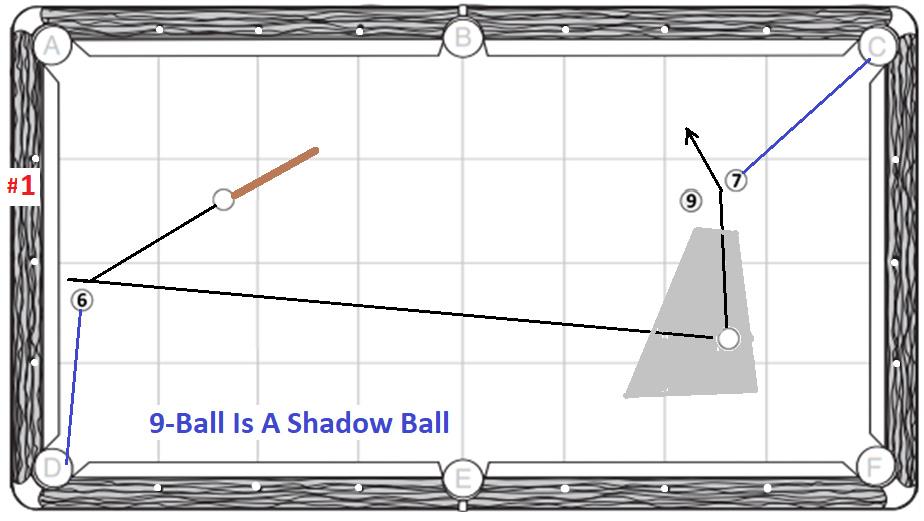
Hyperbole aside, the idea that there are Shadow Balls which must be avoided is simply, in my opinion, one of the most important concepts in all of pool playing theory. This leads to one of my laws for pool: Once you have ingrained a concept into your method, such as Shadow Balls, you start seeing them all over the table. And your knowledge of them, and the steps you must take to avoid getting stuck behind one, begins do wonders for your planning process and you success rate in playing position.
Position plays to the Short Side are generally to be avoided. But pool is full of exceptions, and Gorst showed us yet another one – in this case where the Short Side was, indeed, the Better Side!
Gorst got straight in on the 8-ball, as shown in Diagram 2. His original plan was to have a cut on the 8 and to send the cue ball to Position C on the long side of the 8. But his straight in position on the 8-ball gave him two new choices: One was to roll the cue ball to or near Position B for a long shot on the 9-ball. But even a player who shoots as straight as Gorst might miss from this range into these microscopic pockets.
His other choice was to draw back and across the table to Position C. He chose this route and, as you can see, he executed it to near perfection with
the cue ball stopping at Position A, leaving him a nearly 100% shot on the 9-ball. So, if you miss shape by getting straight in, consider drawing the cue ball back to the rail and out. And, when the situation calls for it, think
about playing shape on the short side.
In Play Your Best Pool I introduced my 22 Principles of Position Play. Each one needs to be learned independently, and then combined, as needed, to meet the needs of the shot.
In this example, in Diagram 3, Route A is a route to the Long Side. If you choose it, you run the risk of ending up behind the 9, which is acting as a Shadow Ball. If you choose Route B, you eliminate the Shadow Ball, but face the risk of scratching. So, which route would you play?
In a special feature for the April 2024 issue of the Billiards Buzz I titled All
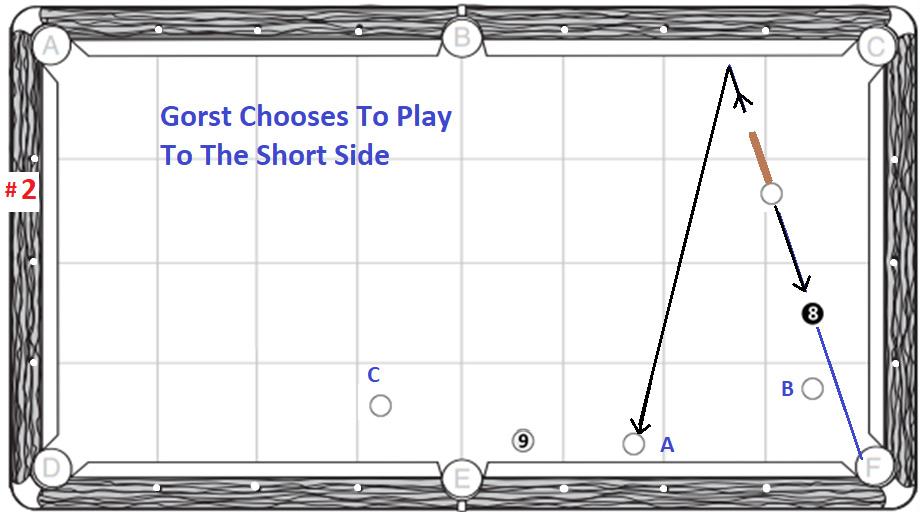

About The Walkover I presented my thoughts on a technique that I named the Walkover (WO). A WO takes place when a player, moments before taking their stance, walks over and stands on the straight-in-line that extends from the pocket to the object ball and beyond, They then take a few seconds to stare down that line.
It is my belief that the WO is one of the worst moves a pro player can use when preparing to play a shot, especially when competing on the clock, because it wastes valuable time and the WO takes time away from using better techniques to prepare for a shot.
In the semis and the finals the WO was on full display, especially by Gorst, though there instances when Biado used it as well. While describing Gorst’s method of play, Scott Frost said, “He’s, patterned his game off those beeps,” which he must do because of the time he spends doing the WO. Frost made the point that Gorst comes so close to shot clock violations – and the reason he does is because of those 5-8 seconds he spends (wastes) doing the WO.
Now let’s turn to that shot on the 5-ball as shown in Diagram 4 . Before playing it Gorst spent 7 seconds doing the WO from the position shown in the illustration. Then he took 9 more seconds over the ball performing his WUS because before making contact
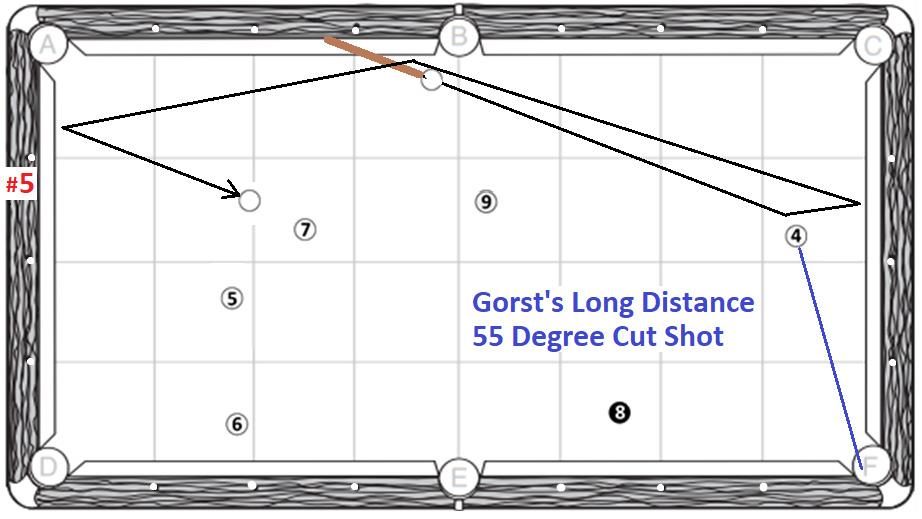
with only 2 seconds left on the clock! I would argue that he could have spent 3 of those seconds to stand on the line-of-aim from the cue ball to the object ball, taken a deep breath, and then use the other 4 seconds to shoot at the 6 seconds left mark, thus avoiding the beeper.
If Gorst had made the shot on the 5-ball he likely would have won, in which case he would have taken a 3-0. But Biado won this game, and his win ignited a nine game streak. So, in hindsight, a case can be made that Gorst lost the match when he missed this shot!
The reason for using the WO is that it should elevate a player’s accuracy. And, it should therefore act as insurance against a miss. But it doesn’t and, in fact, it could actually lead to

missed shots because a player, even one as mentally strong as Gorst, has got to sometimes be sharked by that god-awful noise.
Is sum, Gorst gains on his fellow pros with his skill at jumping, but he gives back some of those gains with unnecessary misses that occur thanks to his habit of doing the WO. And, he almost won a second straight World Pool Championship despite using it!
Gorst pulled off the monster shot shown in Diagram 5 to close the gap to 2 games. As pool math tells us, trailing 9-7 with the break is far better than being behind 10-6 with your opponent set to break.
The score makes its own contribution to the difficulty of this shot, but Gorst was also faced with a 55 degree cut angle. Next, let’s add in the sizeable distances from the cue ball to the object ball, and from the 4-ball to the pocket, and the difficulty rating goes way up. Now stew into the pot the fact that Gorst is bridging off the rail, and that the cue ball needed to travel about 11’ to arrive at a small position zone on the 5-ball, and you have the ingredients for a 9+ difficulty rating on the 10 scale.
And, for good measure, consider that the 7-ball is a Shadow Ball (see pre-
vious subject), one that could easily come into play. Furthermore Gorst had to avoid hitting the point of Pocket B, which he barely was able to do. So, all things considered, this one deserves a standing ovation. I say Bravo!
In Game 20 Biado was faced with a big question: how could he possibly play shape on the 6-ball? He put on his thinking cap and conjured up this moment of pool wizardry with the artful three rail route shown in Diagram 6. To see and plan tis shot, Biado had to have a storehouse of knowledge, an active imagination, and the skill to combine knowing the shot on paper and knowing the shot at the table.
The shot called of a blend of the elements, including low left english while using a hard stroke (a 7 on the Spectrum of Speed). If successful, the cue ball would thread the needle past the 8-ball and 6-ball before ending up
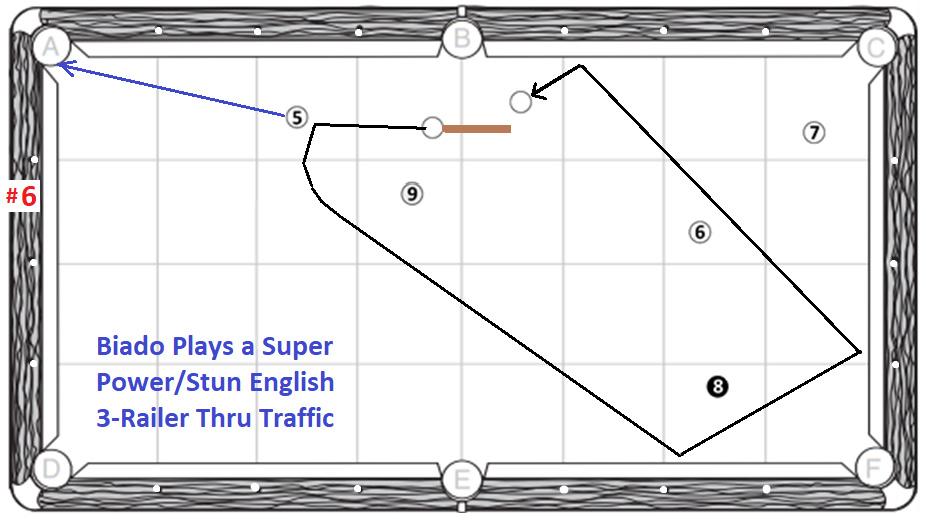
with great shape, as shown. After a shot like this, all that’s left to do is to give the man a big round of applause,
which the crowd most certainly did. And, importantly, this shot enabled him to open up a 2 game lead at 11-9.
Beginning in 1968, Capelle spent 27 years competing in money games, leagues, and tournaments. In late 1994 he founded Billiards Press, and has since written 12 instructional books on pool. Over the last eight years he has conducted extensive research in preparation for his upcoming book, Pool Is The Answer. For a detailed profile of Phil Capelle, see his interview with Melinda Bailey in the April 2019 issue of the Billiards Buzz.

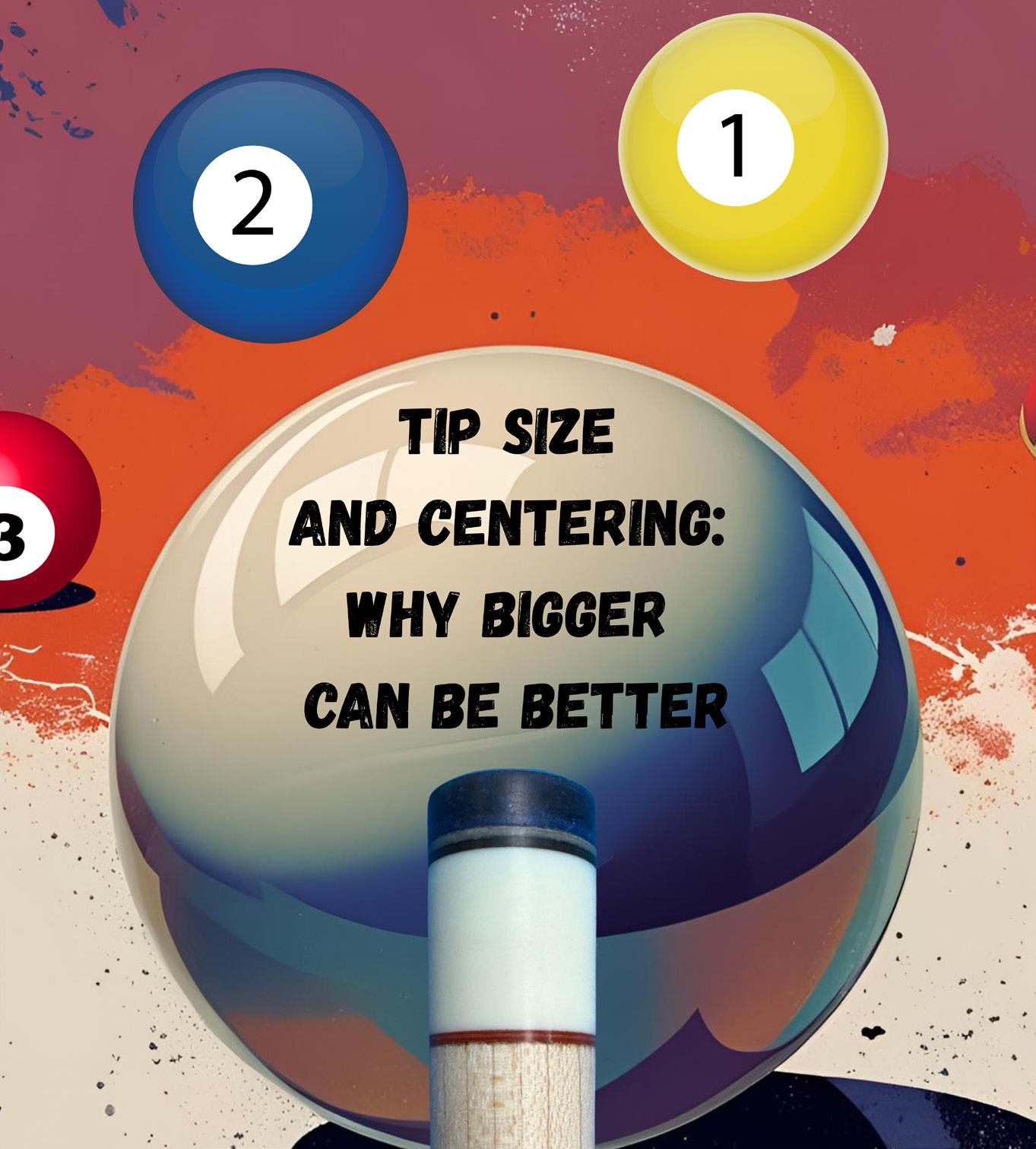
If you’re struggling to consistently strike the center of the cue ball, the issue might not be your stroke mechanics or your aiming technique—it could be the size of your cue tip. While cue tip diameter is often overlooked, it plays a surprisingly important role in helping (or hindering) your ability to stay on-line and avoid unintentional side spin.
Simply put, a larger tip creates a wider contact area on the cue ball, giving you more visual feedback and slightly more margin for error. This means you’re less likely to clip into the miscue zone or apply accidental English. In fact, when you’re under pressure—whether it’s a tournament final or just a key league match—this
extra forgiveness can make a big difference.
That’s why bigger can sometimes be better, especially if you’re still working to develop a repeatable, consistent stroke.
Cue tip size is usually measured in millimeters. The standard for most pool players has long been 13mm, and for good reason—it strikes a balance between precision and forgiveness. But more players are experimenting with larger tips, often in the 13.25 to 14mm range. Some, like legendary champion Earl Strickland, have gone even bigger.

During his final Mosconi Cup appearance, Strickland famously played with a 15mm tip—an unusually large size even among elite professionals. For Earl, the decision wasn’t about following trends; it was about functionality. A larger tip gave him more confidence to find center the cue ball and provided added stability on high-powered shots. That extra surface area gave him peace of mind, especially in pressure-packed situations where perfect accuracy is harder to maintain.
I can personally relate to this. For years, I played with a 13mm tip, like many players. But recently, I switched to a 13.5mm tip paired with a 31inch shaft. I wasn’t chasing power or spin—I was after consistency. That small half-millimeter increase made a surprising difference in my ability to see and strike the true center of the cue ball. The longer shaft, meanwhile, gave me a bit more reach and smoothed out my follow-through. Together, these small changes added up to big improvements in accuracy and feedback.
Of course, it’s important to note that smaller tips aren’t “bad”—they’re just more demanding. Players who use 11.8mm or 12.3mm tips often do
so because they want maximum control over spin. A smaller tip allows for a higher degree of precision when playing finesse shots, particularly when applying side or draw.
Shane Van Boening, for instance, has made a well-documented switch to a 12.5mm carbon fiber shaft from his original 13mm setup. Shane is known for his elite control and ability to manage spin, and the smaller tip complements his world-class stroke. However, most amateurs don’t have Shane’s level of precision—and for them, a smaller tip might lead to more unintentional spin or miscues, especially when playing under pressure.
Shane’s transition highlights a key point: the right tip size depends on your goals and skill level. If you’re at a stage where cue ball action is a top priority, a smaller tip might be right for you. But if your focus is hitting center ball consistently, a larger tip is more forgiving.
The good news is that experimenting with tip sizes is relatively easy—and it doesn’t require changing your entire cue. Many cue companies sell shafts that match your existing cue. In fact, you can choose the exact diameter to match your needs. You can even test out cues from fellow players to get a feel for what size works best for you.
If you’re working on improving your fundamentals, particularly your cue ball centering, consider increasing your tip size by half a millimeter or more. It might seem like a small change, but it can produce big results. You’ll likely find it easier to aim and pocket balls.
At the end of the day, your cue should be an extension of your body—and the more it helps you reduce errors and build confidence, the better your
game will become. Just as playing chess requires careful positioning and forward thinking, mastering cue tip size is about making strategic choices that support long-term growth.
So, if you’re tired of missing the center of the cue ball, maybe it’s time to go bigger. You might be surprised just how much more consistent—and confident—you feel.
Anthony Beeler is the current Billiards Instructor of the Decade and is a former BCAPL National Champion. He has numerous “Top 25” national finishes and is the primary author of the ACS National Billiards Instructor’s Manual. He has also authored the book Unstoppable! Positive Thinking for Pool Players. Anthony currently has the highest established Fargo Rating of any Master Instructor. He has won over 300 tournaments and has defeated numerous professional players in tournament competition.
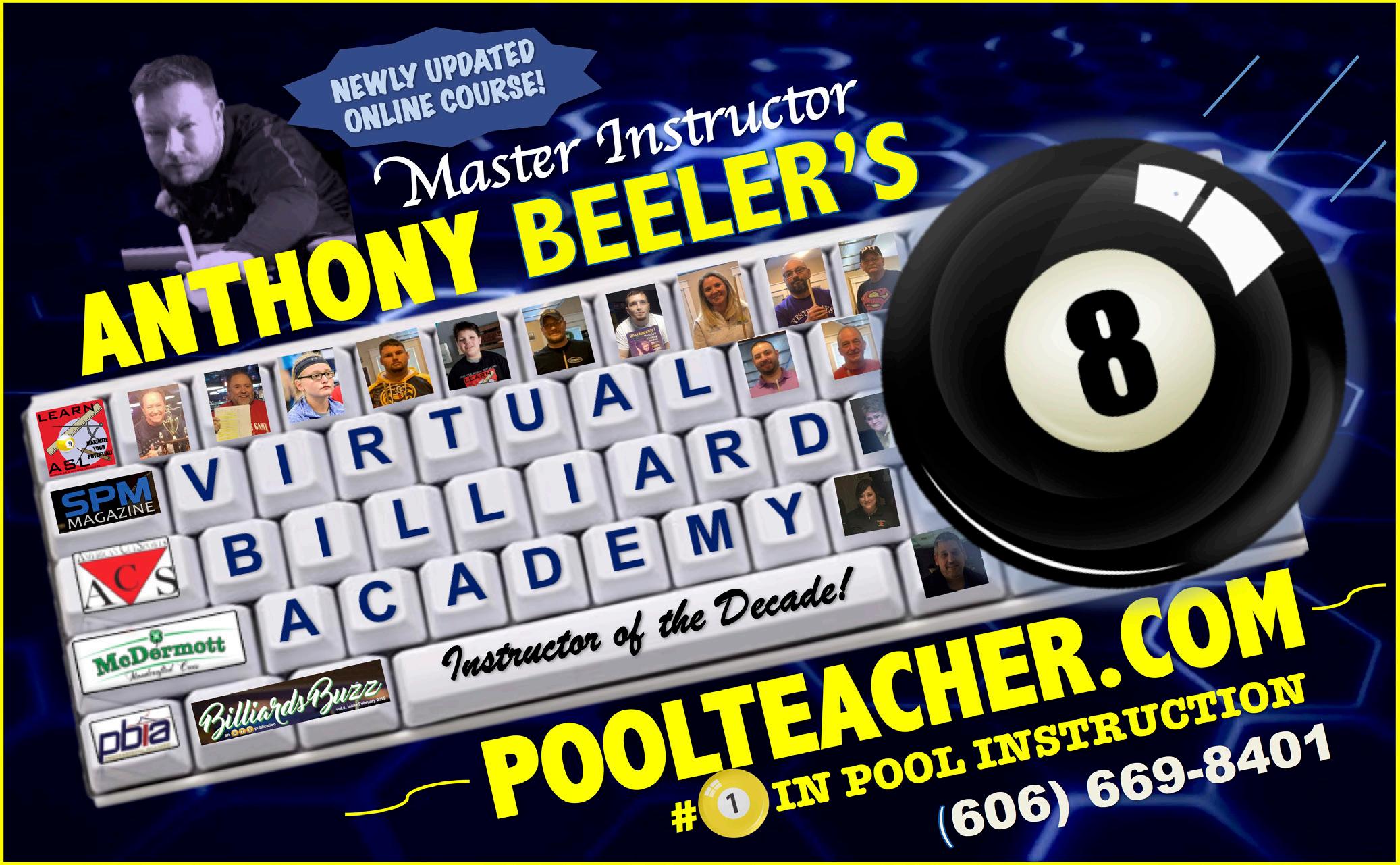
Mary Kenniston
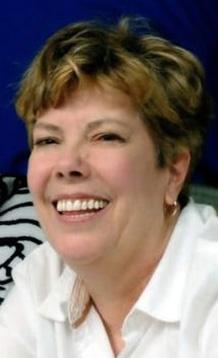
The year was 1979 and I was a month or so into my first road adventure. I had gone from Little Falls, NJ to the US Open Nine Ball Championship in Norfolk, VA. I was in heaven – I had non-stop action and got to watch some of the best players in the country.
Ihad played in $5 and $10 ring games, matched up and played $5$20 action and was making money hand over fist! There was action on every table and I had my choice of customers. I was averaging a few hundred a day – I was in heaven!
One of the other female players, Cass, was also in non-stop action and hounded me constantly to play but I repeatedly turned her down. It wasn’t that I didn’t want to play – I knew I could win. I just wanted to save her for the end of the week after she had run around every day building up her bankroll.
The last day of the tournament rolled around. As expected, Cass found me and again woofed at me to play some nine ball – she had a table we could play on. I think she was a little surprised when I agreed to play her some hundred dollar sets. After losing five or six sets even though I made sure to keep them close, she pulled up.
After watching the US Open finals, I found Buddy and thanked him for helping me with my game. He asked me where I was headed – I told him I was driving to Louisville, KY as I had qualified to play in the BCA National 8 Ball Championships.
Wishing me luck, he handed me a business card for Boulder Billiards in
Tulsa, OK. He invited me to go there after the Nationals – that’s where he was headed and told me I could get plenty of action in Tulsa. I took the card but told him I was going to head back home after the tournament. He smiled and said he’d see me somewhere down the road.
The following morning, I headed to Louisville for the Nationals. There
were quite a few women players there and although I was dying to match up with them, the small pool room near the tournament site was so packed, I could never get a table.
Meanwhile, I played pretty good winning all my matches and ended up in the finals against the always tough Gloria Walker. I knew Gloria from previous WPBA events – she was a top

player, however, I did have a couple of wins against her recently. I had a few opportunities to win the whole thing but I was so nervous, I dogged it.
It was a long drive back home to New Jersey and I had plenty of time to think about the previous two weeks. All in all, it had been a great experience. However, the best part of my trip was that I had met so many players I’d only heard about and I had a pocket full of Benjamins! Even after expenses, I was a couple thousand winner and I was itching to get back in action.
Well, I’d only been home a few days and after driving around from place to place looking for action and mostly coming up dry, I kept thinking about all the action Buddy had told me about in Tulsa. I called the number Buddy had given me and sure enough, he came to the phone.
I asked him if the offer still stood for me to come to Tulsa. He laughed and said he’d been waiting for my call. I told him I’d be there as soon as I could get a flight.
When I arrived in Tulsa a few days later, Buddy picked me up at the airport. We went straight to the pool room and he introduced me to the owner,
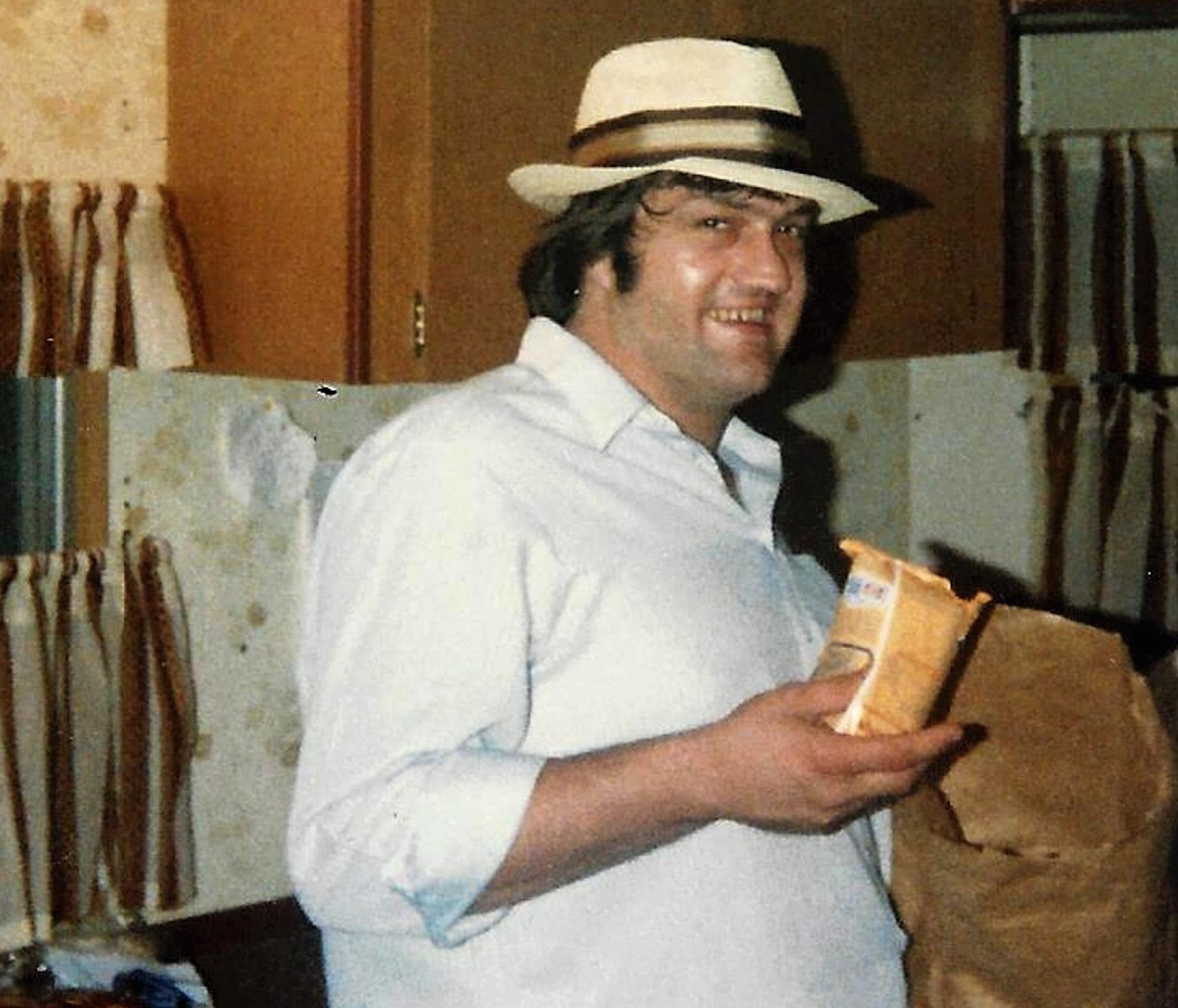
“Fat
there was a character!
Anyway, within an hour, they’d matched me up and I was back in action and playing all comers. In those days, most guys had never seen a female that could play a little so I asked for and got ridiculous weight. I made money hand over fist! When I wasn’t
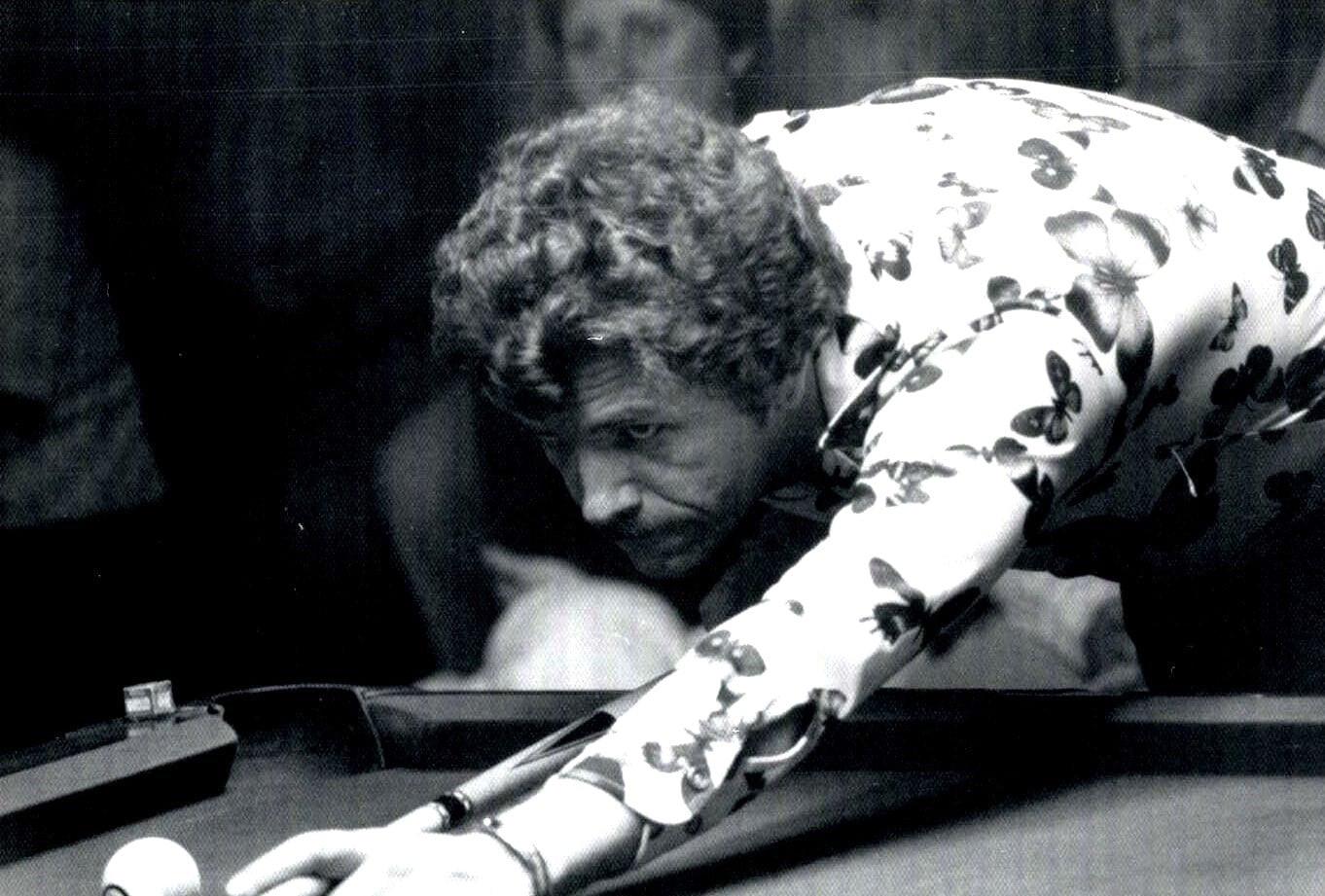
in action, I watched Tulsa’s best, Mike Betts, and Buddy practice playing $20 nine ball. I learned so much just watching them! I could count on my fingers how many balls they missed over the course of a few days!
When I first arrived in Tulsa, Randy had introduced me to a guy named Wiley Coyote. He took me all over the place – even out to the reservation in Tallequah to play a couple Indian girls! We got action everywhere and every night when we headed back to the pool room, we were winners. And, it was the first time I ever had barbeque so we ate at all the different spots that seemed to be everywhere! Lucky for me, Wiley liked it too!
One night we got back to the pool room and found the guys were waiting for us. The next thing I knew, we had all piled into Randy’s van and were heading west. As soon as we got in the van, Randy told me that we were going to watch David Matlock and Larry Hubbart play for serious money. I was really excited! One of the players that I’d heard about was
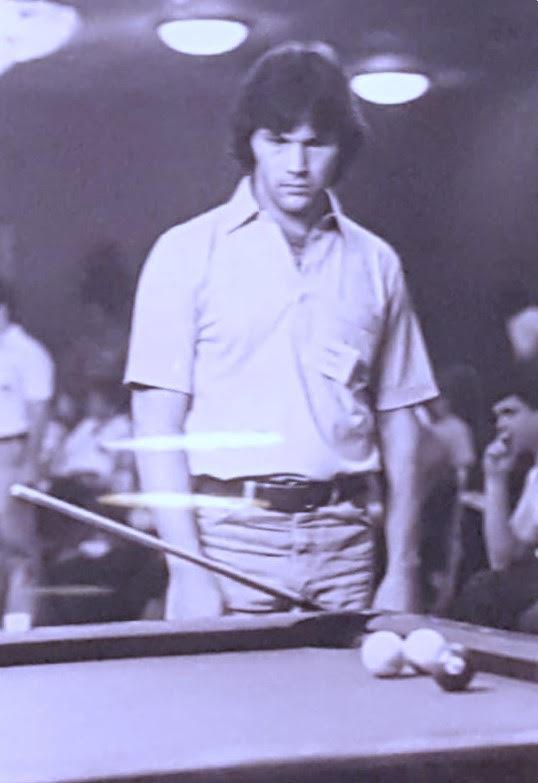
David who most considered to be the best bar table player in the country.
I knew Larry Hubbart from the World Open 14.1 Championships I’d played in back home. I knew it was going to be a great match – I couldn’t wait!
As we approached Oklahoma City, I thought we were almost there but we kept on going and now we were really out in the country! Soon, we made a turn off the main road and a mile or so later, we pulled up to a huge barn surrounded by a couple hundred cars, trucks and vans! I’d never seen anything like it!
We walked inside and right smack in the middle was a bar table surrounded by banquettes, tables and a bar! I had gotten used to being the only female in a place but not there! Most of the ladies were dressed to the nines and
dripping with diamonds and gold! The men were all dressed in fancy western wear with big belt buckles, cowboy hats and boots! This New York Yankee had never seen anything like it! I asked Buddy to get me a small bet on each game and he told me to just ask anybody – everyone was betting.
So, I found a spot in one of the banquettes and slid in. Behind me was a group of four older couples so I turned around and asked the lady behind me if she wanted to make a bet on the match.
She drawled, “Welllllllllll, little girl...how much do you want to bet?”
Red faced, I answered, “Twenty a game.”
The rest of the booth howled when they heard that but she told them to be quiet –she probably felt sorry for me and asked who I wanted to bet on. I told her Hubbart – he was down one game at that point in the match. I really didn’t know who was the favorite but I figured if he won, I could make an extra twenty! Smart thinking, huh?!!!
Anyway, I was glued to my seat as I watched the match. Seemed like most of the people there weren’t even watching the match! They were partying pretty hard and having a good ol’ time! I absolutely loved it – couldn’t take my eyes off the table except between racks to look around in awe at the crowd.
Long story short, Larry won the match and I turned around to collect my winnings. I watched as the lady reached into her purse and peeled off two bills from her thick stack of hundreds. I had never seen so much money in my life!
Even though I had only been playing for money a year or so, I had learned to give the player a gap when I won betting on the side. I walked over to Larry and waited for the crowd to thin out. Finally, I walked up, congratulated him on his win and tried to hand him the money.
Astonished, he asked me, “Mary, what on earth are you doing here out in the middle of nowhere?”
Laughing, I proudly told him I was on the road. He took both of his hands, wrapped them over mine, pushed them back at me and said with a laugh, “If you’re on the road, you’d better keep this – you’re going to need it!”
Looking around, I finally found Randy and Buddy in the group of people around David so I walked over. Even though I know he must’ve been pretty down after losing a very tough match, he smiled and was friendly when Buddy introduced me.
By now, the place was thinning out so we piled back into Randy’s van. On the way back to Tulsa, things were pretty quiet as they had all bet on David. I also heard that the match had been played for $30,000! No wonder the folks behind me had howled with laughter when I said I wanted to bet $20 per game! I found out that they had bet thousands in side bets on the match!
I didn’t dare tell the guys that I’d bet on Larry…
Known in the pool world as "Nightmare," Mary is a former world & national champion, a WPBA Hall of Famer & owned Cue-Topia in Las Vegas, NV. She has thousands of billiard-related photos in her Facebook Wall of Fame.

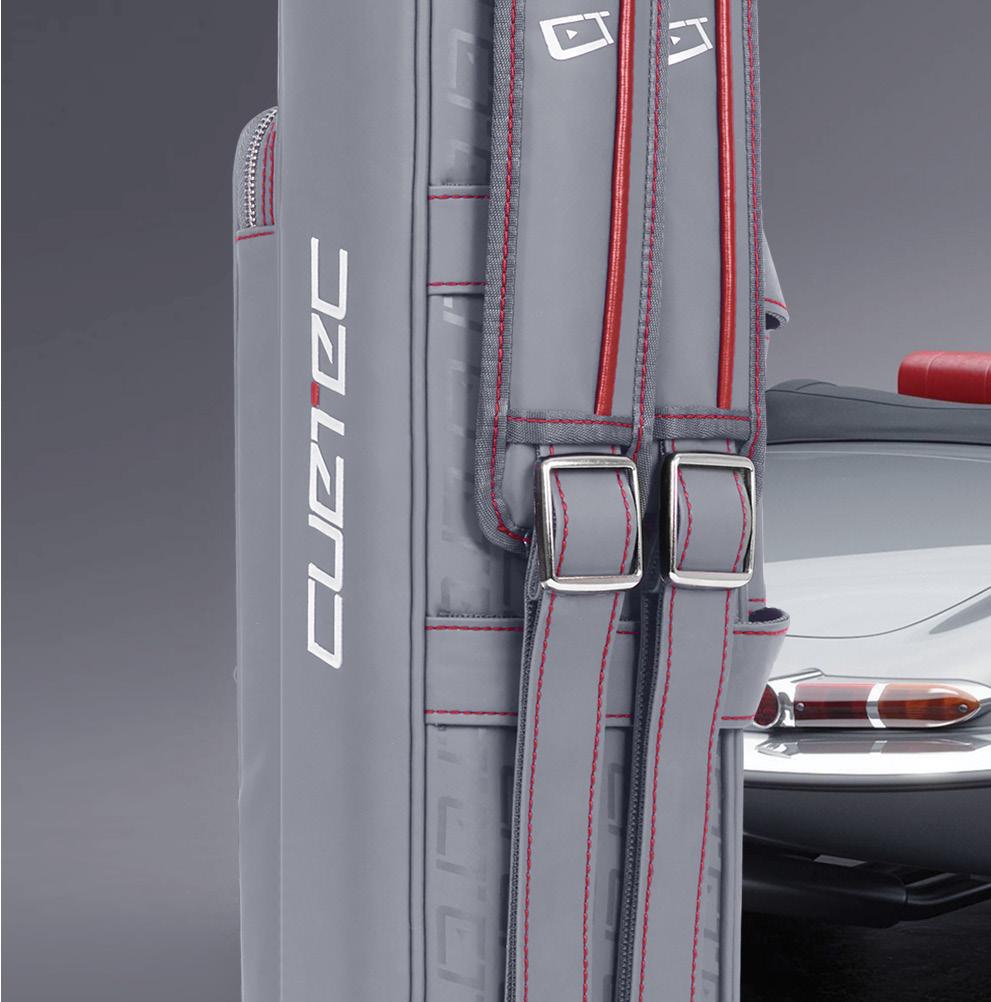


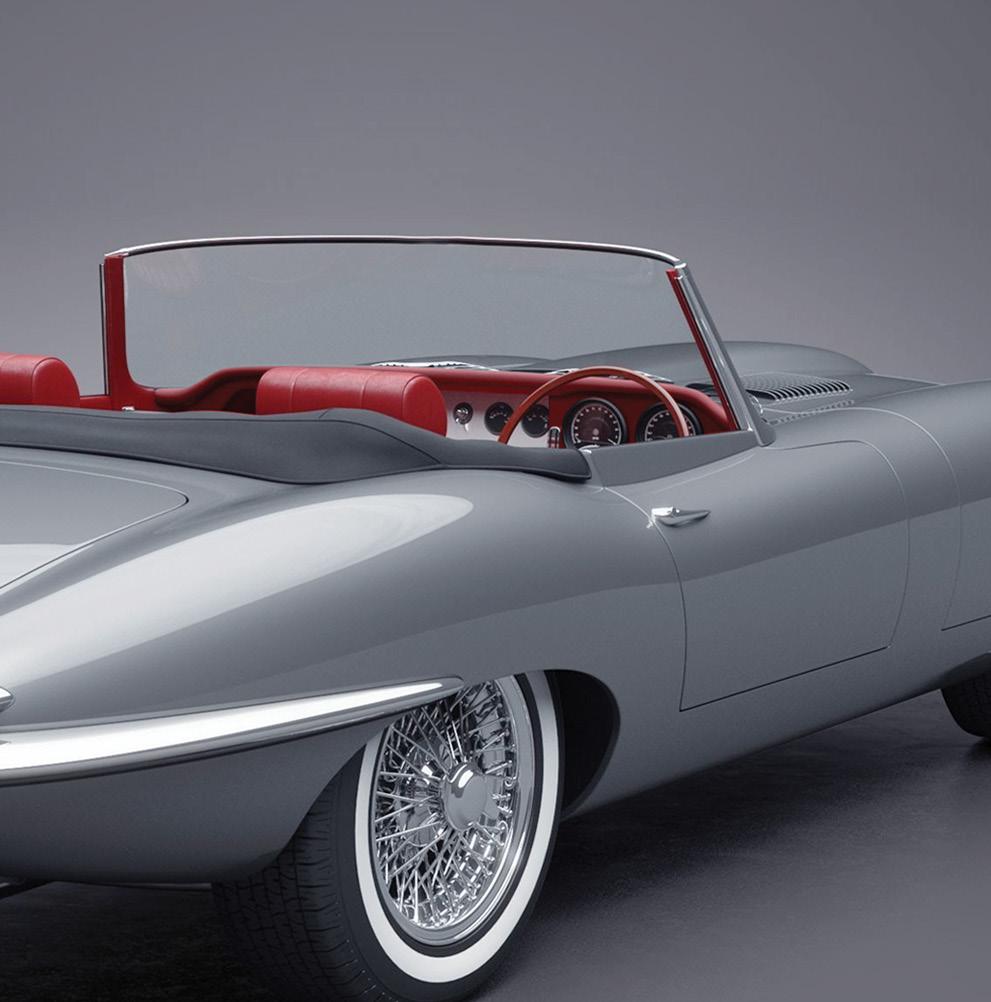




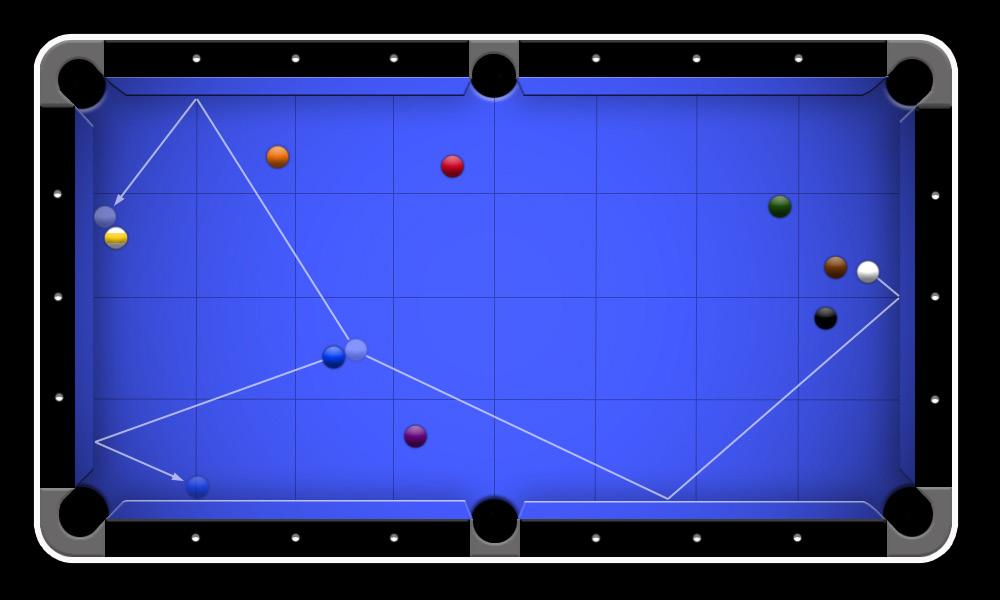
Accu-Stats Video Productions has been bringing us World Class Pool on video for the last 30 years. With this column, we hope to bring you some examples of the best shots that come up between the greatest players who play this game.
This month’s shot comes from one of our recent ‘Treasure Tuesday’ premieres on the Accu-Stats YouTube Channel.
The Magician found himself kicking at this 2-ball against Johnny Archer at the 1995 US Open 9-Ball Championship.
As seems to be the case a lot of the time, Reyes comes with another great kick shot, not only hitting the 2, but leaving Johnny hooked in return.

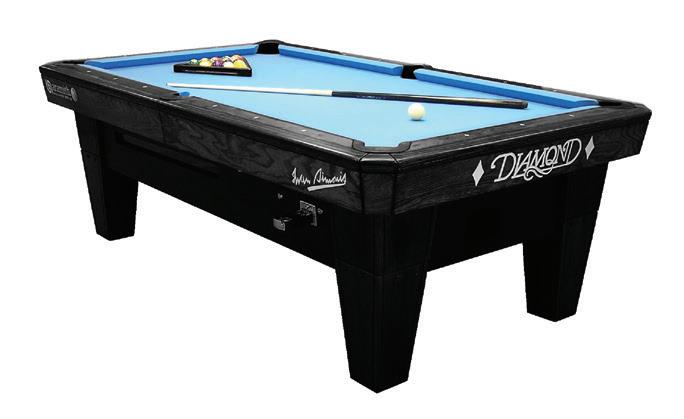
History of the Trick Shot: This shot, performed by Wayne Parker, is executed on a Chinese-style 9-foot pool table with snooker-style pockets. A similar version—known as the “Cozy Kick Shot”—is featured in the 2025 Artistic Pool Shot Program. It falls under the “Bank and Kick” discipline and carries a difficulty rating of 6 out of 10. In this variation, the natural path of the cue ball travels around the table to eventually pocket the 7-ball, which was added to increase the complexity and showcase a creative version of the original shot.
GTS Name and Meaning: The shot is titled “Little Dogs Eating Bread Crumbs”. It demonstrates the cue ball pocketing the 2-ball in the side pocket and the 7-ball in the corner pocket, as shown in the diagram. The shot draws inspiration from a biblical account in Mark 7:24–30, where a Gentile woman—facing a desperate situation—pleads with Jesus to heal her demon-possessed daughter. Jesus replies, “Let the children be filled first, for it is not good to take the children’s bread and throw it to the little dogs.” This response reflected the cultural and religious priorities of the time, where Jews had precedence. However, the woman’s humble and faith-filled reply moved Jesus to grant her request. She said, “Yes, Lord, yet even the little dogs under the table eat from the children’s crumbs.” Her persistence and recognition of Jesus’ power—despite her perceived insignificance—brought about her miracle. The message? No matter how small or overlooked you may feel, put your trust in Jesus—your miracle worker. He honors faith, not status.
Scripture Reference: Mark 7:28 (NKJV): “And she answered and said to Him, ‘Yes, Lord, yet even the little dogs under the table eat from the children’s crumbs.’”
Cue Ball: Frozen to the rail and also frozen to the 8-ball, aligned with the second diamond from the corner pocket.
Object Balls: 8-ball: Frozen to the cue ball, along the second diamond. 2-ball: Frozen to the 8-ball, but with a ball-width gap from the cushion. 7-ball: Hanging near the opposite corner pocket (see diagram).
Objective: Hit the cue ball firmly with low right-hand English, aiming approximately a
diamond and a half before the side pocket, as shown in the diagram. The cue ball will compress off the cushion, avoid the frozen 8-ball, and kick the 2-ball into the opposite side pocket. It will then rebound off the rail, travel around the table, and ultimately pocket the 7-ball in the corner.
Special Notes: If the cue ball misses the 7-ball short, try adding more right-hand English to widen the angle. If it misses too long, reduce the right-hand spin and use more draw (backspin). If the 2-ball misses to the left of the side pocket, aim the cue ball slightly left of the
cushion. If the 2-ball misses to the right, aim slightly right of the cushion.
Crowd Reactions: This shot may require practice, as results vary depending on the table— especially whether the rails play “long” or “short.” Once you find the right aim and power, the cue ball will travel slowly enough to build suspense, leading to a dramatic finish as the 7-ball drops. The crowd often responds with cheers and applause as the shot concludes. If either ball is missed, smile and remind the audience that the Gentile woman persisted in her request—and so will you. Then line it up again and give it another go!
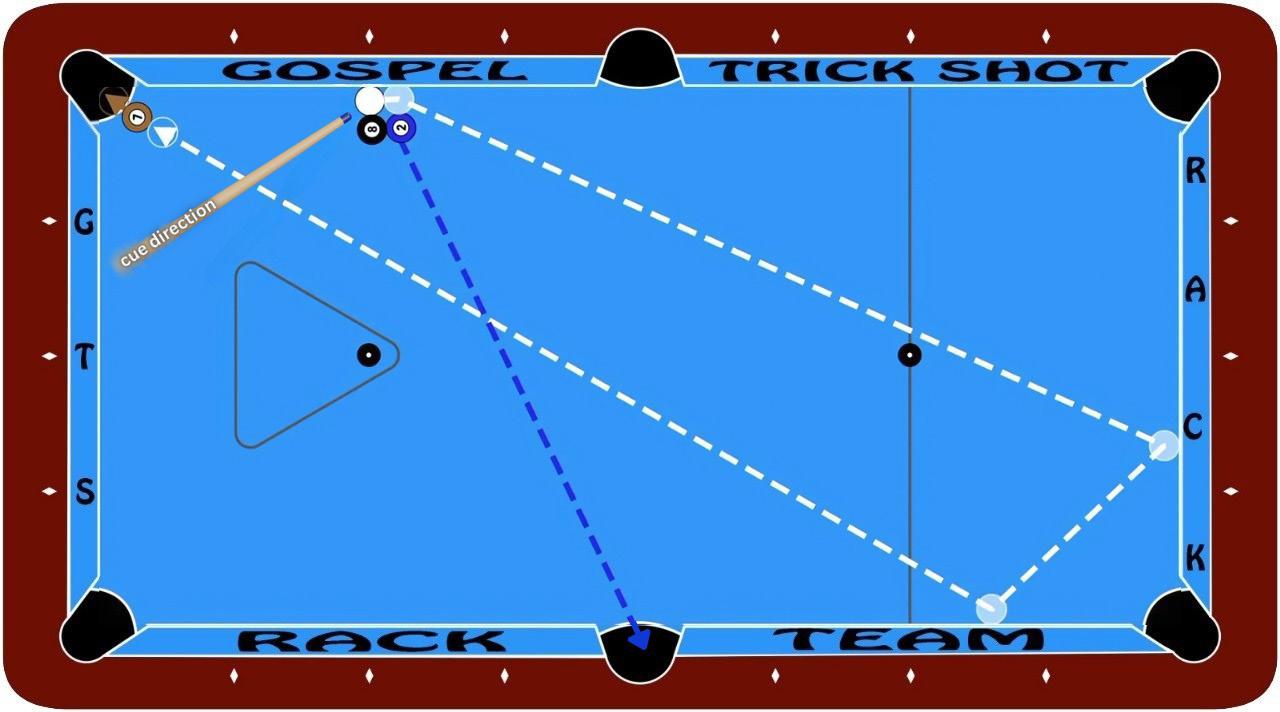

All photos courtesy Matchroom Multi Sport
While the majority of conversations leading into the 2025 World Pool Championship were focused on the idea of Fedor Gorst defending his title from 2024, it was Carlo Biado who pocketed the final 9-ball after six days of grueling play, and twenty eight racks of even more grueling play in the finals, as the World Nineball Tour returned to Saudi Arabia for the biggest event on the WNT schedule.
Day one saw Gorst get off to a slow start, but that didn’t last long. Gorst trailed his first round opponent, America’s Sam Henderson, 0-2 early in the match, but any rust that Gorst might have was quickly shaken off as he took control of the match and cruised to a 9-3 win.
“I was nervous — it’s been a while since I’ve played a Major. It’s tough; this is the biggest tournament of the year, and the first round is always nerve-racking,” said Gorst after the match.
While an opening round loss from Gorst would have stunned the pool world, instead, it was another tournament favorite, Shane Van Boening, who would stumble in the first round of play. Van Boening found himself in a battle with Vietnamese pro Luong Duc Thien. SVB also got off to a slow start, trailing the match 0-3 early, but he would come back to tie things at 3-3 and take his first lead at 4-3. Van Boening led by as many as two racks and reached the hill first at 8-7, but a failed safety in the case game led to an early 9-ball, and Thien was moving on into the next round undefeated.
Van Boening was brutally honest about his first round performance, “What can I say — I lost. It's as simple
as that. But I'm back tomor row, and I'm hoping to dig deep, survive the next stage, and come out with a win.”
Day two included more firstround action between the 256 competi tors with dreams of add ing this title to their resumes. Fil ipino champion Johann Chua was hoping to continue riding the mo mentum from his win the previous week at the Knight Shot 9-Ball Open, and his hopes looked good with his day two 9-0 whitewash of Mohamed Al-Balkhi.
Chua seemed to be more focused on what the win would mean for his home country after his match com pleted than anything else: “It would mean a lot to us. It would be a re minder that the Philippines is still one of the strongest nations in pool. As we all know, the greatest player of all time — Efren 'Bata' Reyes — comes from our country. So for a Filipino to win this tournament, it would be a
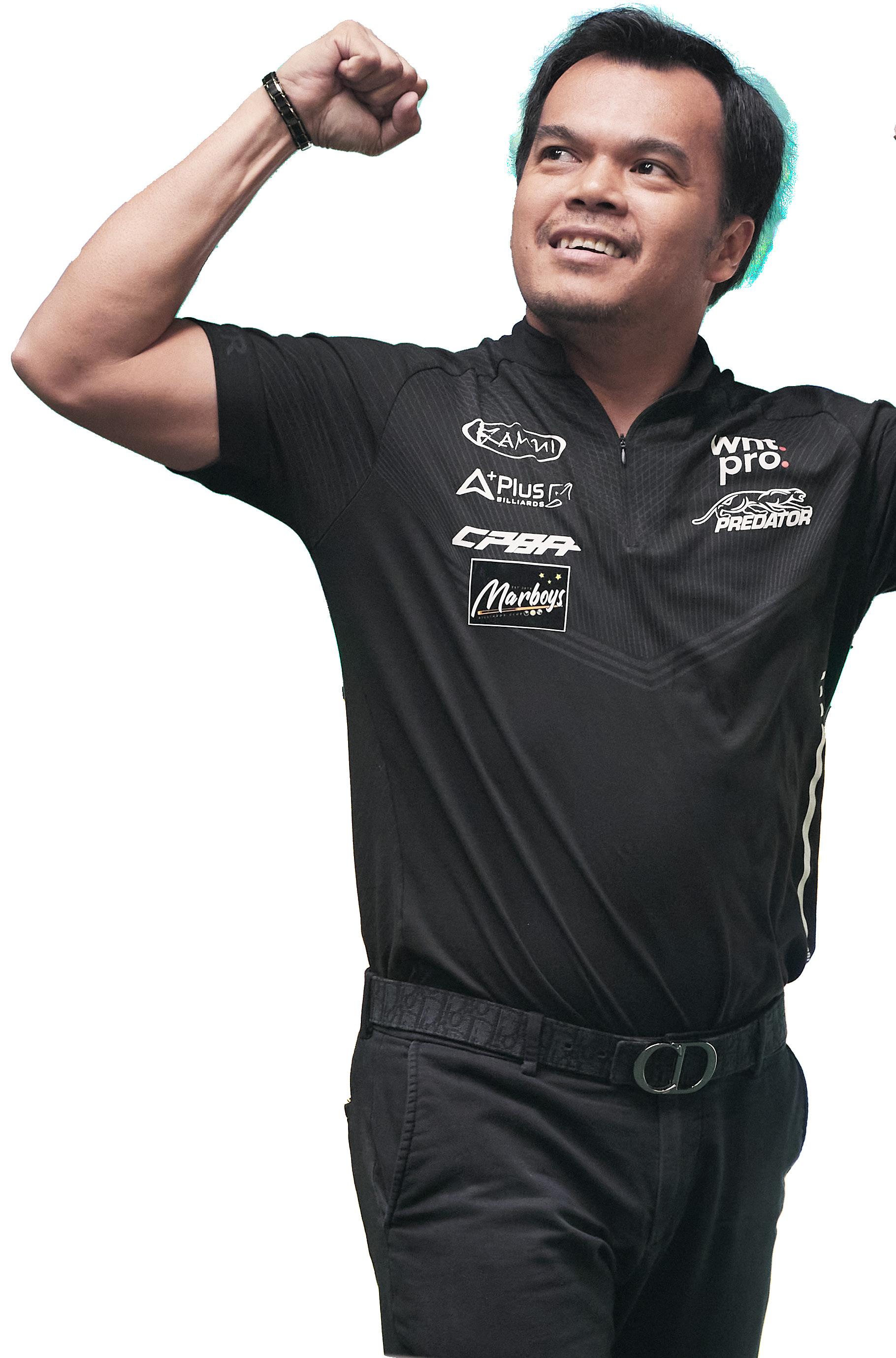


proud moment and a way to put the Philippines back on the map.”
Another player making noise on day two was Korean star Seo Seoa, the event’s only female competitor. Seoa had lost to Daniel Maciol on day one, but bounced back with a 9-3 win over Russian JJ Faul.
“I'm proud of the win - I’m the only woman in the tournament, but I’m here to enjoy the experience and show what I can do,” said the WPBA
If the lopsided win over Faul wasn’t enough to prove that Seoa was ready for her moment in front of the camera, her day three win over two-time World Champion Albin Ouschan solidified for the fans following the event. This win would move Seoa into the final sixty-four player single elimination stage of the event.
“I just enjoy my game so I’m not nervous and I feel my confidence is
good...My goal is to break the record of the first woman player to reach the Last 32 stage. I’m now only one step away” said Seoa.
Day four saw the field whittled down to sixteen players with Gorst advancing after wins over Spain’s Jonas Souto and Austrian Max Lechner.
“I made some really tough shots and felt in full control throughout. The break is finally starting to come together, and my safety play is sharper. I’m building confidence match by match—I’m ready for what’s next,” Gorst reflected after the match.
While Chua’s tournament came to an end on day four, after a loss to countryman Anton Raga, he was still supportive of the seven Filipino players who qualified for the final sixteen.
“To have so many Filipinos alongside me means so much. I believe one of us can win this for the country. Even if it’s not me, I’ll be proud to see a Filipino champion,” commented Chua.
Day five was when player’s dreams of winning this title started looking real, as the field was cut down to just four players.
Gorst eliminated Mario He and Jefrey Roda to make the final four. “I found a strong rhythm and controlled the pace well. My break got better in the second match, and I stayed focused even when I started feeling fatigued.


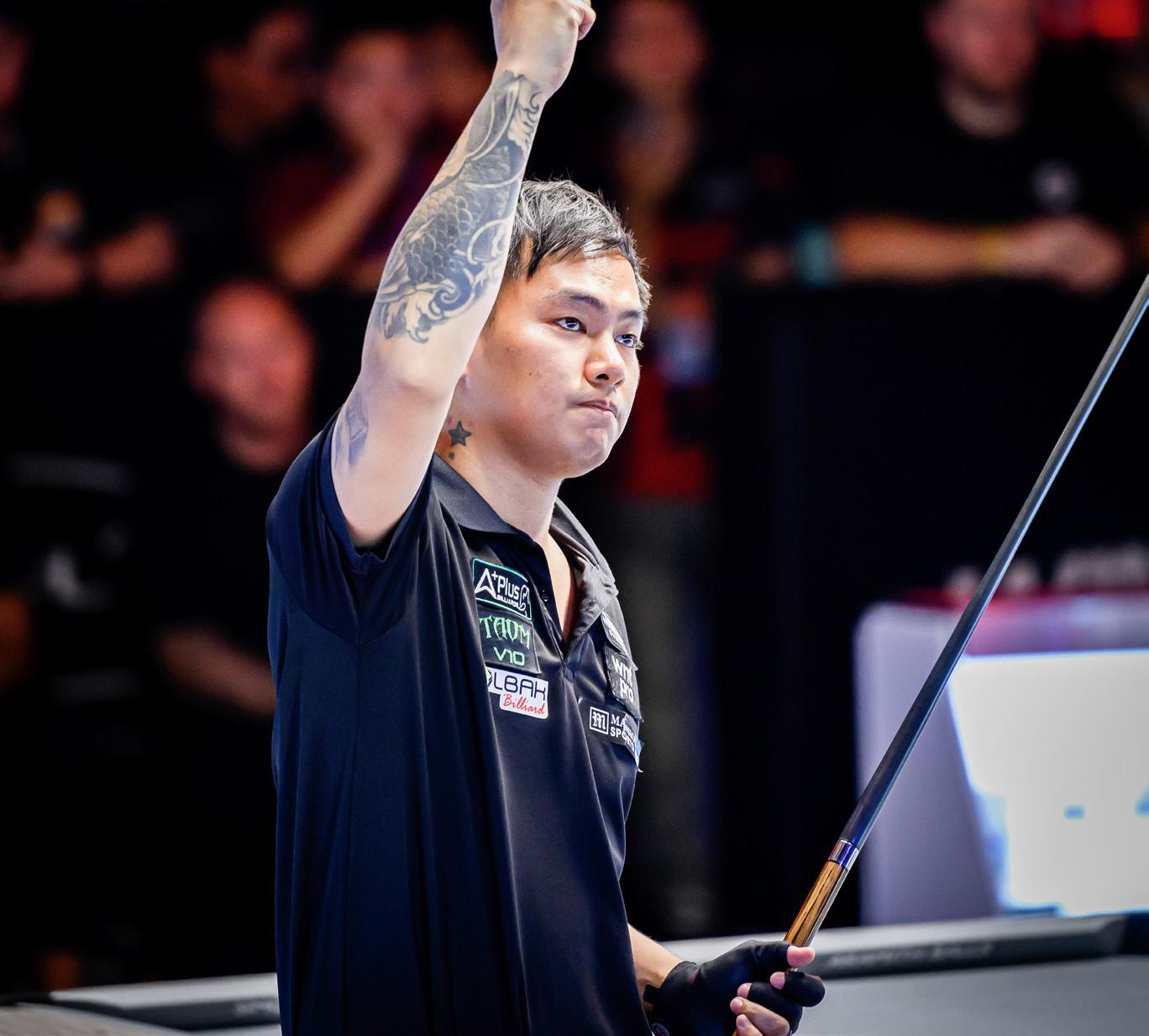
Reaching the semi-finals for the third time feels really rewarding—like the hard work is continuing to pay off.”
For the fans, seeing the name Kaci in the final four of any major event is no surprise, but this time it was Eklent’s younger brother Kledio who was in the final four. “It feels unbelievable to be in the semi-finals. There was so much pressure in the match against Ameer—every rack felt huge. I just tried to stay present, trust myself, and now I’m going to give everything tomorrow. I want to make my family proud” he said.
Filling out the final four were two Filipinos, Biado and youngster Bernie Regalario. Biado commented after his 11-7 win over Ko Ping Chung in the quarter finals, “Ko Ping Chung isn’t just one of the best in Asia—he’s one of the best in the world. I made some mistakes early on, but I stayed patient and managed to turn the match in my favour. Reaching the semi-finals again is a huge step for me.”
“Bernie is young, but he can beat anybody. He’s a real fighter—one of the best young players in the Philippines. If he beats me tomorrow, I’ll be rooting for him in the final” he added.
On the final day of the event, Biado made quick work of Regalario 11-3. “Of course, I feel the pressure today, but I’m proud of myself. I’ve come a long way in this tournament, and just reaching the final is already something to make me and my family proud. That’s what matters most.”
The quarterfinal win was a little tighter for Gorst, but he still got by Kaci 11-7. “I’m feeling great—but also relieved. That match against Kledio was tough. He’s a difficult opponent—his shot-making was sharp, his break was solid, and he barely missed._ _I expect it to be a great final. It’s going to be a grind—it’s a long race to 15. But I’m ready for it. Whoever wins will have earned it.”
The extended race to fifteen final match between Gorst and Biado should go down in pool history as one of the best matches there is. It had everything that someone could want from a battle between these two champions.
Gorst held an early lead at 2-0, but Biado won the next nine straight racks for what looked to be an insurmount-

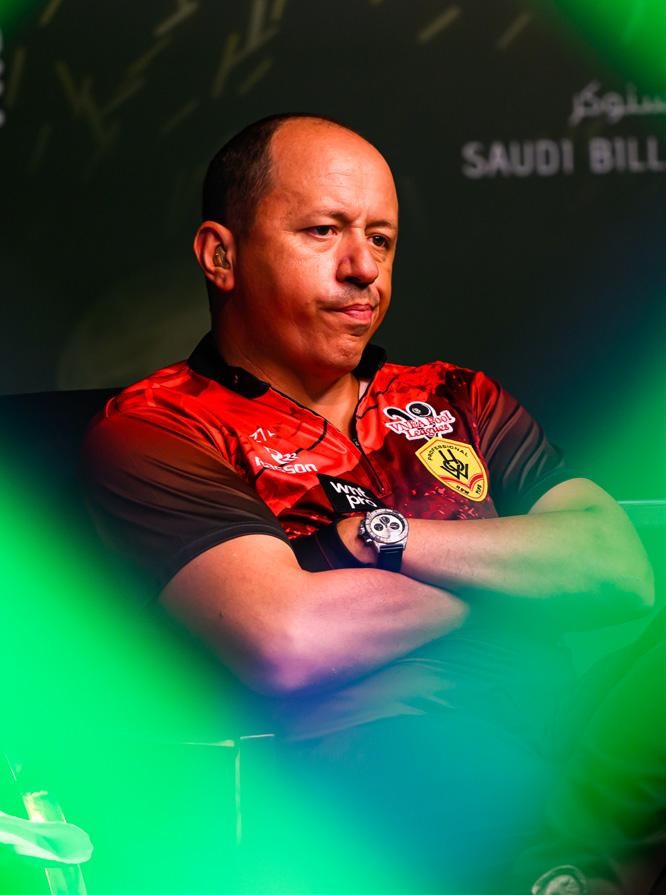
able 9-2 lead. Gorst has the heart of a champion though, and dug down to gut out the next seven racks to knot things again at 9-9.
By this time, the confident Biado who was there at 9-2 up was looking pretty rough, and the rough looking Gorst was now looking pretty confident. Biado commented after the match about his mindset as he watched Gorst win those seven racks, “It’s one of the toughest parts of nine-ball. You can’t do anything but sit and wait. I just kept breathing, kept trusting that I’d get another chance. Fedor is a monster—once he gets going, it’s hard to stop him. But I told myself, “Stay ready. Stay focused.” And when my chance came, I was locked in.”
The nineteenth rack saw Gorst’s trusty jump cue abandon him when his jump on the three ball scratched, leading to a Biado 10-9 lead. In the following rack, Biado again played safe to leave Gorst a jump shot and again that jump shot led to an open tale for Biado and he was looking more confident again at 11-9 ahead. As if Biado was detecting blood in the water, he again played Gorst safe in the twenty first rack, leaving Gorst a jump shot and ended up with an open table to run out for 12-9. The jump cue led to
the conclusion of another game in rack twenty two when Carlo showed his own prowess and jumped to make a two ball and ran out for a 13-9 lead.
A scratch on the break in rack twenty three by Biado had the feeling of being Gorst’s last realistic chance to regain control of the match and he did not waste the opportunity. He ran that rack to get back within three and then made a highlight reel carom on the 9-ball in the next rack for a 13-11 scoreline. Gorst built on that and won the next two racks to tie things at 1313.
Gorst’s break in the next rack might haunt him for a while as he broke dry, leaving a 1-6 carom for Biado. Biado made the carom and ran a fairly routine rack to take the hill at 14-13. While there was a little drama in the following rack when a 3-4 combo looked a little tricky, Biado navigated it with ease and it was all downhill from there. He ran out the rack for the biggest win of his career, so far.
Biado sounded a little like his long time countryman Efren Reyes when he was interviewed after the match, “This final is something I’ll remember forever. Fedor is one of the best in the world—when I was leading 9-2, I still couldn’t relax because he’s a monster on the table. But today, I stayed fo cused, stayed calm, and maybe had a little luck on my side too.”
When asked about how this win might cement Biado’s place in the game (in the same year that he became eligible for the BCA Hall of Fame), Biado said “It’s hard to say that myself, but yes—I think winning three World Championships puts my name among the greats. I’ve worked so hard for this, and to achieve it in this generation, with the level of competition we have today, it feels special. I just hope this
inspires more Filipinos to believe they can reach the top too.”
While it will just be Biado cashing the check for $250,000 after the win (14 millions pesos back home), he said it was not only the entire Marboys Billiards team but all of his Filipino fans who celebrated this win with him. “This is huge—not just for me, but for our whole team. The Marboys family has supported me from the start. We all train together, fight together. This title is for every Filipino who loves pool, for the new generation watching, and for everyone back home cheering in every barangay, every town. It’s a win for all of us.
It gives me strength. Hearing “Pilipinas!” from the stands, it pushes me to dig deeper, especially in those tough racks. Of course, there's pressure— but I turn it into energy. I always remind myself: I’m not alone out there. I’m playing for millions of people back
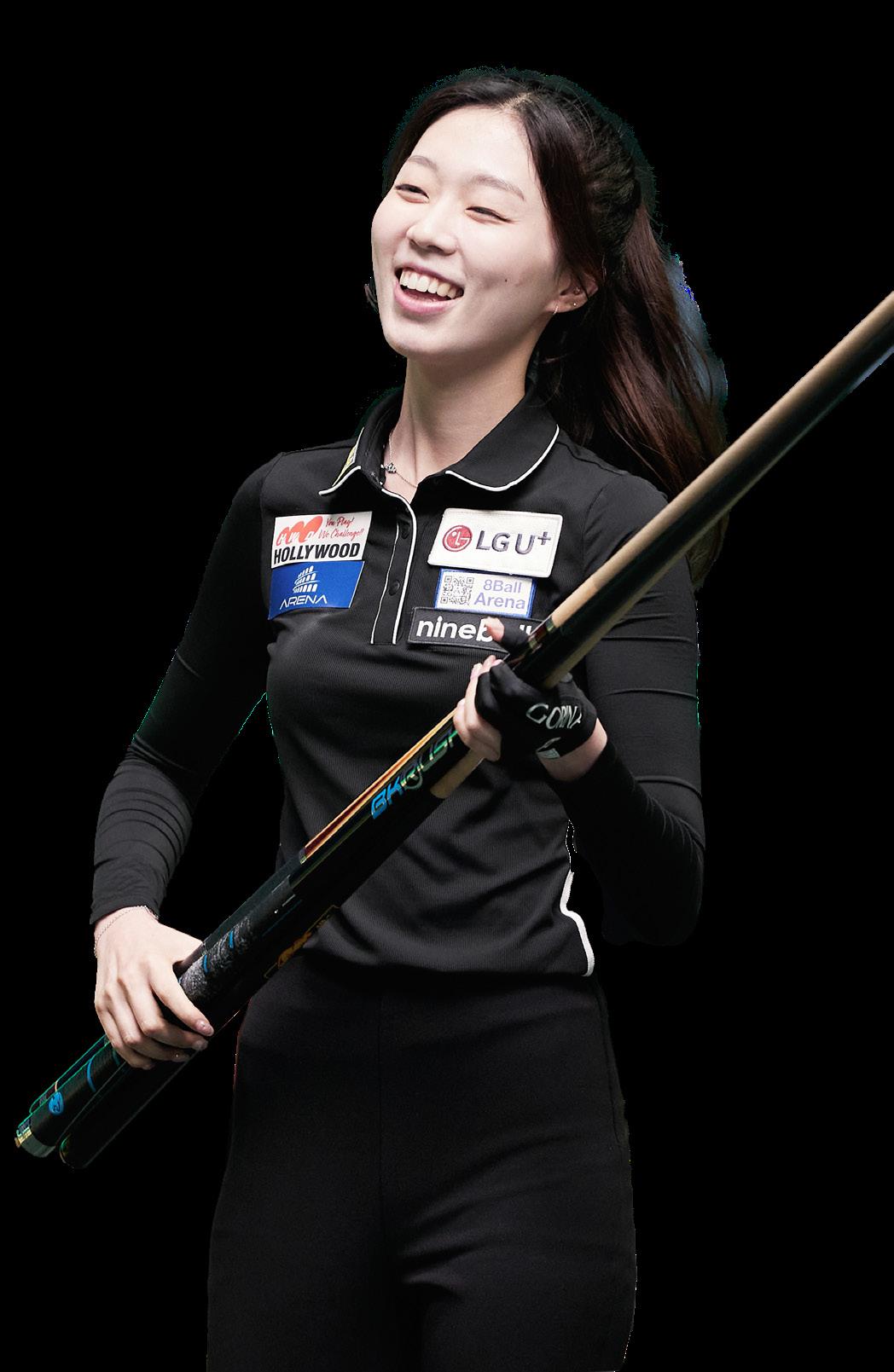
Story by Skip Maloney - AzB Staff / Photos courtesy Erwin Dionisio
Ouschan goes undefeated to claim first-ever WPA Women’s 8-Ball world title
It was kind of a big deal. Or, as WPBA Tour Director Jerry Stuckart put it “a very, very big deal.” It wasn’t just that the WPBA ran a women’s event at the Oneida Hotel Casino in Green Bay, WI last month (July 1-6). The WPBA does that sort of thing all the time, but this one was the first-ever World Pool Association (WPA) Women’s 8-Ball World Championships. And the significance of it was punctuated by Opening Ceremonies at Lambeau Field, home of the legendary Green Bay Packers. There have only been three, all-time WPA 9-Ball Championships here in the US and the last one was in Chicago in 1997. As far as we know,
there have been no 8-ball championships here, and there hasn’t been a WPA 14:1 World Championship since the four that were held in New Brunswick, NJ from’06 to ’10 (no event in ‘09’ for some reason).
In addition to all the “very, very big deal” tournament and opening-ceremony news, one of the tournament sponsors, Olhausen Billiard Manufacturing Company, which has been crafting pool tables since 1972, is using the occasion to introduce a new table design, crafted specifically for this event. Though full tech specifications have not been released to the public yet, it’s been reported that the
tournament specifications have been “tailored for 8-ball precision.”
“To host the first-ever Women’s 8-Ball World Championship right here in Green Bay—home of the Packers, cheese curds, and now world-class pool—is something truly special,” said Stuckart, a native of Green Bay (in case the Packers and cheese curds didn’t give that away). “We’re putting Wisconsin on the global map for billiards, and this event isn’t just big for the sport—it’s history in the making. The best women players on the planet (came) here to compete, and I can’t wait for the world to see what we’ve built.”
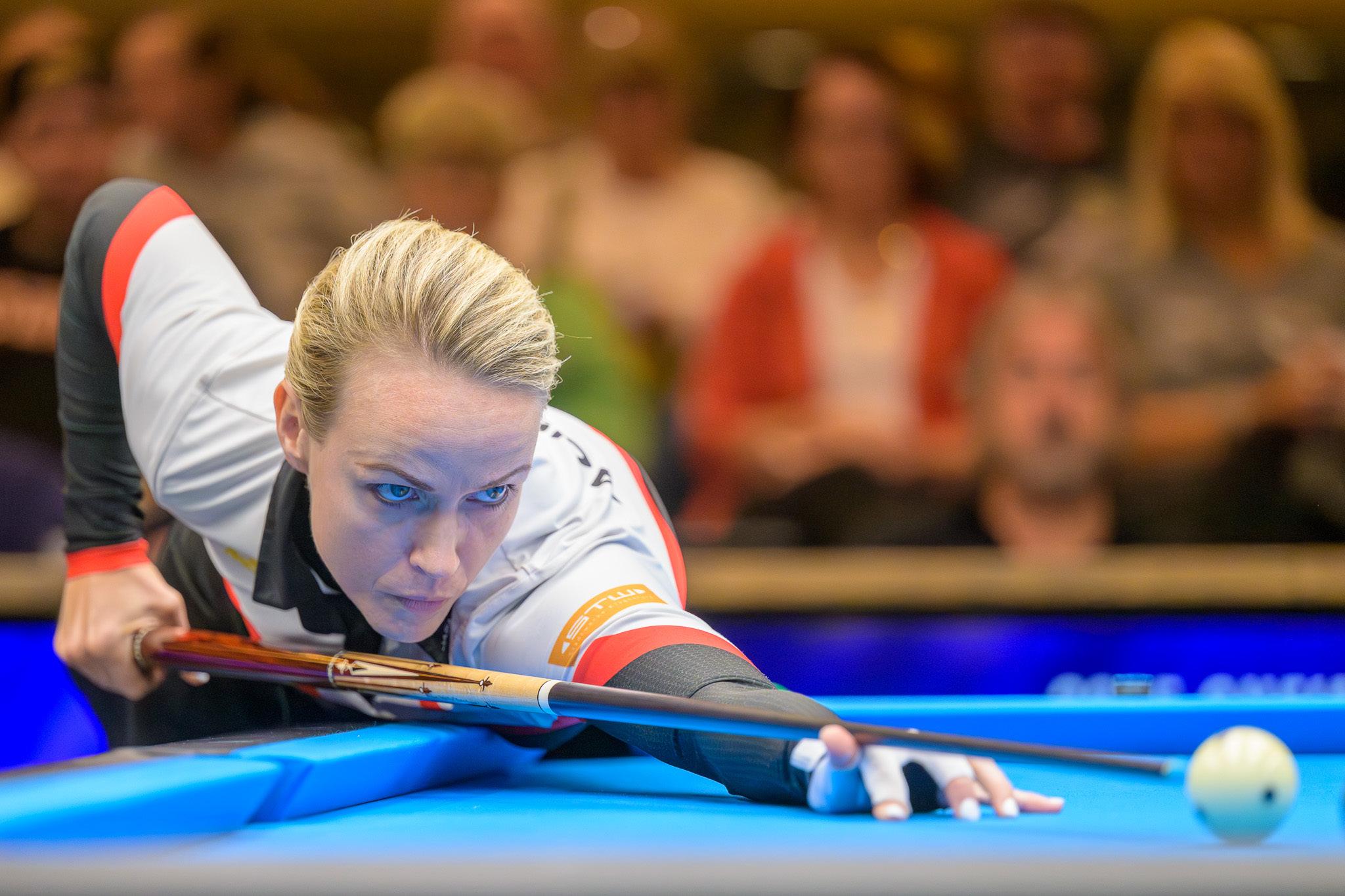
Among the ‘best women pool players on the planet’ to which he referred were eight of the WPA’s top-ranked women and nine of the WPBA’s topranked competitors. Some of them were on both lists. Eight of the WPAranked top competitors successfully navigated the waters of Day One’s Round One. All nine of the WPBA competitors did so, as well.
The event had a little bit of everything you could ask for in a 64-entrant, twostage, professional pool tournament; exciting matches from start to finish across a wide spectrum of competitive talent, a nail-biting, double-hill final, and a “Cinderella” story. That story, with 14-year-old Jordan Helfery playing the ‘role,’ didn’t have a traditional happy ending, though it certainly placed Helfery on the list of up and coming junior competitors that both junior colleagues and veteran competitors will certainly be on the lookout for, as her personal ‘Cinderella’ saga continues.
The undefeated winner of this first-ever event was Austria’s Jasmin Ouschan, who didn’t enter the tournament as its most-likely-to-succeed candidate; the ‘favorite.’ She’s been a world-class champion since, at the
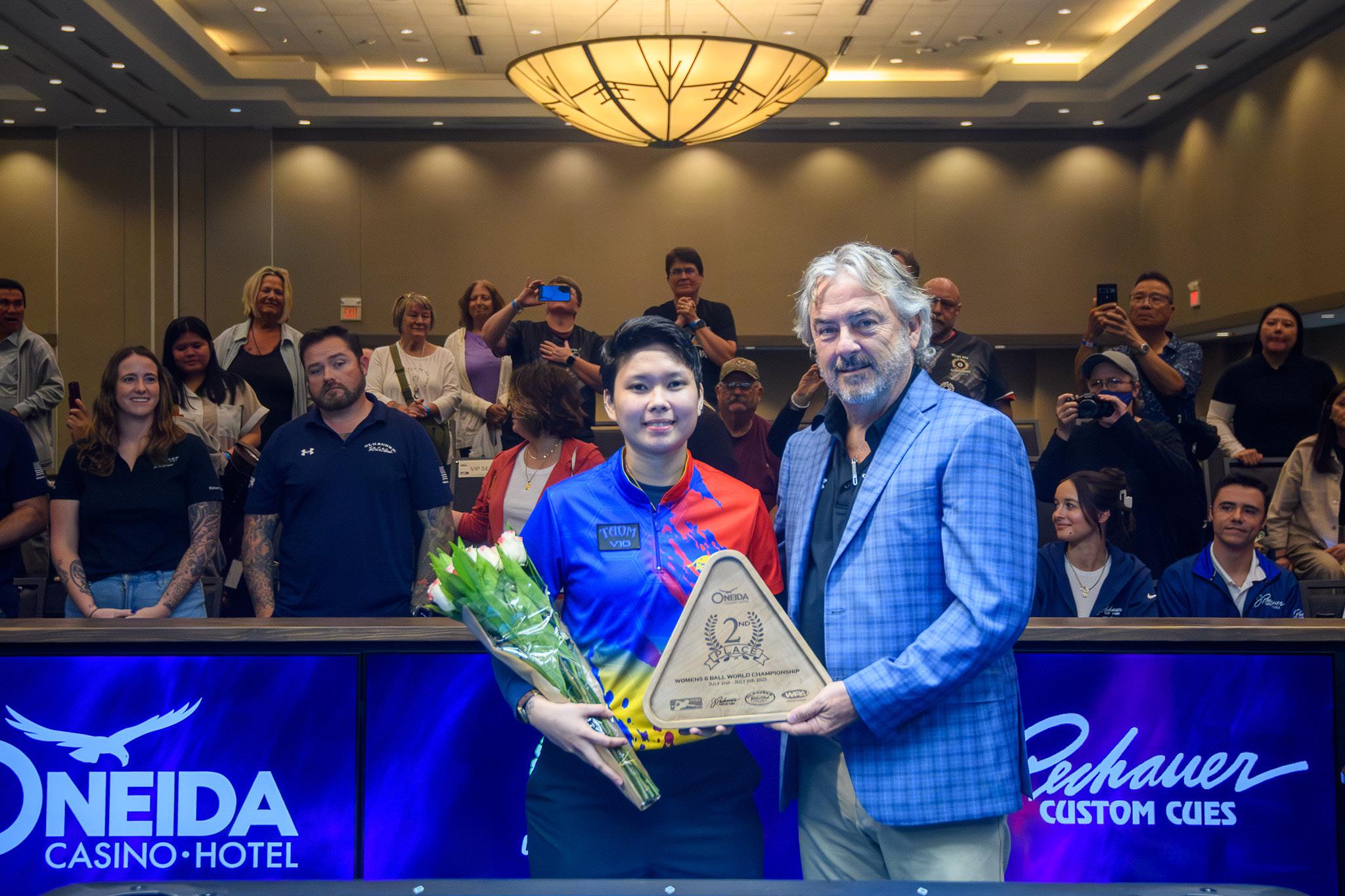
age of 16, she recorded her first event victory with us here at AZBilliards, going undefeated at the WPBA’s Amateur National Championships in 2002, and was certainly considered among those ‘favored’ to win because of her international reputation. The event, however, featured a lot of women with international reputations, including the still-current, top-ranked WPBA and WPA competitor, Kristina Tkach and quite a few of the 17 women ahead of Ouschan in the WPBA rankings. Runner-up Chezka Centeno, from the Phil-

ippines, entered the tournament at #9 on the women’s WPA ranking list, but had yet to appear on the WPBA ranking lists. Ouschan and Centeno came into the tournament as two of the top five FargoRated competitors. Centeno (778) was at the top of that list, followed by Taipei’s Chieh-Yu Chou (770), Kelly Fisher (761), Japan’s Seo Seoa (755) and Ouschan (753).
The two of them would have made a good, parimutuel Exacta bet; top two finishers in exact order. Given the ‘field,’ in general, Ouschan and Centeno would probably have garnered long, though not exceedingly-long odds to be the event’s winner and runner-up. Conservative speculation, based on Past Performances (rankings, etc.) and a hypothetical field of 1,000 interested spectators (who’d looked up such information) might have put Tkach and Taipei’s Tzu-Chien Wei at the top of the list with 4-1 and 5-1 odds, respectively. Ouschan would have begun the tournament with 6-1 odds (3rd pick) and Centeno (unranked in the WPBA) would have started as the 5th pick with odds of 10-1.
In any event, any spectators with a vested interest in the outcome would have been biting their nails until the
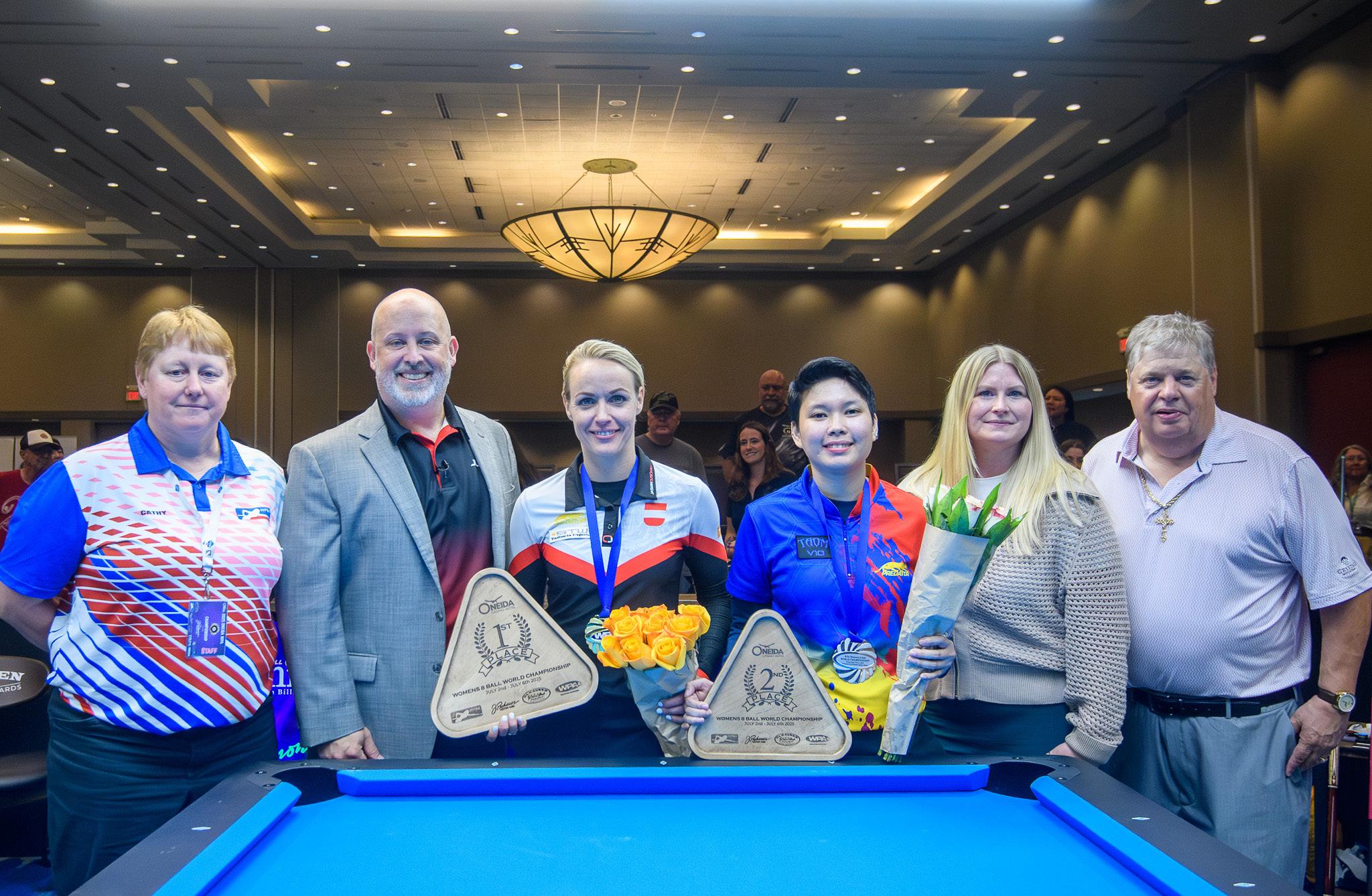
very last minute of this first-ever WPA/ WPBA Women’s World Championship, which, in many ways, called attention to some substantive differences between the games of 8-Ball and 9-Ball. Differences which played out in the final match.
In some respects, the games are more or less the same; line up a shot, make the shot and leave the cue ball in place, at minimum, for your next shot. The game of 8-ball differs from its 9-ball counterpart by the number of strategic decisions you are capable of making when you step up to the table. When you do so after the break in a game of 9-ball, you have one ball to shoot at, with the most immediate strategic decision you have to make entails understanding how you want the cue ball to move in the direction of your next ball. In 8-ball, after the break, there are likely to be a number of balls to shoot at, each of which offers a different strategic road to the finish of a game, with patterns that differ depending on which decision you make. Most, though not all, unforced errors in either game emerge from tactical, rather than strategic decisions.
A tactical, unforced error by the Philippines’ Chezka Centeno during the 14th
game of the first WPA’s Womens World Championships, didn’t cost Centeno the title, at the time, but it did put her opponent, Austria’s Jasmin Ouschan on the hill at 8-6, instead of knotting the score at 7-7. Critical juncture, which put Ouschan in the proverbial ‘drivers seat’ and gave her enough of a lead to withstand what happened next.
First things first. Ouschan and Centeno came into the finals having successfully navigated their way through five opponents; three on the winners’
side of the double-elimination Stage 1, and two in single elimination. In races to 7, Ouschan had defeated Briana Miller (2), Rachel Lang (0) and Norway’s Nina Torvund (5) to qualify for single-elimination. Centeno defeated Joann Mason Parker (1), April Larson (3) and Slovenia’s Ana Gradisnik (0) to qualify.
The ‘Cinderella’ story, starring Jordan Helfery, got started in Stage 1. She defeated Canada’s Veronique Menard 7-3 and sent Australia’s Meng-Hsia (‘Bean’) Hung 7-5. She was a single win away from qualifying for single elimination from the winners’ side. She was defeated by Taipei’s Chieh-Yu Chou 7-1. The ‘story’ continued because she only needed to win a single, loss-side match to qualify for the Final 16 of single elimination. Unfortunately, on the loss side, she ran into Tapei’s Tzu-Chien Wei, who had just eliminated another junior competitor, Savannah Easton 7-4. Tzu-Chien ended the ‘story’ with a 7-1 victory over ‘Cinderella’ and advanced to single-elimination.
In the single-elimination Stage 2, Ouschan battled her way into the final with victories over Japan’s Samia Konishi 8-2 and Bulgaria’s Kristina
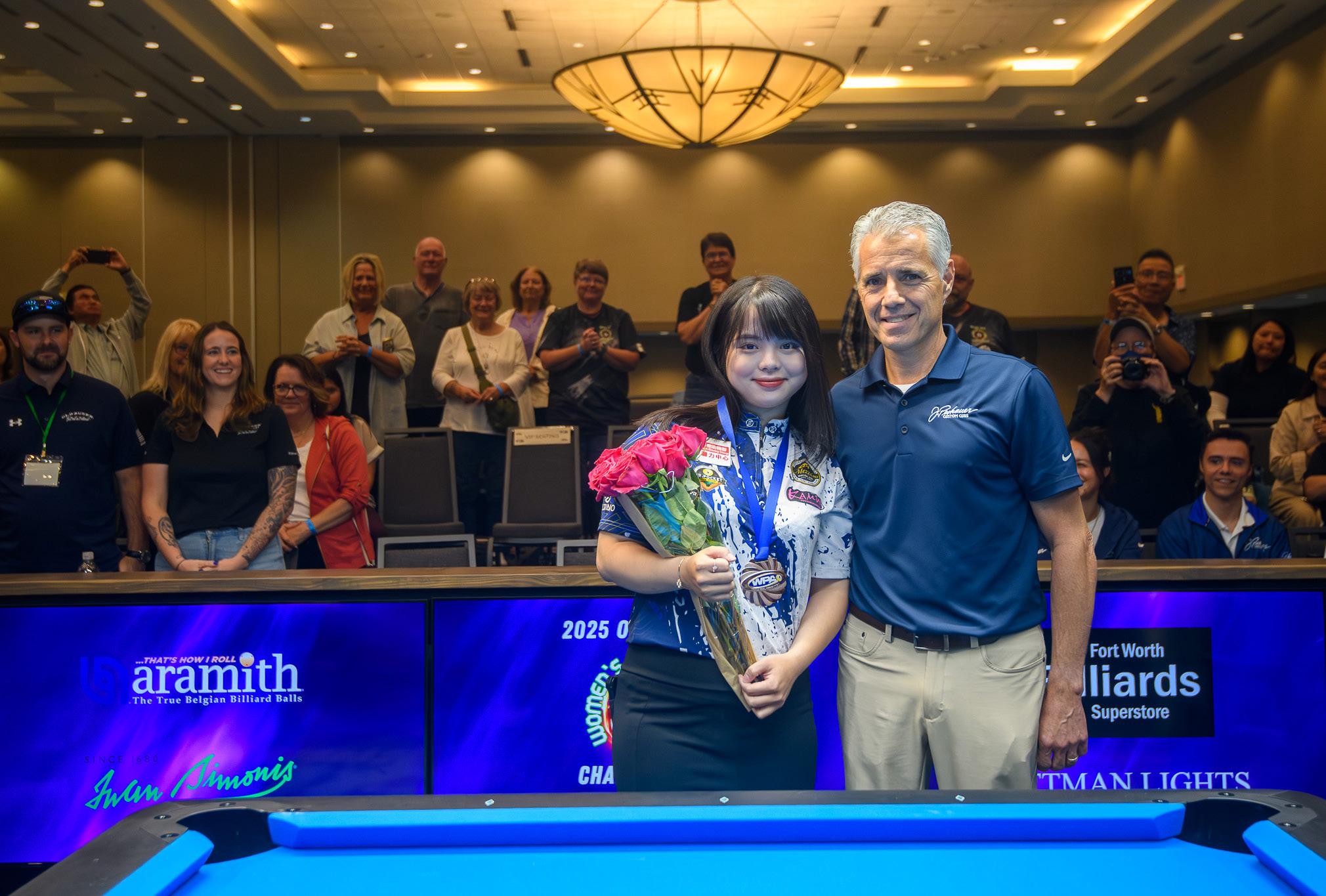


« When I play all the big tournaments around the world, we only use Aramith and Simonis. You know you get 100% high quality. It just makes the game easier to play. »
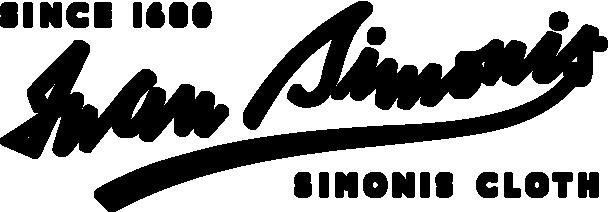


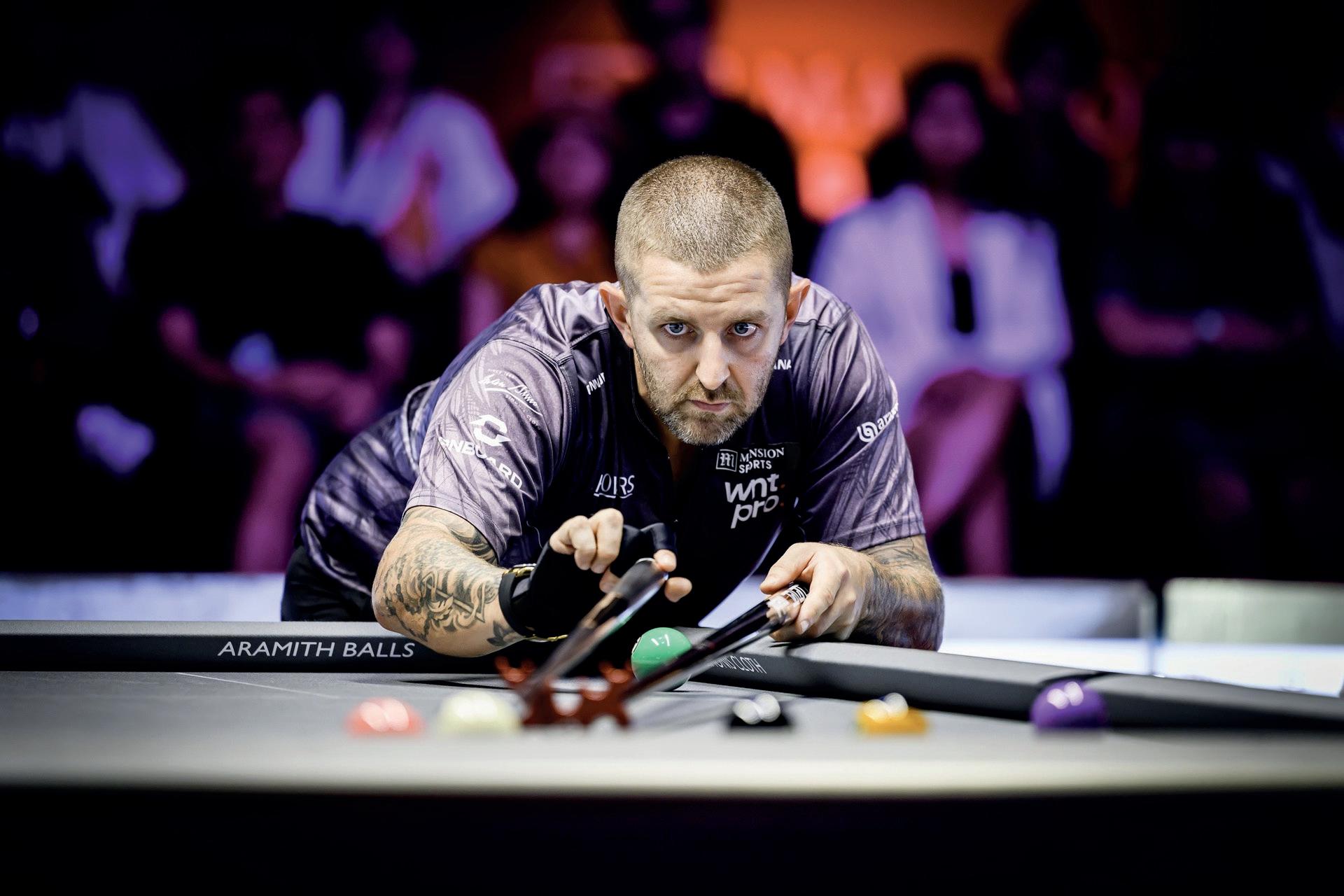









Zlateva 8-3 to draw and then defeat Taipei’s Chia-Hua Chen 8-4 in the event semifinals. Centeno followed single-elimination victories over Chihiro Kawahara 8-4 and survived a double-hill battle against Tzu-Chien Wei to meet and defeat Margarita Fefilova 8-6 in their semifinal.
Overall, the final match had certain distinctive characteristics. Only Ouschan was able during the 17 games to drop more than a single ball (two) on the break. There were five dry breaks, three of them by Ouschan, including a critical one, the 15th, which Centeno used to her advantage to draw within one of the lead at 8-7. There were eight ‘break and run’s, five of them by Ouschan, including the one that earned her the championship title. Centeno’s third proved to be her last. There were four ties, two of which occurred in the first four games (1-1 and 2-2). The last two occurred in the final five games, to include the one that put the match into its double-hill gear.
Ouschan got started with a ‘break and run’, at which point they both seemed
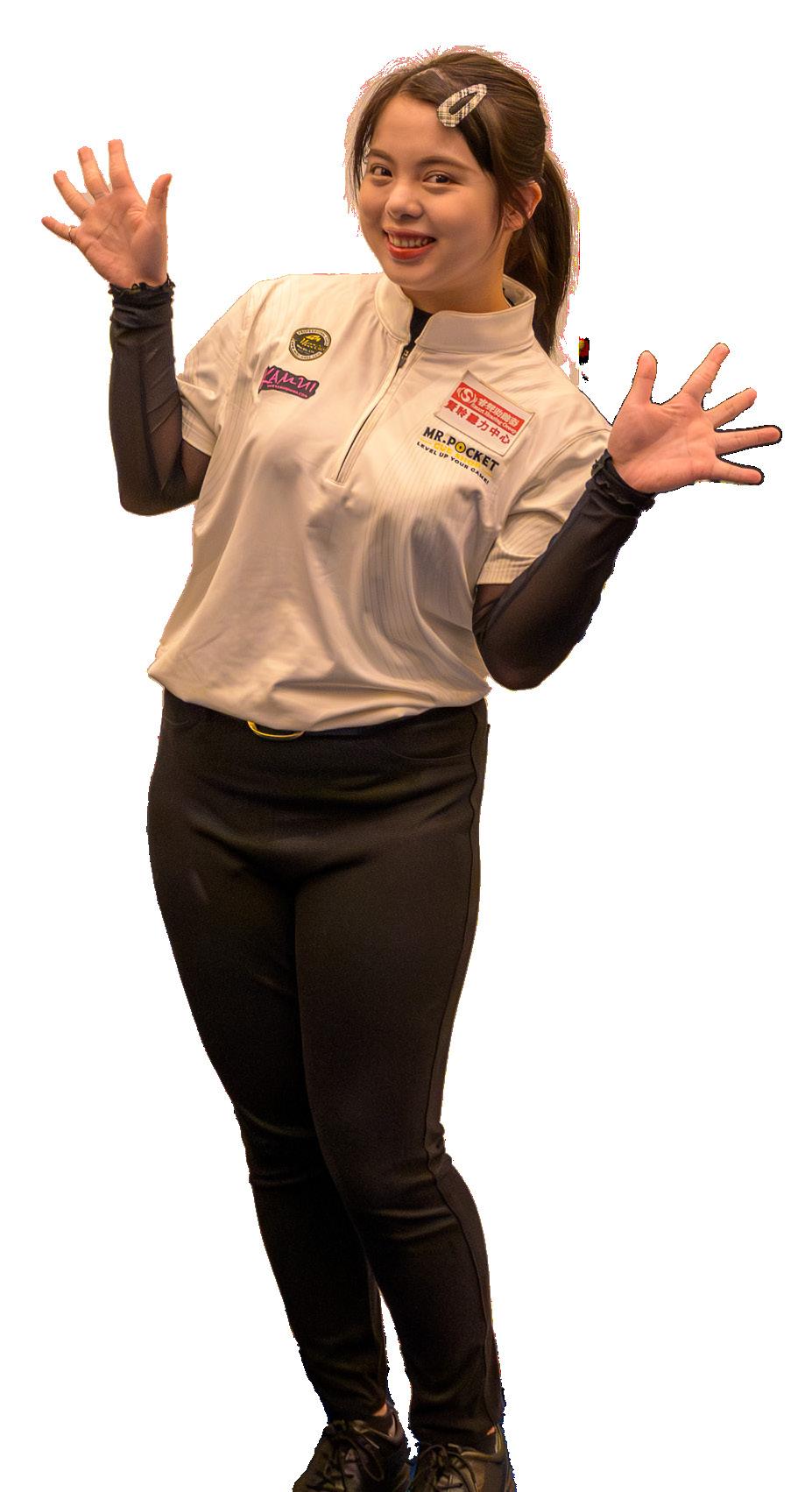
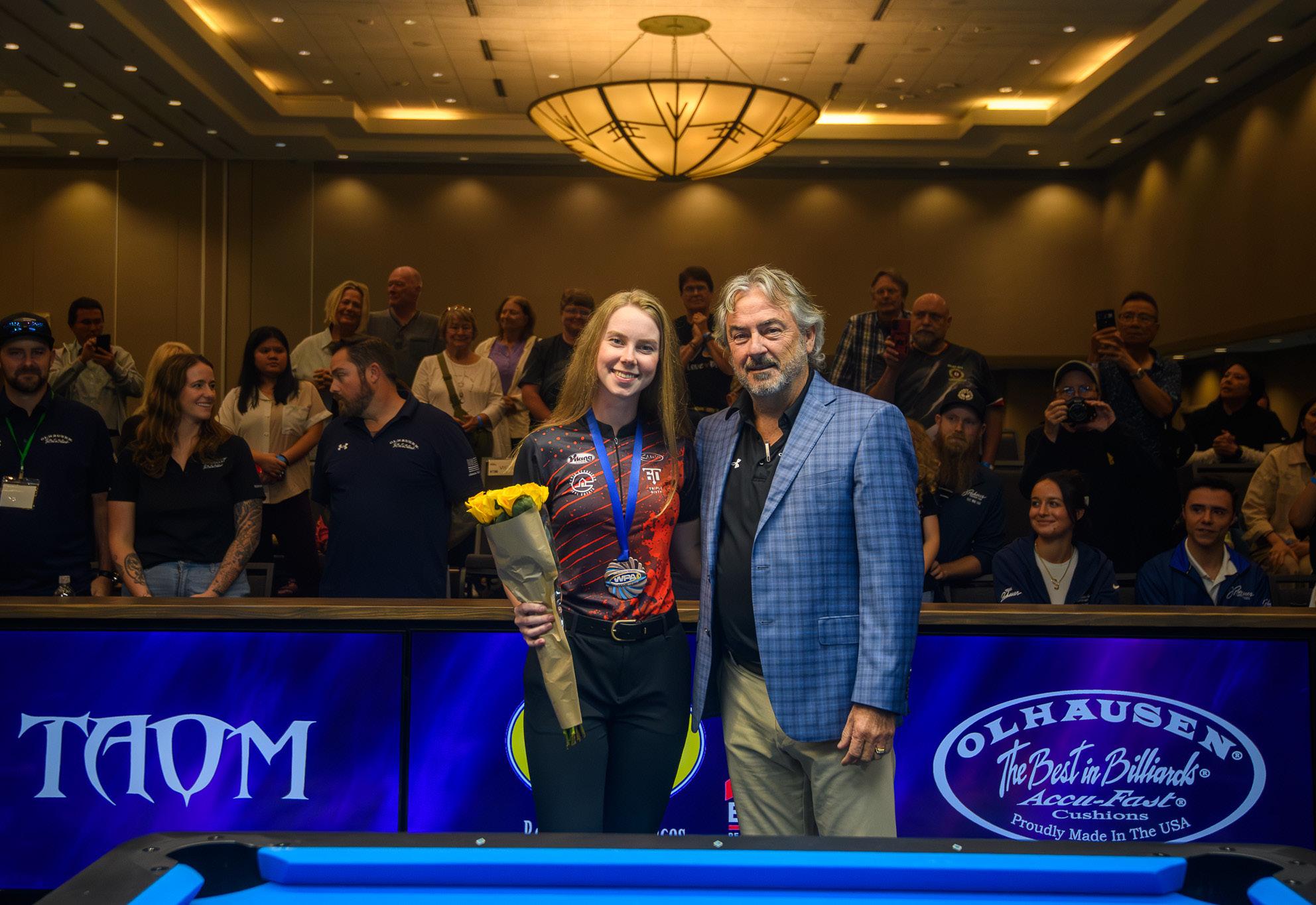
to stall a bit, making successive errors near the end of their second game that eventually allowed Centeno to tie it up at 1-1. Two straight dry breaks by Ouschan and then, Centeno, led first, Centeno and then Ouschan to capitalize and win their opponents’ ‘dry break’ rack and tie the score at 2-2 There wouldn’t be another tie until rack #12.
Ouschan chalked up her first ‘break and run’ and then ran out following Centeno’s dry break of rack #6 to go up by two at 4-2. They traded racks to 5-3, before Ouschan chalked up her third ‘break and run’ to go ahead by three at 6-3.
Centeno used her first ‘break and run’ and then, took advantage of a tactical error by Ouschan in rack #11 (the cue ball rolled past her intended position for it) to pull within one. Centeno used her second ‘break and run’ to tie the score for only the second time at 6. The first World Championship had come down to a race to three.
Ouschan used her third ‘break and run’ to break the tie (7-6). In rack #14, Centeno fell prey to an unforced (tactical) error, missing her last ball before taking aim at the 8-ball. As noted
earlier, in what had become a race-tothree for the title, it gave Ouschan the opportunity to finish the rack, ahead by two and on the hill at 8-6.
With a general, kind of unavoidable tactical error (a dry break), Ouschan opened the door for Centeno to inch closer. Centeno took advantage, finishing rack #15 and with her third ‘break and run,’ tied the score, reducing the match to a single game for the title.
Ouschan, after initiating and sharing a spirited ‘high five’ with Centeno before breaking the rack in that final game, answered with her final ‘break and run,’ although not before she’d committed a tactical error, setting up to shoot at the 8-ball. The attendant crowd held its breath as the cue ball rolled past its intended position and significantly increased the final shot’s difficulty. Aiming to put the 8-ball in a side pocket, the cue ball was perilously close to it, making calculation of the angle to get it done, more difficult than it should have been.
Ouschan was careful. She looked at it from different angles, more than once. She finally put herself down at the table and soft-stroked it into the
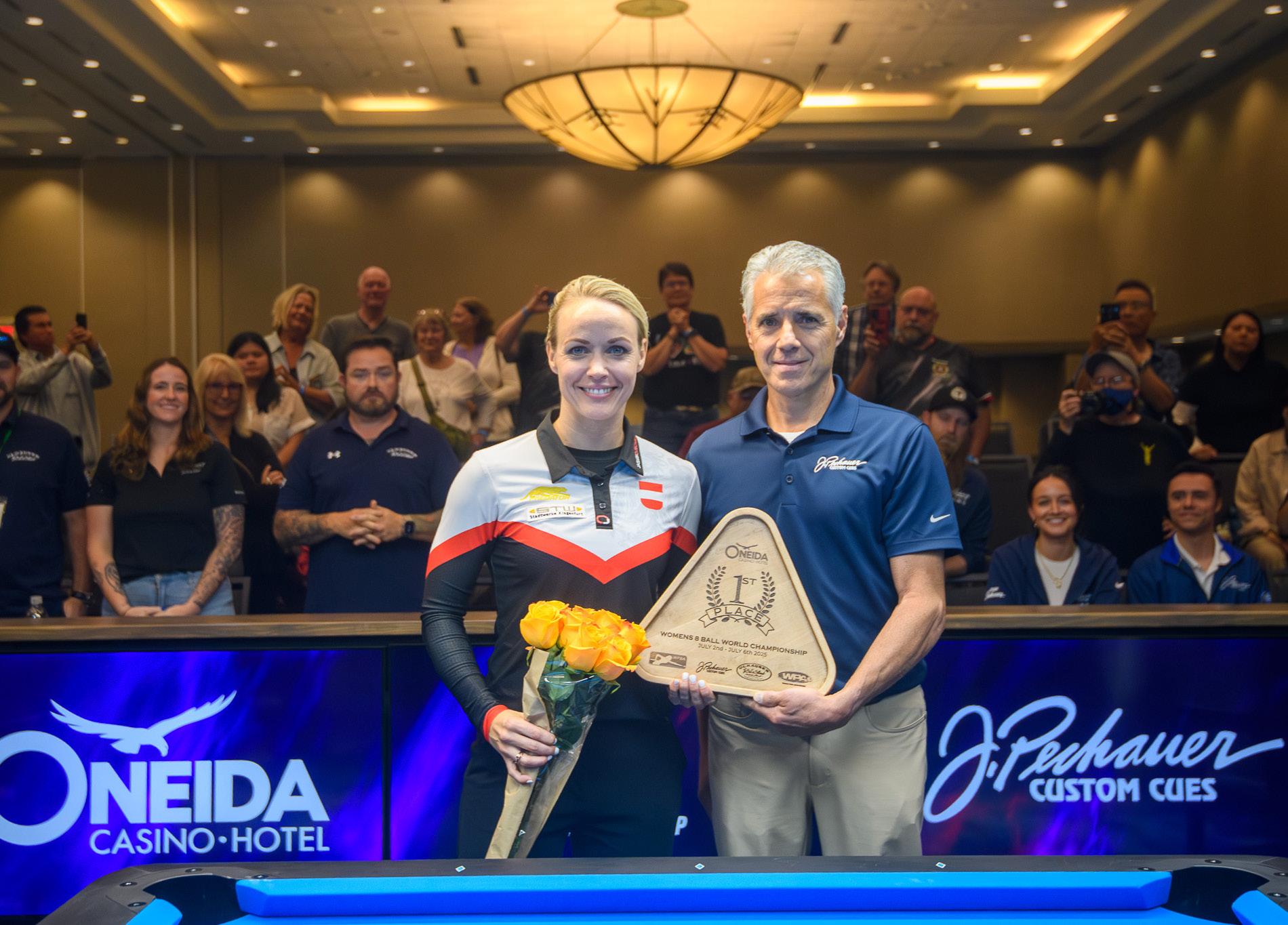
pocket. She jolted in excitement as it dropped, the sound of an appreciative crowd accompanied some fistclenched pacing with a wild smile, as she acknowledged the lingering applause about the truly great finish to the WPA’s first Women’s 8-Ball Championship.
“You know,” she told the crowd after the trophies had been handed out and she was handed the microphone, “I’ve never been a big fan of 8-ball.”
It drew an understandable laugh from the assembled spectators, which she acknowledged by explaining that as her career had progressed, all her friends were playing 9-ball and there were relatively few opportunities to play the latter. Those opportunities had occurred in the early part of her career, when she was Europe’s 8-Ball Youth Champion for six consecutive years between 1999 and 2004 and in 2010, at the European Championships, she swept Gold Medals in all four disciplines (8-ball, 9-ball, 10-ball and 14.1). She went on to explain that as the opportunities grew in number, she found herself practicing it and then, when she won the 8-ball women’s European championship in April,
she thought to herself, “Well, this isn’t so bad after all.”
“And here I am,” she added, her grin trying to stretch beyond her face’s attempts to limit it, “as the first World 8-Ball Champion.”
She may not have been favored to win when the weekend began, but it wasn’t much of a surprise to anyone that she emerged on Sunday evening as the 2025 Oneida WPA/WPBA’s First World Women’s 8-Ball Champion.
In its post-event report on the WPBA Web site, representatives noted that the “historic event Overall, the final match had certain distinctive characteristics. Only Ouschan was able during the 17 games to drop more than a single ball (two) on the break. There were five dry breaks, three of them by Ouschan, including a critical one, the 15th, which Centeno used to her advantage to draw within one of the lead at 8-7. There were eight ‘break and run’s, five of them by Ouschan, including the one that earned her the championship title. Centeno’s third proved to be her last. There were four ties, two of which occurred in the first four games (1-1 and 2-2). The last two occurred in the final five games, to include the one that put the match into its double-hill gear.
Ouschan got started with a ‘break and run’, at which point they both seemed to stall a bit, making successive errors near the end of their second game that eventually allowed Centeno to tie it up at 1-1. Two straight dry breaks by Ouschan and then, Centeno, led first, Centeno and then Ouschan to capitalize and win their opponents’ ‘dry break’ rack and tie the score at 2-2 There wouldn’t be another tie until rack #12.
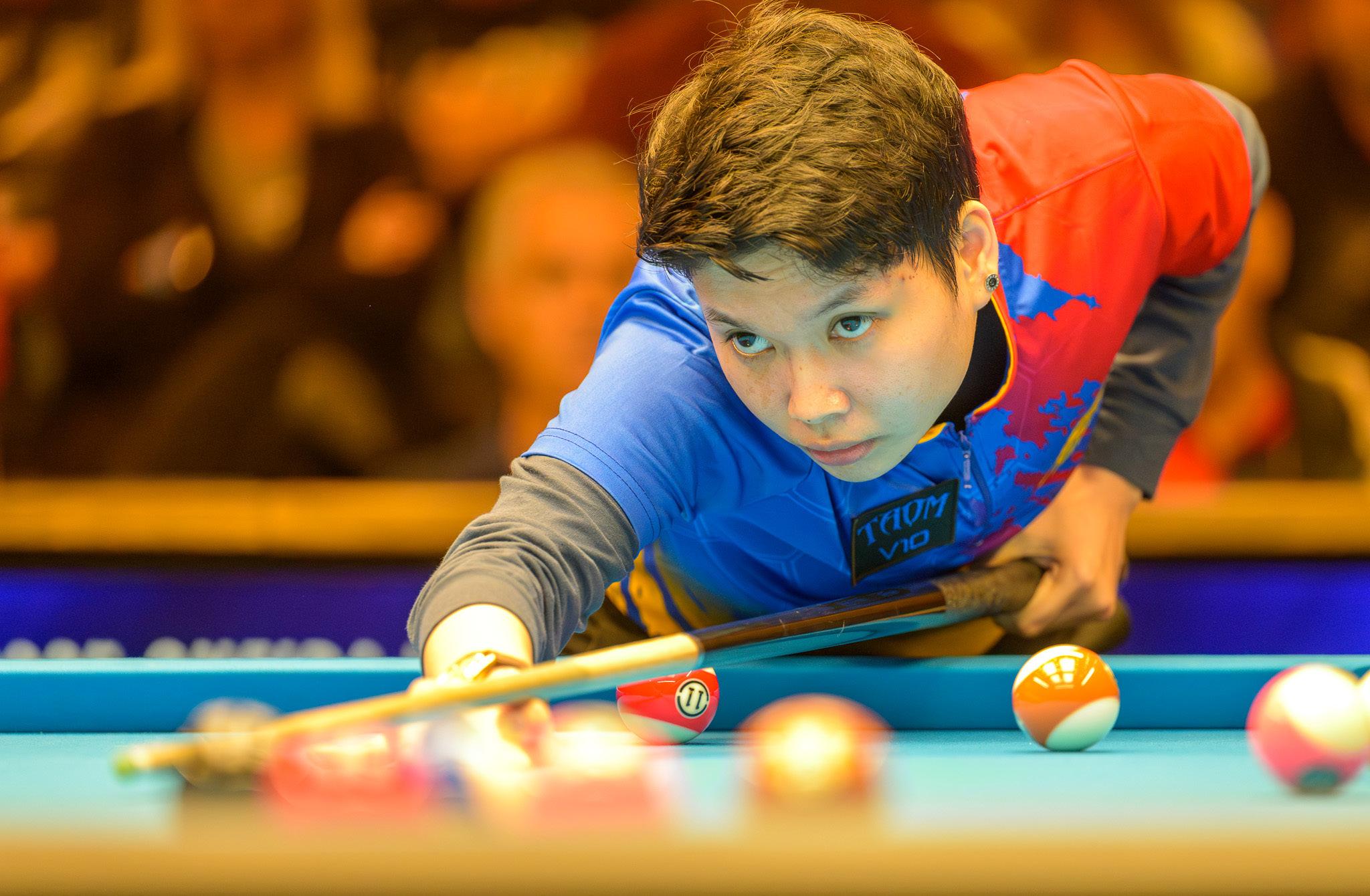
Ouschan chalked up her first ‘break and run’ and then ran out following Centeno’s dry break of rack #6 to go up by two at 4-2. They traded racks to 5-3, before Ouschan chalked up her third ‘break and run’ to go ahead by three at 6-3.
Centeno used her first ‘break and run’ and then, took advantage of a tactical error by Ouschan in rack #11 (the cue ball rolled past her intended position for it) to pull within one. Centeno used her second ‘break and run’ to tie the score for only the second time at 6. The first World Championship had come down to a race to three.
Ouschan used her third ‘break and run’ to break the tie (7-6). In rack #14, Centeno fell prey to an unforced (tactical) error, missing her last ball before taking aim at the 8-ball. As noted earlier, in what had become a race-tothree for the title, it gave Ouschan the opportunity to finish the rack, ahead by two and on the hill at 8-6.
With a general, kind of unavoidable tactical error (a dry break), Ouschan opened the door for Centeno to inch closer. Centeno took advantage, finishing rack #15 and with her third ‘break and run,’ tied the score, reducing the match to a single game for the title.
Ouschan, after initiating and sharing a spirited ‘high five’ with Centeno before breaking the rack in that final game, answered with her final ‘break and run,’ although not before she’d committed a tactical error, setting up to shoot at the 8-ball. The attendant crowd held its breath as the cue ball rolled past its intended position and significantly increased the final shot’s difficulty. Aiming to put the 8-ball in a side pocket, the cue ball was perilously close to it, making calculation of the angle to get it done, more difficult than it should have been.
Ouschan was careful. She looked at it from different angles, more than
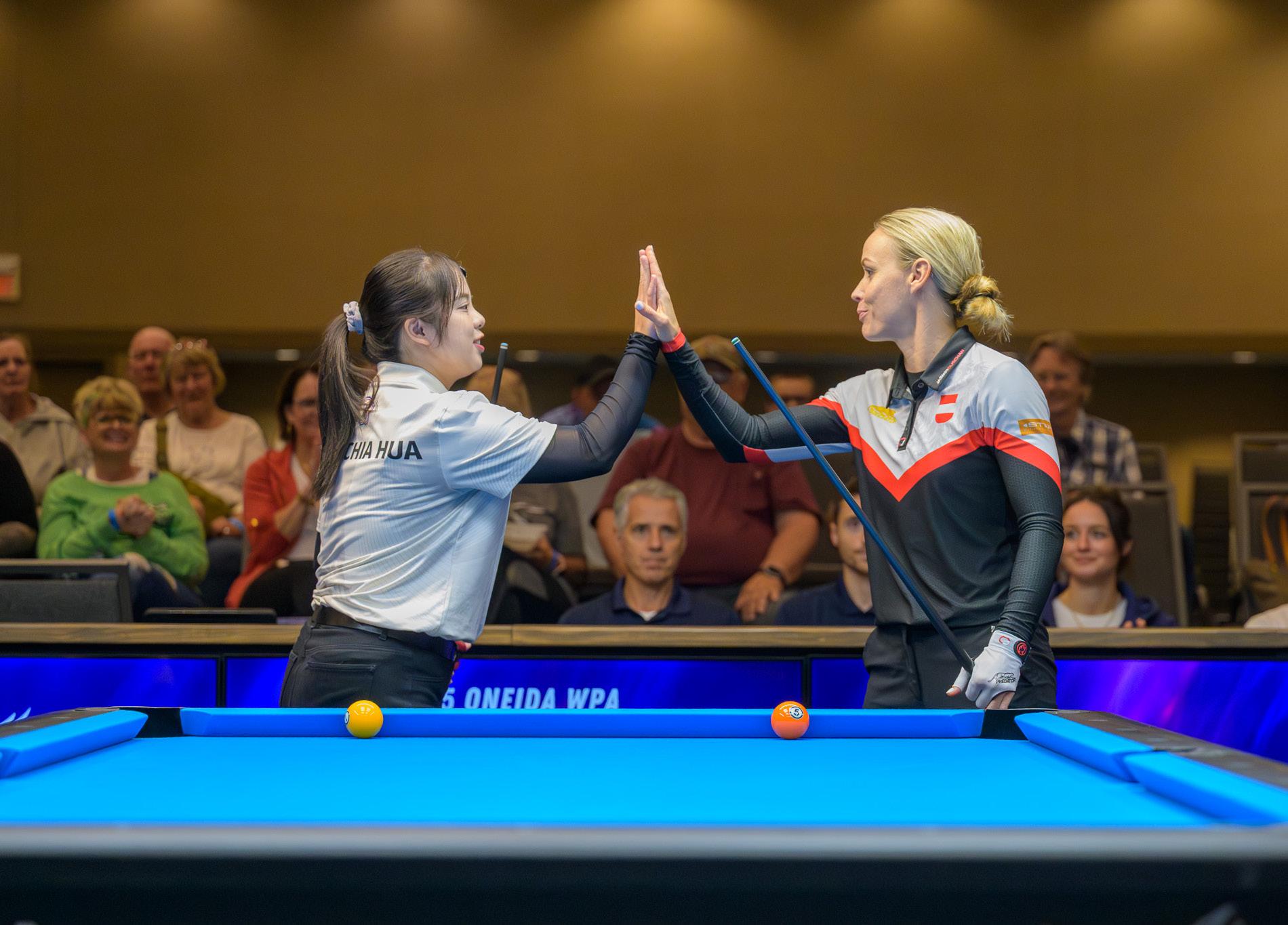
once. She finally put herself down at the table and soft-stroked it into the pocket. She jolted in excitement as it dropped, the sound of an appreciative crowd, accompanying some fistclenched pacing with a wild smile, as she acknowledged the lingering applause about the truly great finish to the WPA’s first Women’s 8-Ball Championship.
“You know,” she told the crowd after the trophies had been handed out and she was handed the microphone, “I’ve never been a big fan of 8-ball.”
It drew an understandable laugh from the assembled spectators, which she acknowledged by explaining that as her career had progressed, all her friends were playing 9-ball and 8-ball and there were relatively few opportunities to play 8-ball. Those opportunities had occurred in the early part of her career, when she was Europe’s 8-Ball Youth Champion for six consecutive years between 1999 and 2004 and in 2010, at the European Championships, she swept Gold Medals in all four disciplines (8-ball, 9-ball, 10-ball and 14.1). She went on to explain that as the opportunities grew in number, she found herself practicing it and
then, when she won the 8-ball women’s European championship in April, she thought to herself, “Well, this isn’t so bad after all.”
“And here I am,” she added, her grin trying to stretch beyond her face’s attempts to limit it, “as the first World 8-Ball Champion.”
She may not have been favored to win when the weekend began, but it wasn’t much of a surprise to anyone that she emerged on Sunday evening as the 2025 Oneida WPA/WPBA’s First World Women’s 8-Ball Champion.
In the post-event report that the WPBA filed on their Web site, representatives noted that the “historic event Overall, the final match had certain distinctive characteristics. Only Ouschan was able during the 17 games to drop more than a single ball (two) on the break. There were five dry breaks, three of them by Ouschan, including a critical one, the 15th, which Centeno used to her advantage to draw within one of the lead at 8-7. There were eight ‘break and run’s, five of them by Ouschan, including the one that earned her the championship title. Centeno’s third proved to be her last.





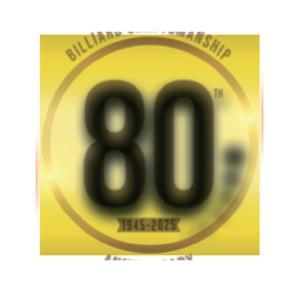

There were four ties, two of which occurred in the first four games (1-1 and 2-2). The last two occurred in the final five games, to include the one that put the match into its double-hill gear.
Ouschan got started with a ‘break and run’, at which point they both seemed to stall a bit, making successive errors near the end of their second game that eventually allowed Centeno to tie it up at 1-1. Two straight dry breaks by Ouschan and then, Centeno, led first, Centeno and then Ouschan to capitalize and win their opponents’ ‘dry break’ rack and tie the score at 2-2 There wouldn’t be another tie until rack #12.
Ouschan chalked up her first ‘break and run’ and then ran out following Centeno’s dry break of rack #6 to go up by two at 4-2. They traded racks to 5-3, before Ouschan chalked up her third ‘break and run’ to go ahead by three at 6-3.

Centeno used her first ‘break and run’ and then, took advantage of a tactical error by Ouschan in rack #11 (the cue ball rolled past her intended position for it) to pull within one. Centeno
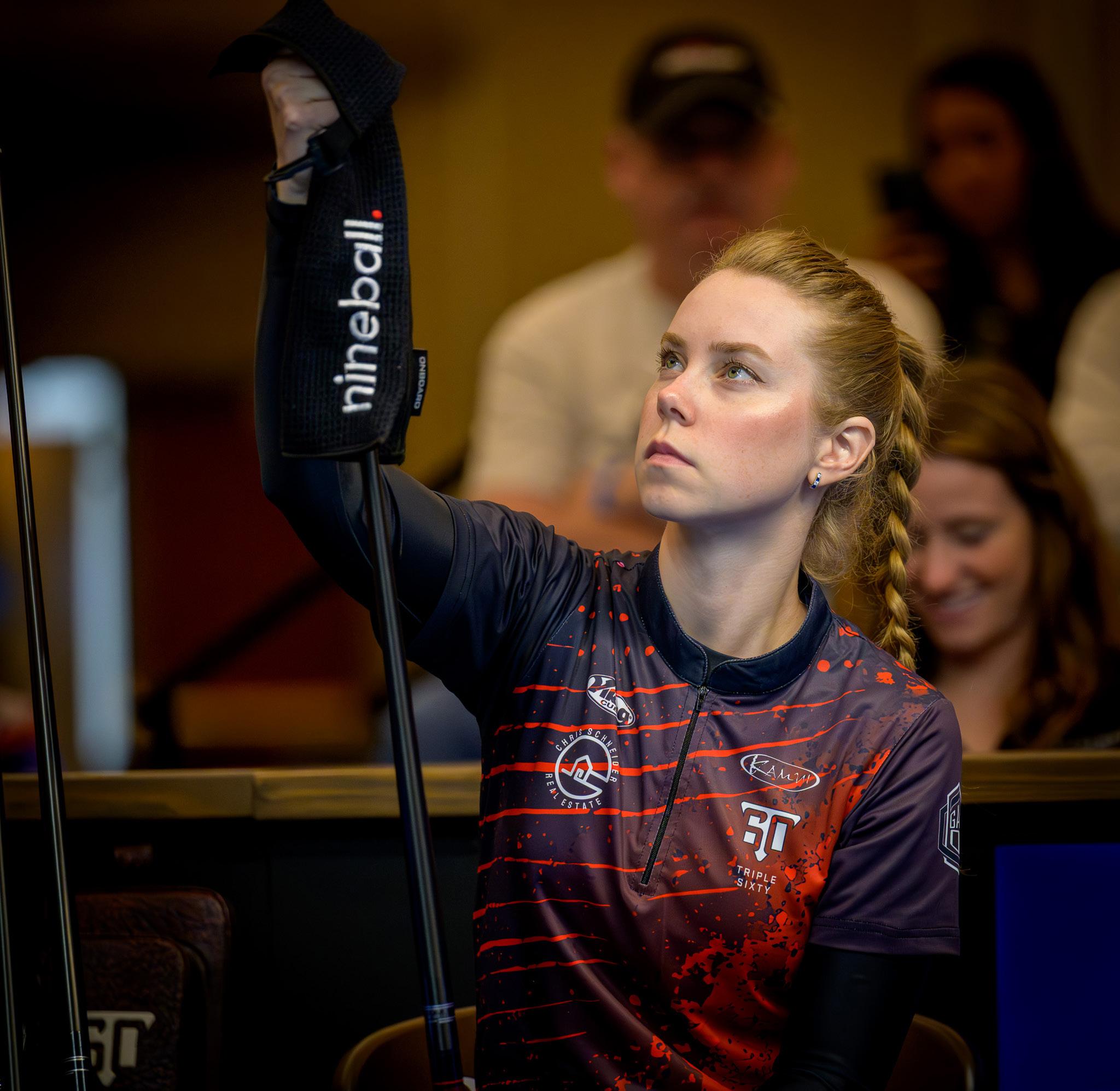
used her second ‘break and run’ to tie the score for only the second time at 6. The first World Championship had come down to a race to three.
Ouschan used her third ‘break and run’ to break the tie (7-6). In rack #14, Centeno fell prey to an unforced (tactical) error, missing her last ball before taking aim at the 8-ball. As noted earlier, in what had become a race-tothree for the title, it gave Ouschan the opportunity to finish the rack, ahead by two and on the hill at 8-6.
With a general, kind of unavoidable tactical error (a dry break), Ouschan opened the door for Centeno to inch closer. Centeno took advantage, finishing rack #15 and with her third ‘break and run,’ tied the score, reducing the match to a single game for the title.
Ouschan, after initiating and sharing a spirited ‘high five’ with Centeno before breaking the rack in that final game, answered with her final ‘break and run,’ although not before she’d committed a tactical error, setting up to shoot at the 8-ball. The attendant crowd held its breath as the cue ball rolled past its intended position and
significantly increased the final shot’s difficulty. Aiming to put the 8-ball in a side pocket, the cue ball was perilously close to it, making calculation of the angle to get it done, more difficult than it should have been.
Ouschan was careful. She looked at it from different angles, more than once. She finally put herself down at the table and soft-stroked it into the pocket. She jolted in excitement as it dropped, the sound of an appreciative crowd, accompanying some fistclenched pacing with a wild smile, as she acknowledged the lingering applause about the truly great finish to the WPA’s first Women’s 8-Ball Championship.
“You know,” she told the crowd after the trophies had been handed out and she was handed the microphone, “I’ve never been a big fan of 8-ball.”
It drew an understandable laugh from the assembled spectators, which she acknowledged by explaining that as her career had progressed, all her friends were playing 9-ball and 8-ball and there were relatively few opportunities to play 8-ball. Those opportunities had occurred in the early part of her career, when she was Europe’s 8-Ball Youth Champion for six consecutive years between 1999 and 2004 and in 2010, at the European Championships, she swept Gold Medals in all four disciplines (8-ball, 9-ball, 10-ball and 14.1). She went on to explain that as the opportunities grew in number, she found herself practicing it and then, when she won the 8-ball women’s European championship in April, she thought to herself, “Well, this isn’t so bad after all.”
“And here I am,” she added, her grin trying to stretch beyond her face’s attempts to limit it, “as the first World 8-Ball Champion.”
She may not have been favored to win when the weekend began, but it
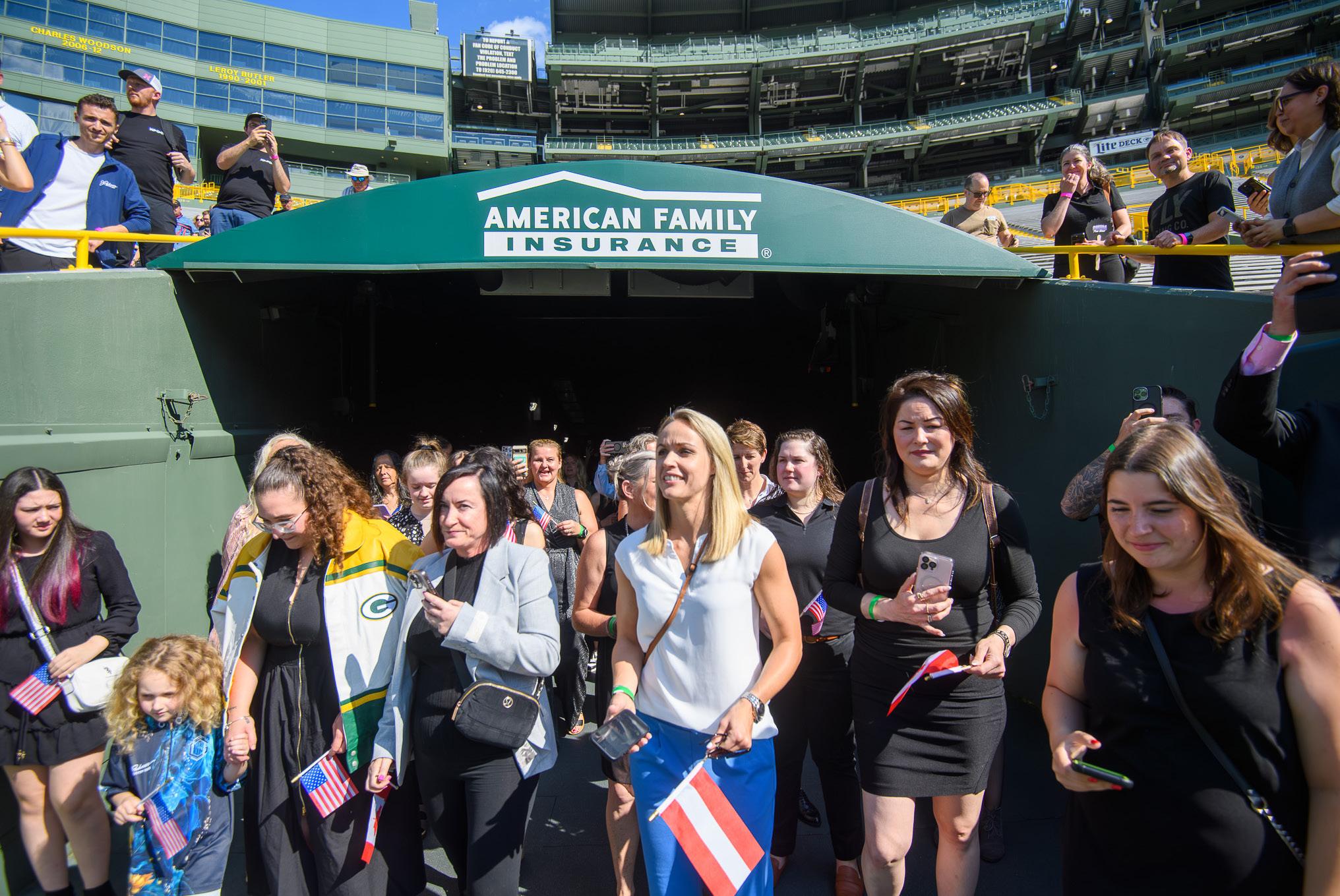
wasn’t much of a surprise to anyone that she emerged on Sunday evening as the 2025 Oneida WPA/WPBA’s First World Women’s 8-Ball Champion.
On the post-event report on the WPBA Webe site, representatives noted that the “historic event would not have been possible without the generosity, leadership, and cultural pride of the Oneida Nation, whose hotel and casino served as host site and major sponsor. Oneida contributed significantly to the added prize fund and provided
the perfect setting for both professional competition and community celebration.” They also remarked on the event’s Presenting Sponsor, J. Pechauer Custom Cues, who “played a vital role in securing local partnerships and ensuring a first-class experience for the athletes—including a fully furnished Player’s Lounge with couches, tables, and food directly adjacent to the backstage practice area. Their dedication to both the sport and the players was evident throughout the week.”
Editorial Note: All of the event’s streamed matches are available for viewing on the WPBA’s YouTube channel; https://www.youtube.com/watch?v=3Zmyjxj6Dgs. It is recommended that viewers, either by searching the two brackets (Stage 1 and Stage 2 at https://digitalpool.com/tournaments/2025-oneida-wpa-womens-8-ball-world-championship/viewer), or knowing already which matches you want to watch, that you initiate a YouTube search for individual matches, using the names of the competitors. Jasmin Ouschan, Chezka Centeno, for example, if you want to watch the final. Here are some randomly-chosen, double-hill matchups that you might consider from Stage 2 (Final 16) – Tzu-Chien Wei vs. Chieh-Yu Chou, Kristina Zlateva vs. Seo Seoa, Chia-Hua Chen vs. Shui Ching Chiang, Chezka Centeno vs. Tzu-Chein Wei, and, of course, the final between Jasmin Ouschan and Chezka Centeno. Knowing who won any of these matches does very little to affect the enjoyment of watching how they played out at the table. The final is one that was particularly exciting; neither player out of the running at any point, contrasting styles; Centeno’s rapid pace (she’s known as The Flash), vs. Ouschan’s more deliberate work. A lot of fun, any way you actually look at it.
The Pool World was stunned on Monday (the 14th) to read online reports that Taiwanese star Chang Jung Lin had passed away, while competing at the Indonesia International Open.
Chang’s roommate Ryan Hsu posted that he found Chang in their room in between matches.
Chang had a lot of success back in the late 2000’s, with multiple wins on the Guinness World Tour in Asia and continued to turn in top ten finishes at major events for the following years.
Chang captured his only World Championship in 2012, winning the World 8-Ball Championship in Fujairah in the
UAE, defeating countryman Che Wei Fu in the finals. Chang followed up that win with a first place finish at the All Japan Championship, where he defeated another countryman in the finals, Chin-Shung Yang.
Chang turned in a second place finish at the 2016 US Open 9-Ball Championship, falling to Shane Van Boening in the finals. He also finished in second place at the Kuwait 9-Ball Open, falling to Jason Shaw in the finals.
Other notable titles in Chang’s short career included the 2018 International 9-Ball Open, beating countryman Ko Ping Chung in the finals, and a win at the 2019 Derby City Classic Bigfoot 10-Ball Challenge and the 2020 Diamond Las Vegas Open.
Chang was ranked #11 on the WPA Pro Rankings and #66 on the WNT rankings. With Chang turning 40 this year, he will be eligible for the BCA Hall of Fame this year. Inductees for the Hall of Fame will be announced later this year.
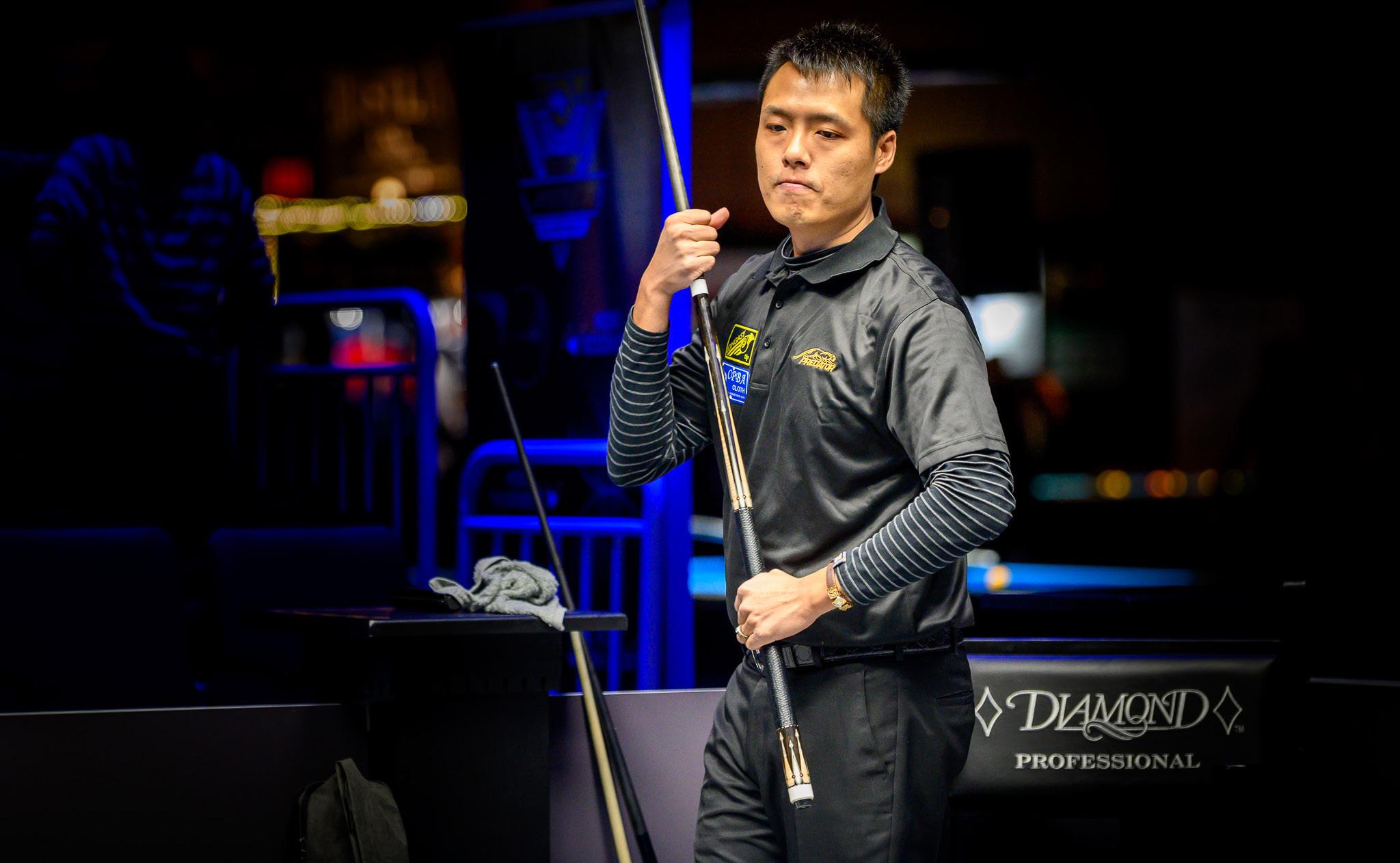


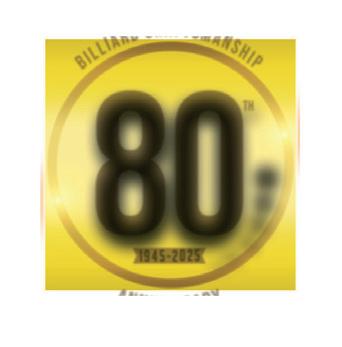



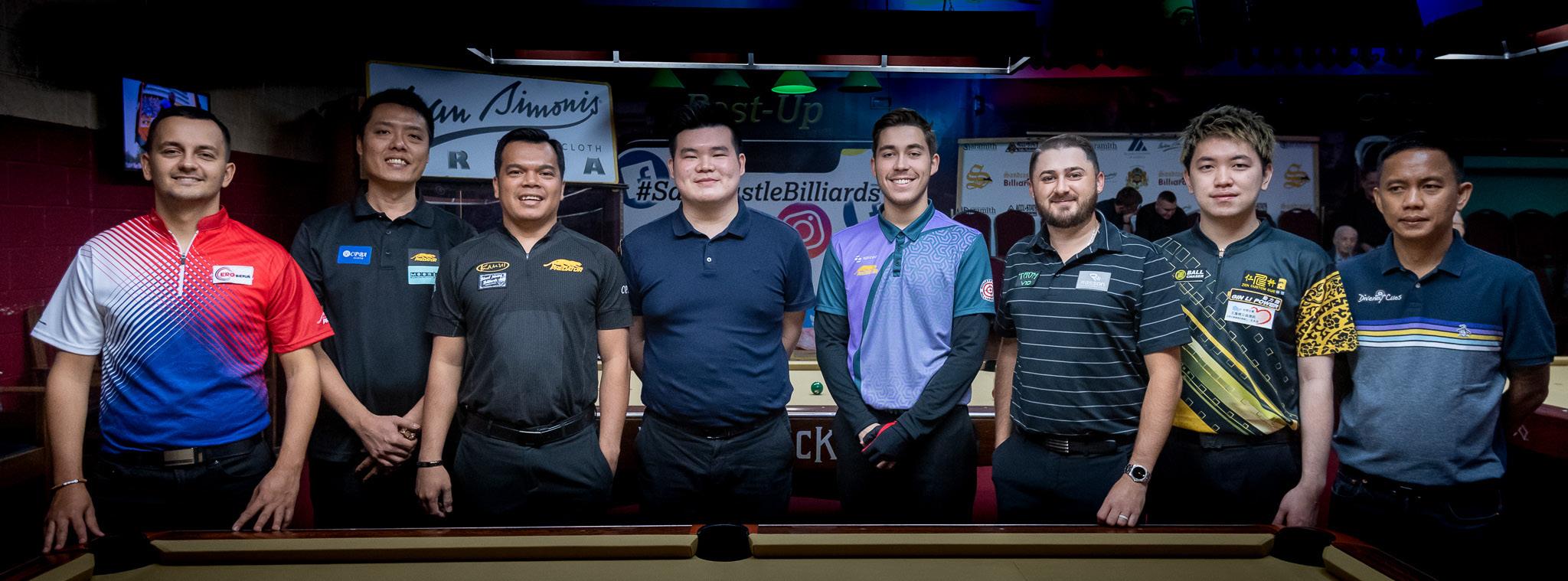
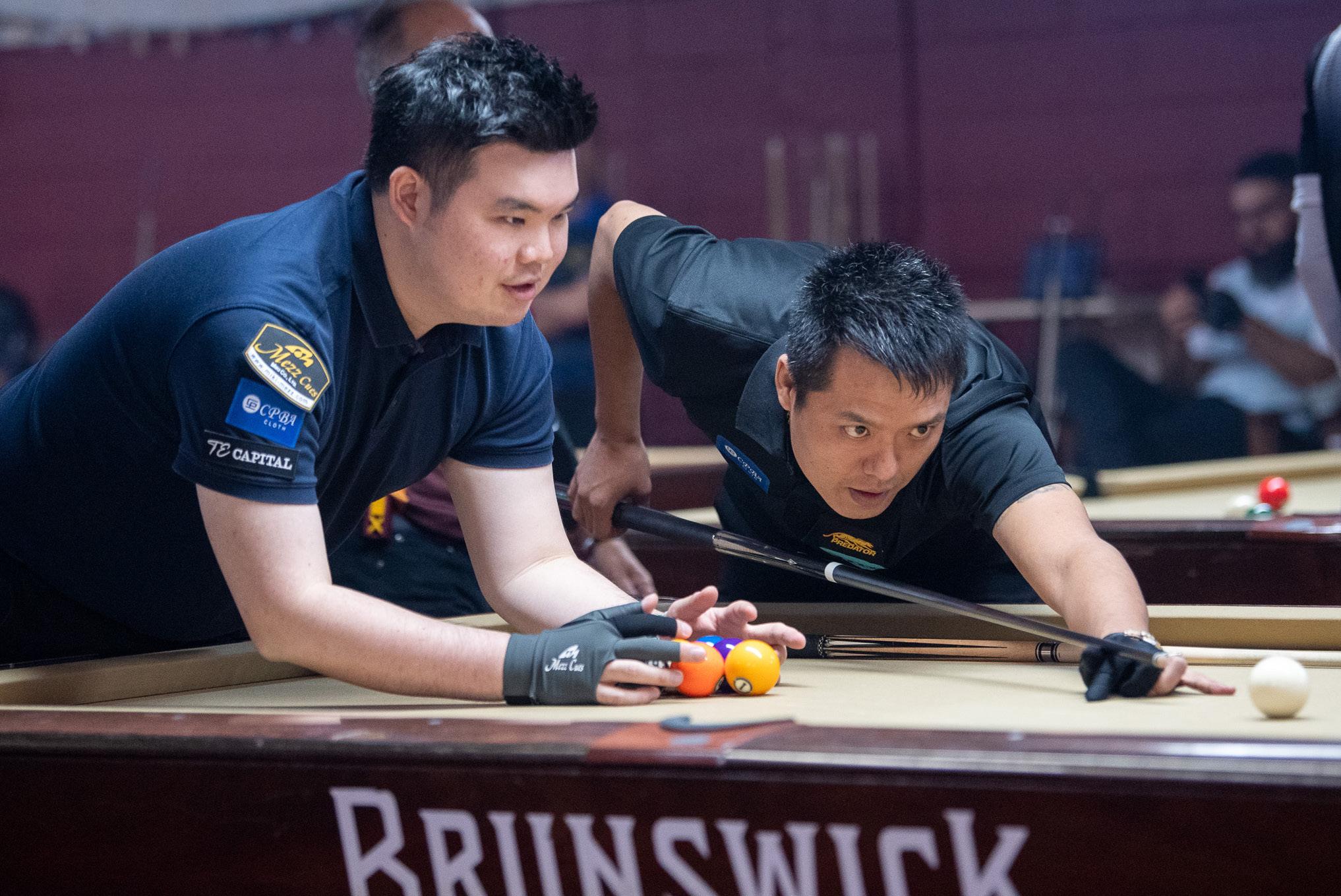


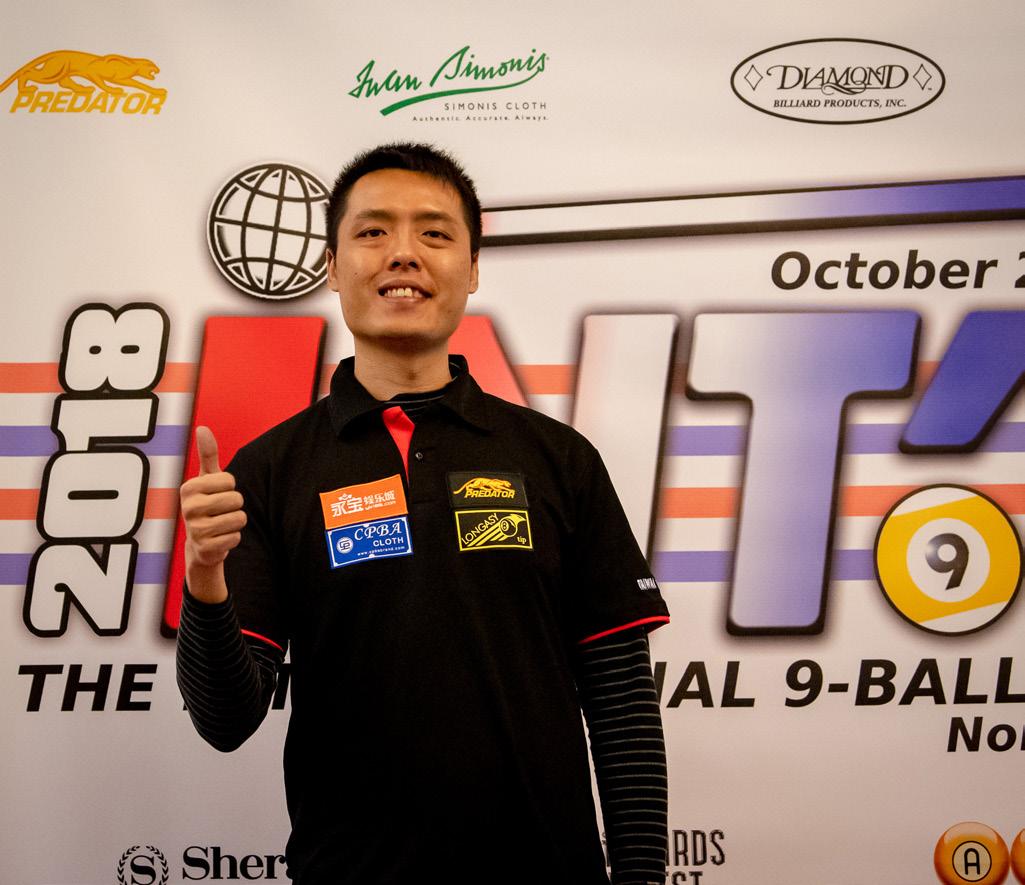
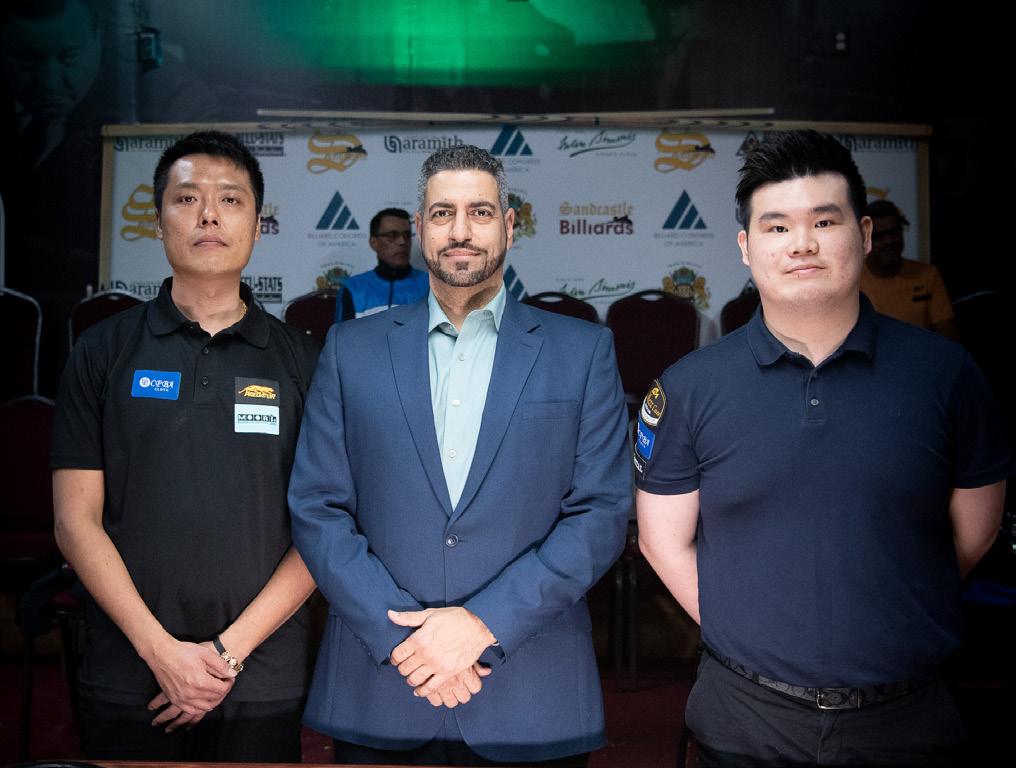
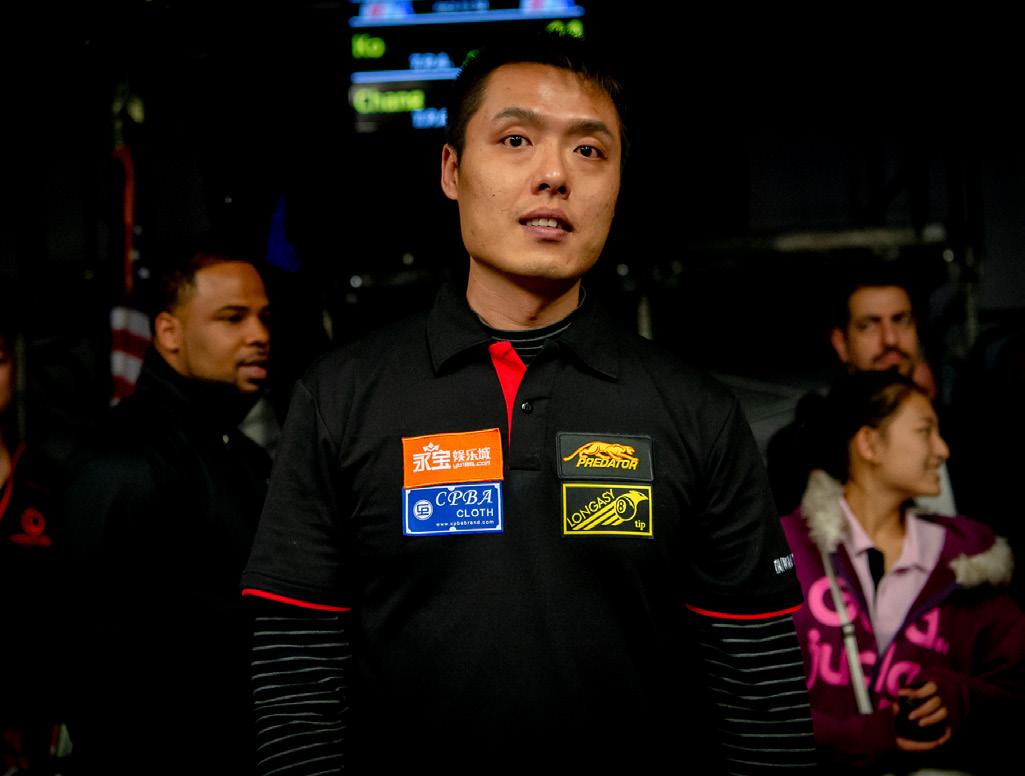
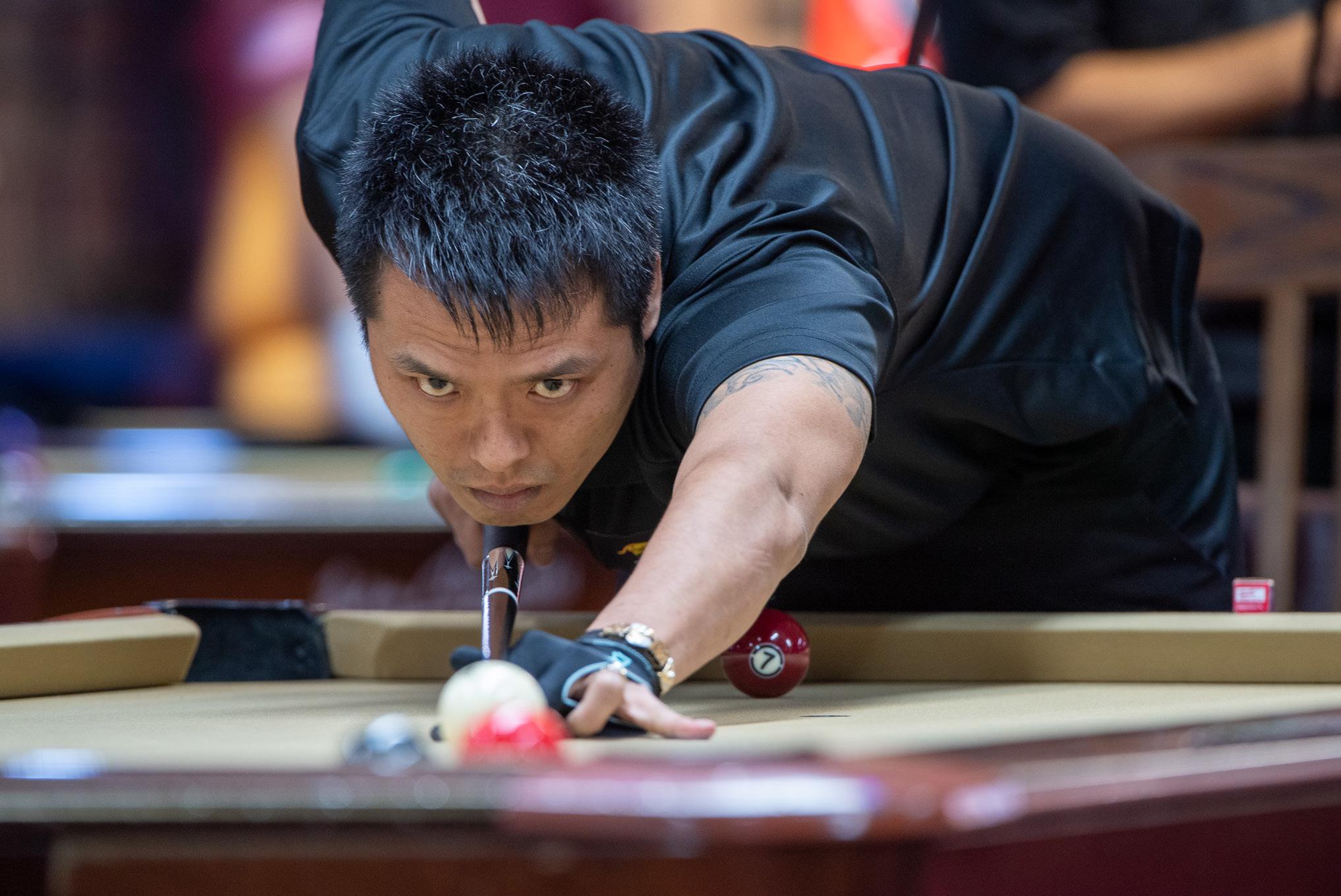
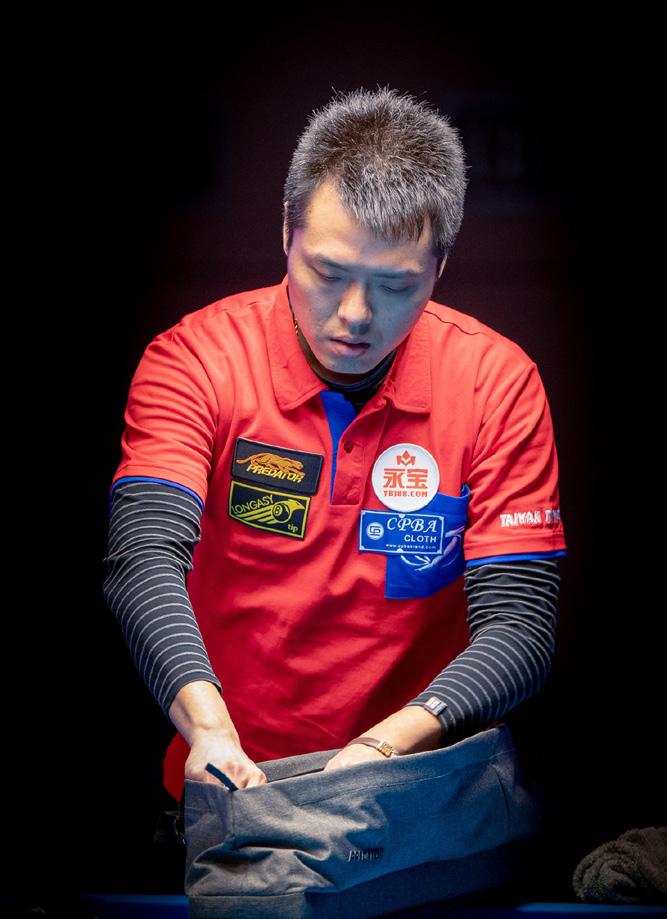

By Mary Kenniston
Owners Jim Landrum and Randy Hanson of Big Dog Billiards in Des Moines, IA welcomed players, fans and cuemakers this past week to show their stuff at their $18,000 added Eleventh Annual Midwest Billiards & Cue Expo.
In addition to the Cue Expo, there were four events – One Pocket, Nine Ball, Bar Table Nine Ball and a Banks Ring Game.
Presented by Big Dog’s Billiards and PoolActionTV.com, local sponsors included Diveney Custom Cues, Diamond Billiard Products, Inc., Kamui, Simonis, Aramith, Savage Billiards, Jacoby Custom Cues, Inc., Slate Billiards of St. Paul, MN and the city of Des Moines, IA.
The event opened with the star-studded $7,500 added One Pocket Championship. Seven players posted their $1,000 entry fees to compete in this true double elimination event with races to four on both sides.
BCA Hall of Famer Shane Van Boening drew the lone bye and Roberto Gomez defeated Devin Poteet 4-1, Tony Chohan beat Chip Compton 4-2 and Josh Roberts edged out Sergio Rivas 4-3.
Van Boening blew through Gomez 4-1 as Roberts and Chohan battled it out on the other table. Josh survived 4-3 only to be blistered 4-0 by Shane.
On the west side, Rivas was eliminated by Compton 4-2 only to be knocked out by Gomez 4-1. Chohan sent Poteet packing 4-2.
This set up the Gomez-Chohan match - Roberto spanked Tony 4-0. Waiting

for Gomez was Roberts – their match would determine who would move on to the finals against Van Boening.
On fire, Gomez won that match 4-2 leaving Roberts in third place.
The finals was close as both Shane and Roberto played world class one pocket. They played down to the case game with Van Boening pocketing the final ball to win 4-3 and become this year’s Midwest Open One Pocket champion.
Friday evening saw the start of both the $7,500 added Nine Ball Championship and the $2,000 added Bar Table Nine Ball Championship.
The $7,500 Nine Ball event began on Friday with 28 players. This true double elimination event had modified entry fees based on Fargorate. Played on nine foot tables, races were to nine with winner breaks.
The previous day’s one pocket finalists Shane Van Boening and Roberto Gomez sliced through the field and were joined by Devin Poteet and Demetrius Jelatis to reach the final four on the winners side.
Once there, Van Boening defeated Jelatis 9-1 and Poteet pounded Gomez 9-3.
Both winning players advanced to the hot seat match where Shane locked up his finals seat 9-5.
On the west side, Jelatis was eliminated by Josh Roberts and Miguel Salvilla lost to Gomez – both matches 9-5.
On his way back to the finals, Gomez knocked out Roberts 9-6 and got his revenge against Poteet 9-4.
As noted previously, Gomez would have to defeat Van Boening two sets for the title.
The match started out close with Shane maintaining a slight lead and

then he started pulling away. At 6-3, Shane came with a decisive blow as he powered in a reverse cut on the two and came around three rails for shape on the next ball and ran out to get within closing distance of the match.
Roberto only got one more chance at the table after Shane laid down another impressive safety in the following game. He missed the hit and Shane ran out that one and then the next to claim the title with an impressive 9-3 victory!
Saturday night action saw the Banks Ring Game close with Roberto Gomez making it to the finals once more but fell short to Chase Stumfoll.
And after many matches in the Bar Table Nineball Championship, it finally came down to two players - Dustin Gunia and Chip Compton. “Double Dip Chip” was looking for two scoops in this true double elimination event but unfortunately for him, Dustin wasn’t having any of it.
In a match that came down to the wire, Dustin took it down 7-6 and claimed the title!
PoolActionTV.com would again like to thank Big Dog’s owners Jim Landrum and Randy Hanson and their staff for another great event and taking such good care of all the players, vendors and fans.
Thanks to Tournament Director Jeremy White for running the Bar Table Nineball Championship and to Tournament Director Ray Hansen and his Assistant Tournament Director Ian Jones for handling the other three events.
We’d also like to thank Larry Schwartz, Jeremy Jones and Ray Hansen for the their expert commentary.
Congratulations to Shane Van Boening, Dustin Gunia and Chase Stumfoll for becoming this year’s Midwest Open champions!
See you next year!
The 37th Annual Junior National Championships, hosted by the Billiard Education Foundation (BEF), concluded on Saturday, July 12, 2025, at the Oakley Lindsay Civic Center in Quincy, Illinois. This marked the third consecutive year the charming river town played host to the prestigious youth billiards event.
Upon entering the venue, attendees were greeted by a wave of patriotic pride—American flags elegantly displayed above each table, accompanied by Digital Pool monitors and illuminated by tournament table lighting. The event welcomed nearly 100 talented billiard student-athletes from over 26 states, showcasing the growing reach and community of junior cue sports.
For the first time in its history, the BEF Junior Nationals were part of the inaugural USA National Pool Championships, which included the $20,000-added Masters USA Pool Championships and as well as the annual Wheelchair National Pool Championships—bringing together multiple levels of the sport under one roof.
(Sponsored by Lucasi)
The first discipline to conclude during championship week was 8-Ball. In response to pandemic-era disruptions, the BEF introduced a 22 & Under division post-lockdown, giving players who aged out of the traditional 18 & Under category a renewed chance to compete. This year, several divisions were consolidated to streamline the event and enhance the competitive field.
After losing his first match, 17-year-old “Fast Eddie” Vonderau of Rapid City, South Dakota stormed through the 18 & Under Boys bracket, clinching the title in a nail-biting hill-hill final against “Jersey Devil” Jose Vicente.
In the Girls 18 & Under division, 17-year-old “The Pink Dagger” Sofia Mast of Wesley Chapel, Florida showcased dominance and precision, defeating 15-year-old “Road Runner” Savannah Easton of Las Vegas, Nevada in a spirited championship showdown.
Meanwhile, in the Boys 14 & Under category, “Maverick” Hayden Ernst claimed the first of his multiple gold medals for the week, emerging victorious in a gripping back-andforth final against Houston’s rising up-and-comer, Gavin Mathew.
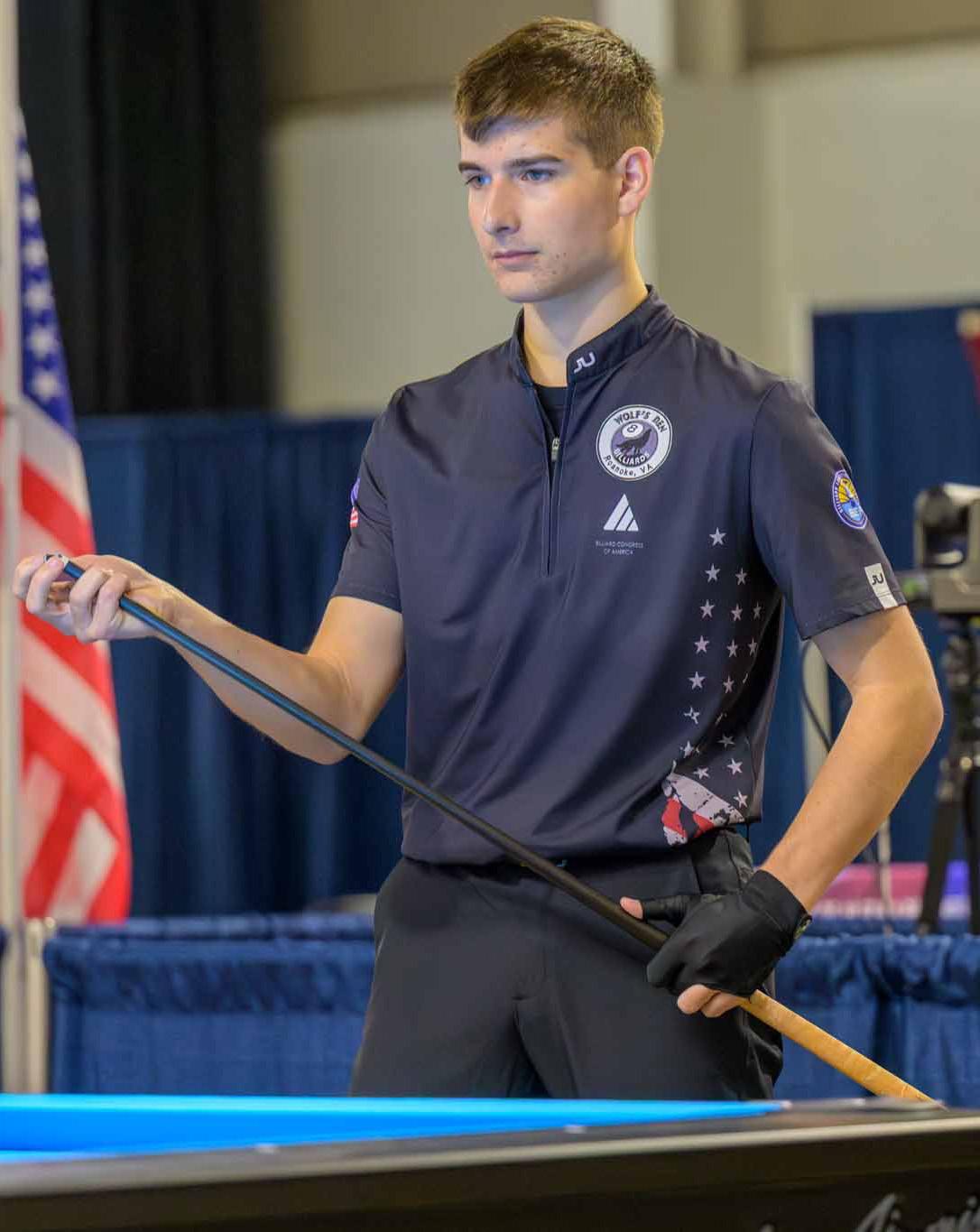
Eddie Vonderau
Rapid City, South Dakota Gold Medal + $500 BEF Scholarship + Lucasi Cue
Jose Vincente Newfield, New Jersey Silver Medal + $250 BEF Scholarship + Lucasi Cue
Jake Jackson Buffalo, New York Bronze Medal + Lucasi Cue
Payton Bernard Aubrey, Texas Bronze Medal + Lucasi Cue
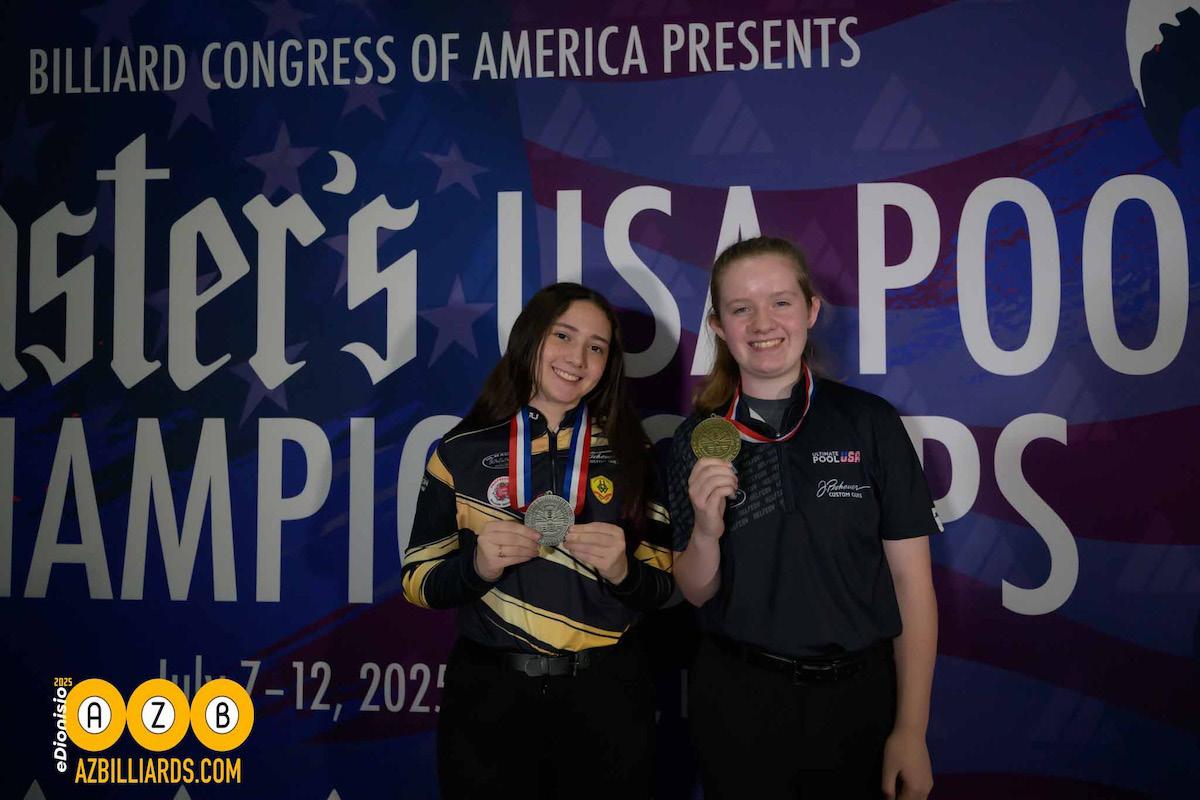
18
Sofia Mast Wesley Chapel, Florida Gold Medal + $500 BEF Scholarship + $500 Repici Scholarship + Lucasi Cue
Savannah Easton Las Vegas, Nevada Silver Medal + $250 Scholarship + Lucasi Cue
Jordan Helfery St. Joseph, Missouri
April Gonzales Ft. Worth, Texas
Bronze Medal + Lucasi Cue
Bronze Medal + Lucasi Cue

14 & Under Coed
Hayden Ernst Louisville, Kentucky Gold Medal + Lucasi Cue
Gavin Mathew Frisco, Texas
Damon Kahler Appleton, Wisconsin
Austin Axe Dugger, Indiana
10 & Under Coed
Quinton Hensley Flint, Michagan Gold Medal + $50 Pool Dawg Gift Certificate
Dalton Nelson Elroy, Wisconsin Silver Medal
Christian Montalvo Ypsilanti, Michigan Bronze Medal
Chris Guerrero, Jr. Macomb, Illinois Bronze Medal
The 18 & Under Girls 9-Ball finals delivered another exciting Easton vs. Mast showdown, highlighting the growing rivalry between two of junior billiards’ brightest stars. On the boys’ side, “V” stood for Vicente—and for Victory—as he clinched his first gold medal with a commanding 8–2 win over Colton Peach.
Meanwhile, 13-year-old Jordan Helfery of St. Joseph, Missouri made her mark on the national stage by earning her first gold medal. She triumphed over Florida’s 11-year-old Tiffany Tang, who celebrated a strong silver medal finish in just her second appearance at Junior Nationals.
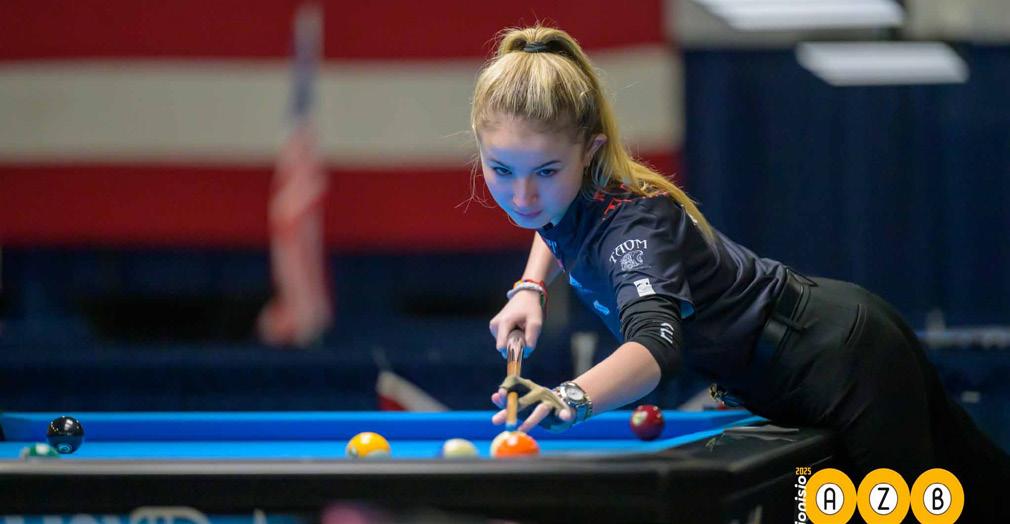
18
Savannah Easton Las Vegas, Nevada Gold Medal + $500 BEF Scholarship + $500 Repici Scholarship + Meucci Cue
Silver Medal + Lucasi Cue
Bronze Medal + Lucasi Cue
Bronze Medal + Lucasi Cue
Sofia Mast Wesley Chapel, Florida Silver Medal + $250 BEF Scholarship + Predator Cue Case
Marissa Du Seattle, Washington Bronze Medal
Avah Weems Tom Bean, Texas Bronze Medal

16 & Under Boys
Jose Vincente Vineland, New Jersey Gold Medal +$500 BEF Scholarship + Meucci Cue
Colton Peach Princeton, Illinois Silver Medal + $250 BEF Scholarship + Predator Cue Case
Hayden Ernst Louisville, Kentucky Bronze Medal
Shane Petrick Bellaire, Texas Bronze Medal
14 & Under Girls
Jordan Helfery St. Joseph, Missouri Gold Medal + $250 Repici Scholarship + Viking Cue
Tiffany Tang Tallahassee, Florida Silver Medal + Predator Cue Case
Savannah Hall Worden, Illinois Bronze Medal
Mary Jane Zuber Albuquerque, New Mexico Bronze Medal
12 & Under Boys
Gavin Mathew Frisco, Texas
Gold Medal + Cue Tec Cue
Dalton Nelson Elroy, Wisconsin Silver Medal + Predator Cue Case
Donovan Seymour Raymond, California Bronze Medal
Quinton Hensley Flint, Michigan Bronze Medal
This year’s 14.1 Challenge introduced a subtle yet impactful format update: two dedicated tables were set aside for the event, giving players seven attempts each to execute an open break and continue with a break ball. The top three cumulative high runs from those seven attempts determined the four leading finishers in each of the three age divisions, who then advanced to the semifinal and final brackets.
In an electrifying final, Vicente unleashed two remarkable runs of 28 and 29 balls to defeat “Wolverine” Kaden Herrbach and clinch the gold medal in the 14.1 discipline. At the end of their match Vicente went on to complete an astonishing 68 ball run! On the girls’ side, Mast started strong with a sharp 21-ball run, seizing an early lead. But it was 13-year-old Helfery who stole the spotlight once again, surging past Mast to secure her second gold medal of the championships with precision and poise.
Jose Vicente Vineland, New Jersey Gold Medal + $500 BEF Scholarship + Bull Carbon Cue
Kaden Herrbach Grain Valley, Missouri Silver Medal + $250 BEF Scholarship
Jordan Witkin Algonquin, IL Bronze Medal
Brendan Greene Bondurant, Iowa Bronze Medal
Jordan Helfery St. Joseph, Missouri Gold Medal + $500 BEF Scholarship + $500 Repici Scholarship + Bull Carbon Cue
Sofia Mast Wesley Chapel, Florida Silver Medal + $250 BEF Scholarship
Kennedy Dunn Newport, Rhode Island Bronze Medal
Savannah Easton Las Vegas, Nevada Bronze Medal

Hayden Ernst Louisville, Kentucky Gold Medal + Cue Tec Cue
Johnathan Rose Vestaburg, Michigan Silver Medal
Donovan Seymour Raymond, California Bronze Medal
Jacob Priddy Pleasant Garden, North Carolina Bronze Medal
Jose Vicente 68 balls
Jordan Helfery 28 balls
$1,000 BEF Scholarship
$1,000 BEF Scholarship
The high-stakes 10-Ball events served as qualifiers for the upcoming World Junior 10-Ball Championships—and the pressure was palpable. With tournament favorites meeting head-to-head in the opening round of the final-8 single-elimination brackets, the intensity reached dramatic levels.
In the 18 & Under Boys division, Vonderau went undefeated through a stacked bracket, securing the gold medal with an 8–5 win over Landon Memberg in the finals. Bronze medalists Kaden Herrbach and Logan Hisel may soon find themselves competing on the world stage in Gandía, Spain.
The 18 & Under Girls division saw Easton dominate the field yet again. After ousting the reigning champion earlier in the finals bracket, she triumphed over Iowa state champ Leigha Belieu with a decisive 8–3 victory in the finals. Avah Weems and Helfery each earned bronze medals after strong performances.
In the 16 & Under Boys bracket, it was Ernst once again proving his grit. The defending national champion jumped to an early 4–1 lead in the final match against Austin Axe, only to fall behind 6–4. After a brief reset, Ernst stormed back with a four-game run to secure the title 8–6. Axe may now be prepping his passport for a debut on the international stage.
On a less fortunate note, fan favorites Mast, Vicente, and Mathew saw early exits in the opening round of their respective finals brackets, underscoring just how unpredictable and competitive this year’s event truly was.
Eddie Vonderau Blacksburg, Virginia Gold Medal + $500 BEF Scholarship + Cue Tec Cue
Landon Memberg Saint Peters, Missouri Silver Medal + $250 BEF Scholarship
Logan Hisel Spring Green, Wisconsin Bronze Medal + $50 Pool Dawg Gift Certificate
Kaden Herrbach Grain Valley, Missouri Bronze Medal + $50 Pool Dawg Gift Certificate
Savannah Easton Las Vegas, Nevada Gold Medal + $500 BEF Scholarship + $500 Repici Scholarship + Cue Tec Cue
Leigha Belieu Adel, Iowa Silver Medal + $250 BEF Scholarship + Cue Tec Case
Avah Weems Tom Bean, Texas Bronze Medal + $50 Pool Dawg Gift Certificate
Jordan Helfery St.Joseph, Missouri Bronze Medal + $50 Pool Dawg Gift Certificate
Hayden Ernst Louisville, Kentucky Gold Medal + $500 BEF Scholarship + Cue Tec Cue
Austin Axe Dugger, Indiana Silver Medal + $250 BEF Scholarship + Cue Tec Case
Shane Petrick Bellaire, Texas Bronze Medal + $50 Pool Dawg Gift Certificate
Grayson Vaughan Shenandoah, Virginia Bronze Medal + $50 Pool Dawg Gift Certificate
Gold medalists in the girls’ divisions will receive the prestigious *Michael Repici Memorial Scholarship for Girls*, which includes a $500 scholarship for each division champion. These performance-based scholarships are intended to support rising student-athletes in the sport of billiards by helping offset competition-related expenses. The awards also serve as a tribute to Michael Repici’s enduring legacy—honoring his passion for the game and his relentless efforts to nurture and promote its growth among youth. The scholarship not only recognizes excellence but also encourages recipients to continue striving for distinction in a sport that Michael deeply loved.
New this year is the BEF Jayden Liu Memorial Scholarship, awarded to a high school junior, or senior, that shows academic excellence, sportsmanship, and community involvement. The selection committee had many superior applicants and had a hard time deciding on the first recipients of this special scholarship. In the end, Jamison Gall from
Council Bluffs, Iowa, and Darragh O’Connor from Harvard, Massachusetts, were chosen as the inaugural recipients, each receiving $1,000 towards their college tuition and fees.
In honor of Brendan Crockett, we have continued to present this prestigious award to one 18UB and one 18UG junior player that displays the utmost sportsmanship while competing during the BEF Junior National Championships. This year’s recipients are Shane Petrick from Bellarie, Texas and Jorday Helfery from St. Joseph, Missouri.
The BEF Academic All American Awards banquet took place on Monday, July 7 at the Quincy Boat Club. 44 junior athletes were recognized for their academic success in achieving a 3.5 or higher GPA. The keynote speaker, Mr. Florian “Venom” Kohler, gave a riveting speech about his own educational experience and the value of completing your educational goals.




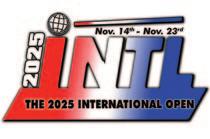





Story by Skip Maloney - AzB Staff / Photos courtesy Erwin Dioniso
“Roadrunner”
“Pink Dagger”
In launching the inaugural USA National Championships last month (July 6-12), the Billiard Congress of America (BCA) added to the list of events serving as qualifiers for the World Pool Association’s (WPA) World Championships. In what the BCA’s CEO, Shane Tyree, called “a significant step forward for American pool and Billiards,” they held qualifying events in Men’s 10-Ball and 9-Ball, Women’s 8-Ball and 10-Ball and Wheelchair 9-Ball and 8-Ball.
“Creating the USA National Championships,” noted Tyree in a press release this past May, “will provide an unprecedented opportunity for our American athletes, as it will establish a clear and prestigious pathway to represent their country and compete at the highest level internationally.”
Held in conjunction with the Billiards Education Foundation’s Junior National Championships at the Oakley Lindsey Center in Quincy, IL, the six-day event featured a number of competitors who were either Junior National Champions previously and/ or currently. The most prominent of these competitors who competed in both were Sofia “Pink Dagger” Mast and Savannah “Roadrunner” Easton.
Easton won the BEF’s 18UGirls divisions of the 10-Ball and 9-Ball competition, as well as the BCA’s Open 8-Ball Championships. Mast was the runner-up to Easton in the BEF 9-Ball and
10-Ball, as well as 5th in 8-ball. In the BCA Open events, Mast was runner-up to Easton’s undefeated run in 8-ball.
The two of them finished 3rd (Easton) and 4th (Mast) in the BCA’s 10-Ball division, won by April Larson, a fivetime BEF Junior National champion and currently, the 14th-ranked female competitor on the Women’s Professional Billiards Association (Easton is 11th on that list and Mast is 13th).
So we’ll begin with the two BCA Women’s events in 8-Ball and 10-Ball and begin that with the event at which they faced each other in the final. The Open 8-ball tournament began on Tuesday, July 8 and finished on Thursday night.
After an opening-round bye, Easton’s trek to the title almost went sideways in the opening round of Stage 1’s double-elimination bracket when Kelly Wyatt put up a double-hill fight. Easton survived the challenge and qualified for single-elimination play with a subsequent 5-2 win over Melissa Helland in the second round. Meanwhile, Mast, also with a bye, opened with a 5-3 win over Nicole Obarowski and shut out Judie Wilson to qualify for single elimination.
Joining Mast and Easton in qualifying for advancement from the winners’ side were April Larson and Ashley Benoit (pronounced Ben-wa). Moving into Stage 2 from the loss side were

Helfrey, Melissa Helland, Wyatt and Emily Duddy.
In the opening round of Stage 2, Easton downed Helfrey 7-2, Helland got by Benoit 7-5, Mast defeated Duddy 5-3 and Larson shut out Wyatt. Easton advanced to the final with a 7-4 over Helland. Mast joined her after eliminating Larson 7-3. Easton claimed the BCA’s first National 8-Ball title with a 9-2 win in the final.
Larson and Helland battle in final for USA National Pool Championships’ first 10-ball title.
The week, in general, was something akin to a homecoming for April Larson, who hasn’t been eligible for BEF Junior Nationals competition for a while now. She’d claimed five BEF Junior National titles (’13 to ’17, inclusive) and was a US team member for seven Junior World Championships. So as she competed in the inaugural US National Pool Championships, she was spending a lot of her spare time, renewing acquaintances with BEF personnel and offering support for the current crop of juniors competing in the 2025 Junior Nationals, in the same building.
Larson battled a previous-generation competitor in the finals of the 19-entrant, 10-Ball US National Pool Championships, Melissa Helland (née Herndon),who’s been a member of our AZBilliards’ player profiles for 25 years now. Her last recorded event win with us came when she claimed title to the California State Women’s 9-Ball Championships in Sept., 2022.
Mast and Easton, it should be noted, were the last two opponents that Larson and Helland faced prior to squaring off in the final.
Larson’s voyage to the title opened with Stage 1 victories over Nicole Obarowski 8-1 and Laura Semko 8-3, which qualified Larson for Stage 2, single-elimination play. Helland’s

qualification for Stage 2 began with an 8-1 victory over Laura Bendikas 8-1 and in the first of their eventual two matches, she sent Easton to the loss side 8-5.
Joining Helland in Stage 2 from the winners’ side of Stage 1 were Ashley Benoit, Mast and April Larson. From the loss side of Stage 1, Easton, Avah Weems, Laura Semko and Kelly Wyatt advanced to Stage 2.
Helland downed Weems 8-5 in the opening round of Stage 2 and in the semifinals, for the second time, she drew Easton, who’d defeated Benoit 8-1 in the opening round. Mast eliminated Semko 8-1 to draw Larson, who’d defeated Wyatt 8-2.
The Larson/Mast match went off first just after noon on Saturday. Larson earned her place in the final with an 8-3 win over Mast. At about 3:30, Helland and Easton got underway. That one almost went double hill, but Helland edged out in front to win it 8-6.
A protracted round of safety play opened the final match off Helland’s break, which seemed to indicate that to win, it was going to be the kind of match that had given Larson her nick-
name (“The Grinder”). They went back and forth for quite a while before it broke open and moved forward to the point where Helland became the first to take aim at the 10-ball. And missed the shot.
It’s always hard to know how or why it happens, really, because in a ballto-ball shot sequence for Helland, there wasn’t any indication that the opening game was anything but ‘one of those things’ that happens to the best of pool players. The grind of that first match carried the expectation of a real wire-to-wire battle ahead of them.
Even the second rack, which Larson broke and ran wasn’t a big deal. Easton and Mast, after all, had started their race to 8 in the finals of the 8-ball event, with Mast winning the first two and Easton winning the next two. Helland dropped two balls breaking rack #3, but lost that one, too. And in rack #4, though Larson would drop two off the break and scratch, Helland got as far as the 8-ball, which she rattled in a hole, giving Larson ball-in-hand to make it 4-0.
Helland won the fifth game, but it would be her one and only. Over the
next four games, three of them featuring dry breaks, Helland just could not gain any momentum. It was one of those situations made famous by Albert King and later, covered by B.B. King and Ray Charles that told a ‘blues’ story about a man who was “Born Under a Bad Sign” and as a result, “if it weren’t for bad luck, (he) wouldn’t have no luck at all.”
Larson scratched during rack #7 and Helland ran to the 7-ball, which rattled in the hole, allowing Larson to make it 6-1. April broke the eighth rack dry, but Helland couldn’t capitalize, which eventually put Larson on the hill.
In the final rack, Helland, who broke, got a chance to add to her rack total, but she scratched shooting at the 9-ball. Larson took the ball-in-hand and finished it to become the first USA Pool Women’s 10-Ball Champion.
Fracasso-Verner, Dominguez battle and defeat Henderson in finals of BCA 9-Ball/10-Ball
They came within a match of facing each other in the finals of the Billiard
Congress of America’s (BCA) Men’s Open 10-Ball Championships and though they both advanced to Stage 2 in the Open 9-Ball Championships, they never got close to being matched up. What the West Coast’s Oscar Dominguez and the East Coast’s Luka Fracasso-Verner had in common when they claimed the 9-Ball and 10-titles, respectively, last week (July 6-10) was the competitor they faced in the finals of the two events, Iowa’s Sam Henderson.
As a result, Henderson walked away with more money being the runner-up twice than either of the two winners brought home separately. It has added to Henderson’s 2025 reported earnings in what is already, in July, his best recorded earnings year. It’s been a steady ‘raise in pay’ that began when he recorded his 17th place finish at the Midwest Billiards and Cue Expo’s 9-ball event in 2021 and before this event, chalked up a win at the Ultimate Pool USA’s Arizona Open Shootout this past February.
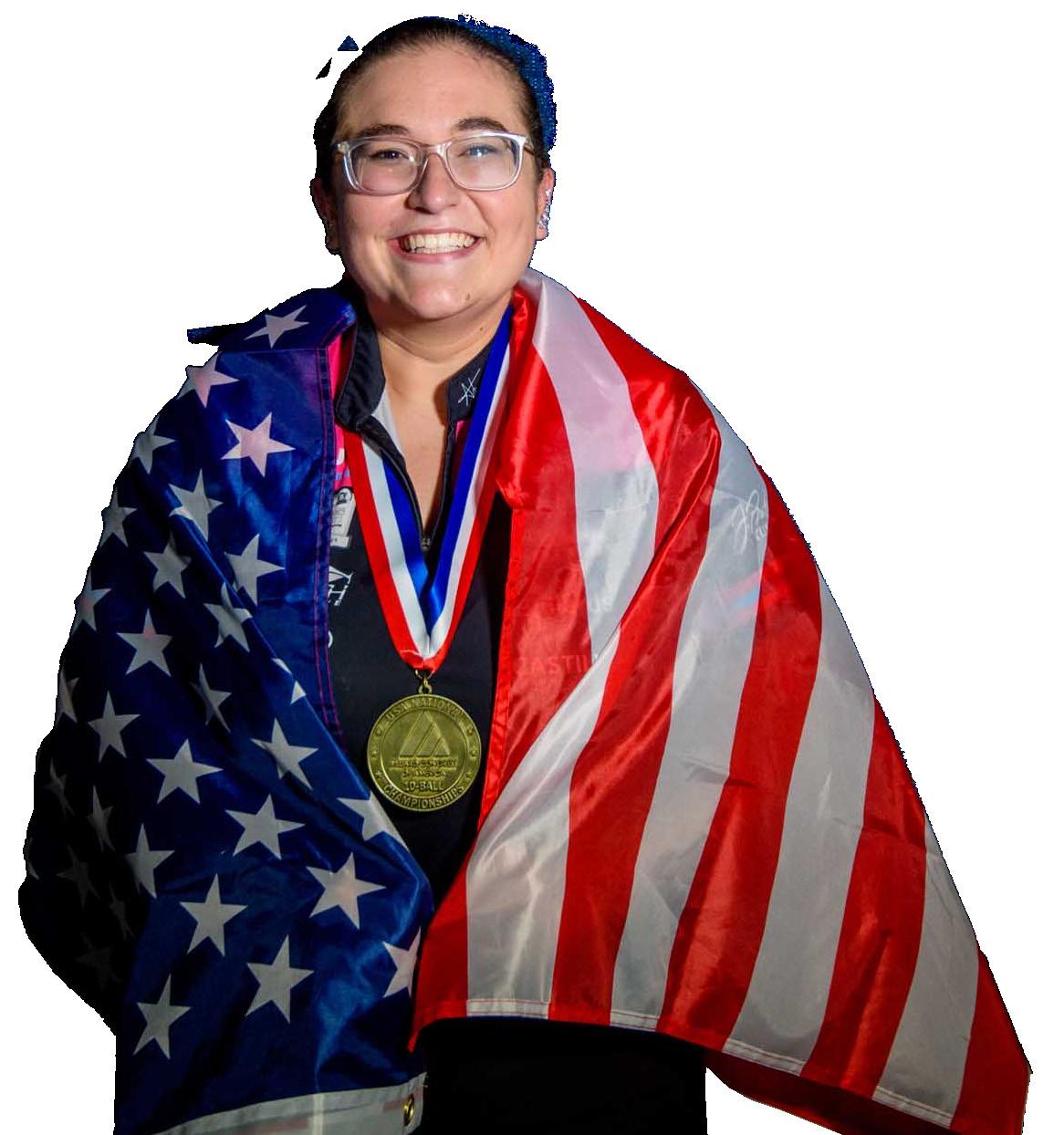
Not to diminish the accomplishments of the two competitors who’ve become winners of the BCA’s two inaugural, Men’s USA National Pool Championships, but their recorded history more or less speaks for itself, and the two victories just check another ‘box’ in their recorded history.
The 26-entrant Open 9-Ball event went off first and began eight days ago (Sun., July 6) with Dominguez and Fracasso-Verner, advancing through the field on the winners’ side of the Stage 1, double-elimination bracket. In the meantime, Henderson, who’d been defeated in the last Stage 1 qualifying round by Hunter Lombardo (9-4), won the single match he needed on the loss side (a 9-2
win over Max Eberle) and advanced from that side to the single-elimination Stage 2.
Fracasso-Verner won the two matches he needed for advancement to Stage 2 by an aggregate score of 18-1, shutting out Garrett Vaughn and giving up the 1 to Damian Pongpanik. Dominguez advanced from the winners’ side with a 19-2 aggregate score, shutting out Tony Mendoza and giving up the 2 to Payne McBride. Joining them in advancing from the winners’ side were Ricky Evans and Hunter Lombardo.
From the loss side, Henderson and Pongpanik won the single match they needed to join Stage 2; Henderson over Eberle 9-2 and Pongpanik 9-4 over Grayson Vaughn.
Fracasso-Verner didn’t make it out of the four-match, opening-round of Stage 2, won by Henderson 9-6. Henderson advanced to take on Pongpanik in the semifinals, defeating him 9-5 and advancing to the final. Dominguez opened his Stage 2 campaign with a 9-4 win over Hayden Ernst and ran into some trouble in his semifinal match against Ricky Evans, who’d survived a double-hill opening round versus Payne McBride. Dominguez had to survive his semifinal against Evans and did, to join Henderson in the final. Dominguez chalked up a strong 11-5 win over Henderson in the final to claim the inaugural 9-Ball National Championship.
Finalists in 9-ball match up in semifinals of 10-Ball Open Championships
But for the ‘random draw’ going into Stage 2 of the 10-Ball event, which began (Wed., July 9) a day after they’d met in the finals of the 9-Ball event, they might have vied for the title a second time. From the opening round of single-elimination, it became impossible for Henderson and Dominguez to compete in the finals for a second title. It set up a notable confluence of



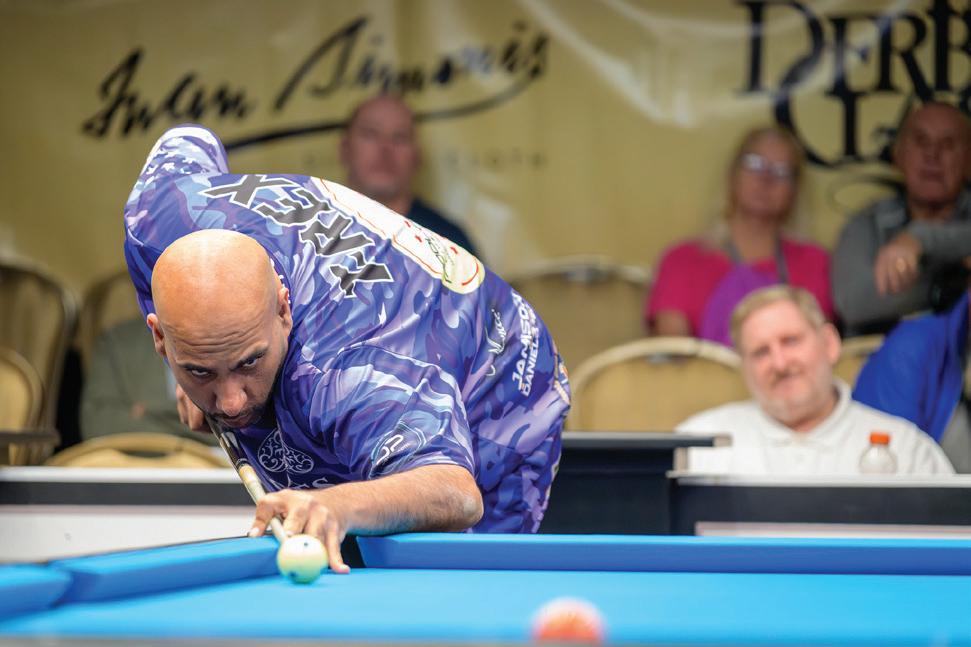



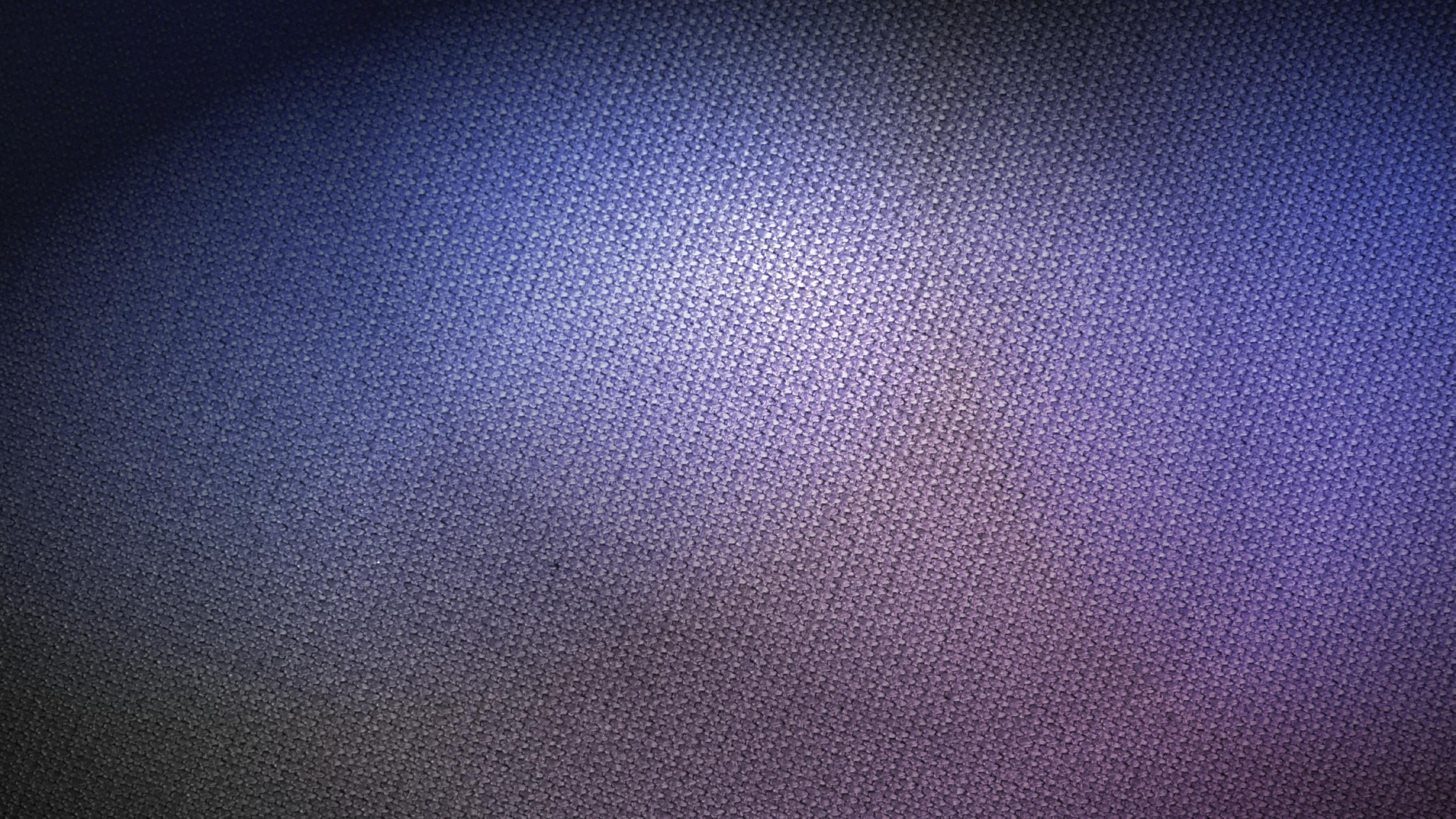
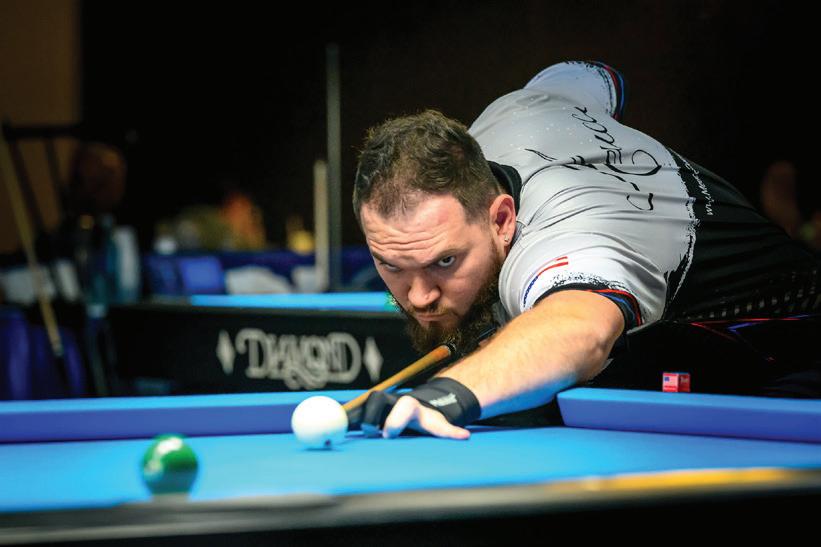






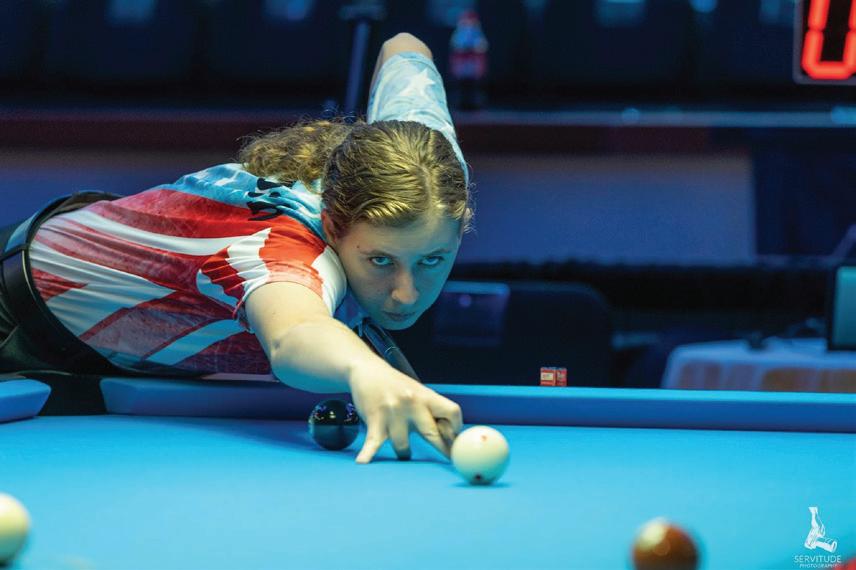


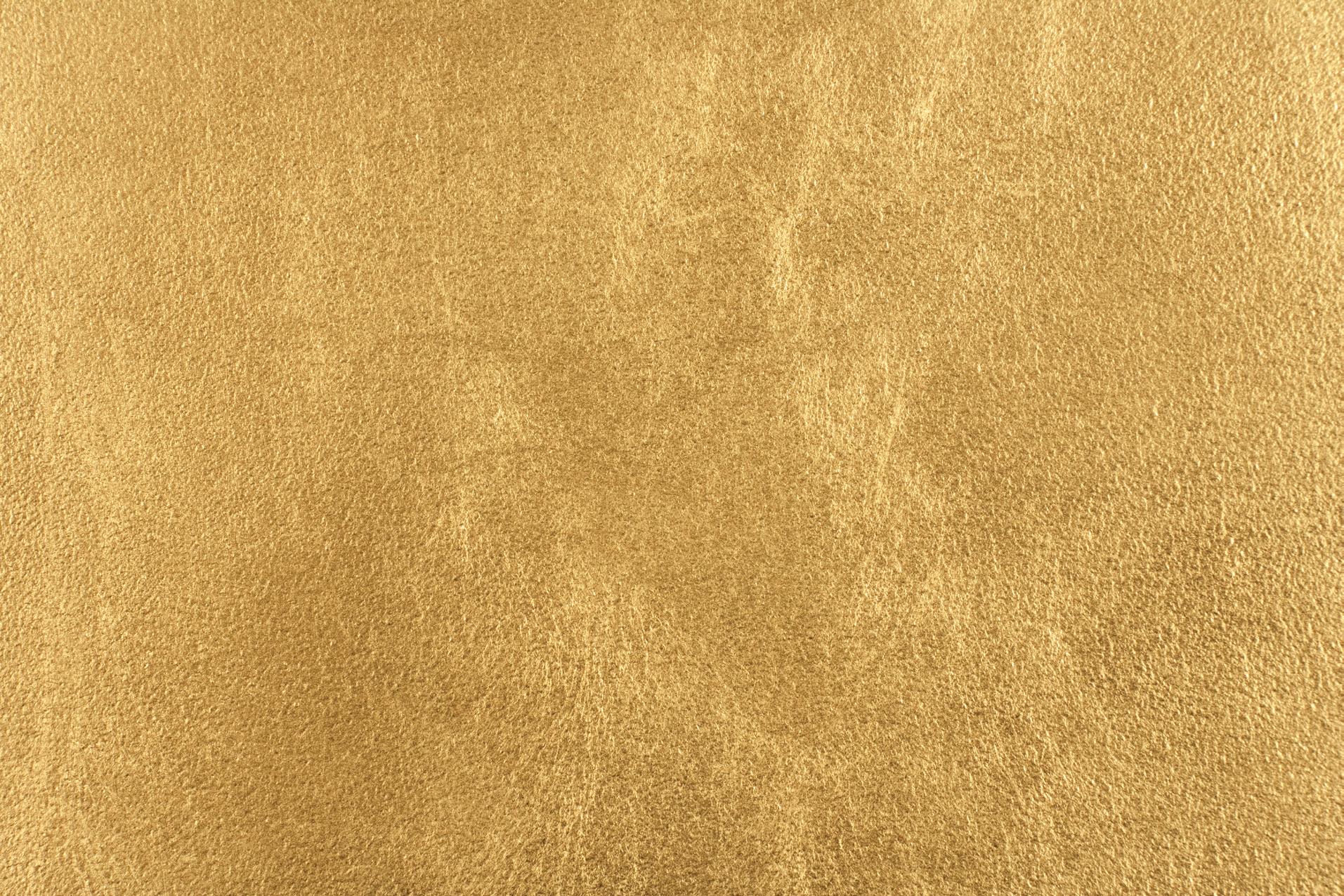








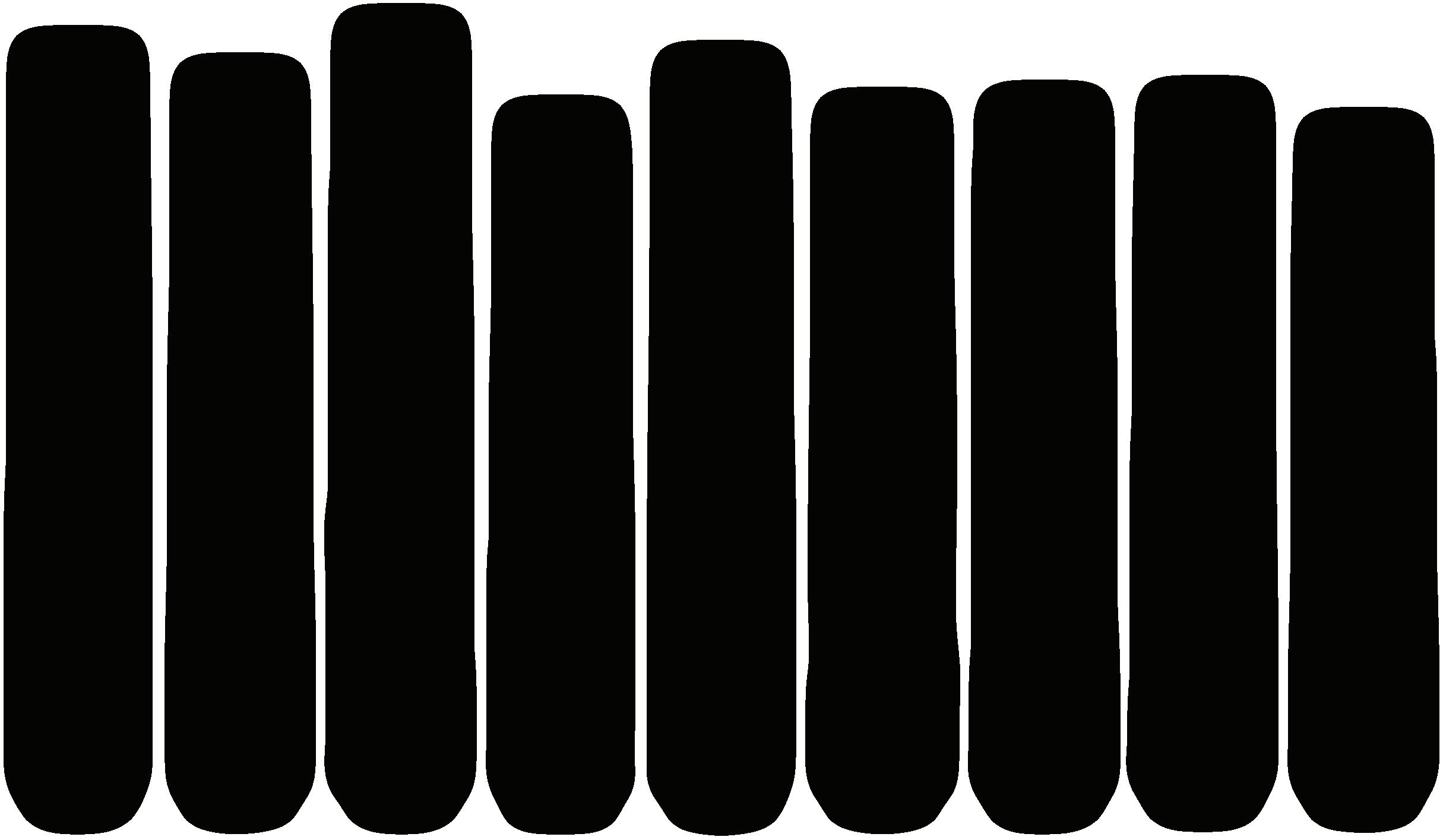
events that allowed Fracasso-Verner to avoid Stage 2 competition against the competitor who’d eliminated him in the opening round of the 9-ball’s Stage 2. In effect, the draw ‘ Fracasso-Verner’s potential Hender son ‘problem’ to Dominguez, which played out in the 10-ball semifinals.
Henderson qualified for 10-Ball’s Stage 2 with an opening-round shut out of James Satterfield, an 8-5 win over Garrett Vaughn and the elimi nation of Jamison Gall 8-2. Maintain ing the possibility for a repeat of the 9-Ball final in the 10-Ball proceedings, Dominguez advanced from the win ners’ side of the Stage 1 bracket with victories over Robert Orta and Bren dan Green (both 8-2) and survived a double-hill bout against Justin Berg man. Also advancing to Stage 2 from the winners’ side of Stage 1 (as they’d done in the 9-ball event) were Hunter Lombardo and Fracasso-Verner, who advanced on the strength of a 24-4 aggregate score against Quinn Olesky (0), Ray Pelletier (1) and Ricky Evans (3).
Evans, who’d advanced to Stage 2 of the 9-Ball event from the winners’ side, got there this time from the loss side, winning his one and only lossside match 8-6 over Eddie Vonderau. Joining him from the loss side were Carl Morgan, Max Eberle and Jamison Gall.
Five of the Final Eight in 9-Ball made it to the 10-Ball’s Final Eight; Domin guez, Henderson, Fracasso-Verner, Hunter Lombardo and Ricky Evans.
Max Eberle put up a spirited, dou ble-hill fight against Henderson in the opening round of Stage 2, but Hender son prevailed to set up the rematch of the 9-ball final versus Dominguez, who’d eliminated Jamison Gall 8-5 to arrive. Evans, who’d had to fight off Payne McBride, double hill, in the opening round of the 9-ball’s Stage 2, had to do the same thing versus Lom
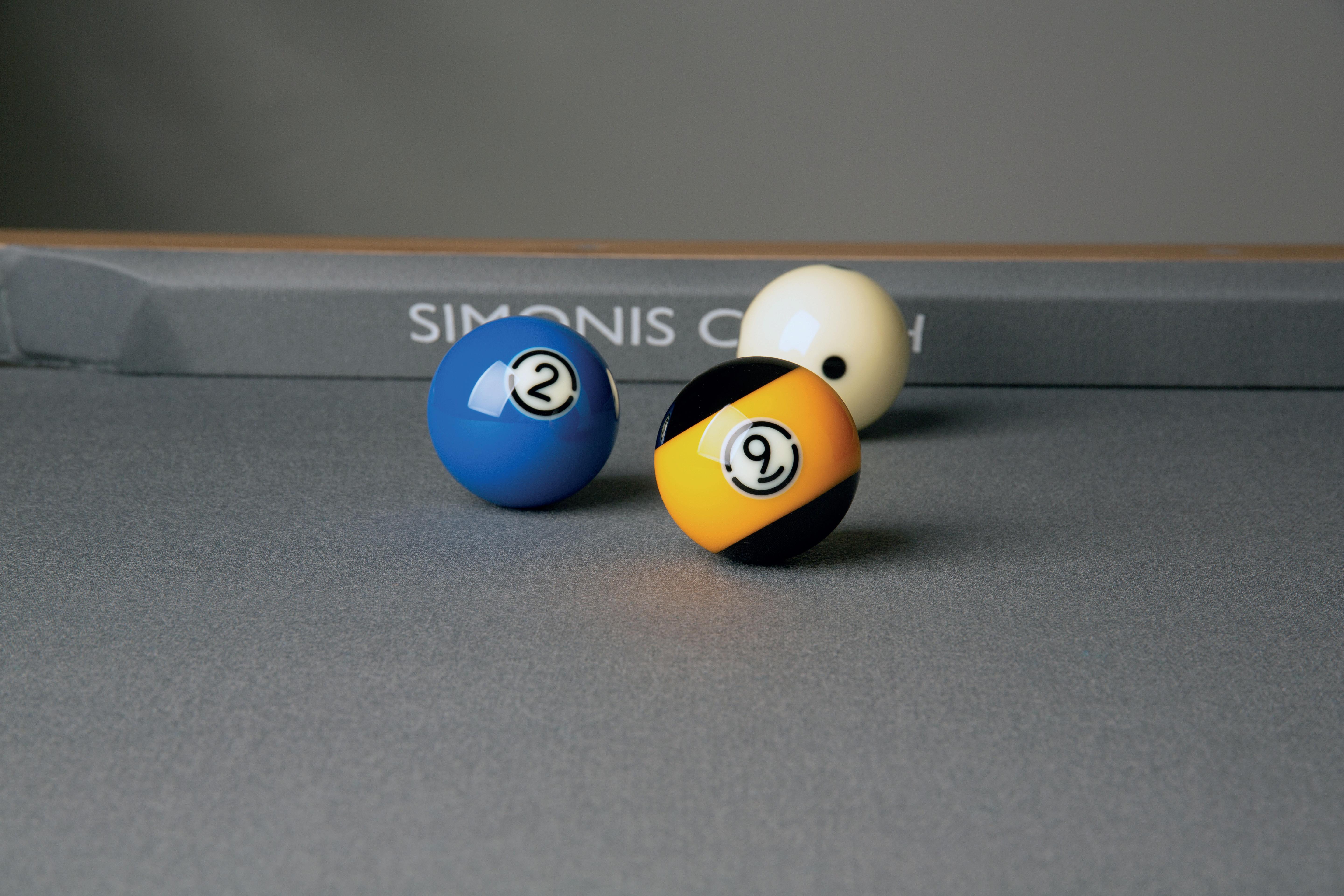










By Mary Kenniston
Side Pockets in Blue Springs, KS hosted the Ultimate Pool USA’s Kansas City Open this past weekend. Featuring thirty Diamond Pro Am tables, multiple eight foot HD big screens and more than sixty dining/drinking seating table options in 16,000 square feet of entertainment space, it is one of the better venues in the midwest.
Featuring five events – the Shootout, Mixed Pairs, the Open, the Women’s Open and the Junior Open – the tournament began on July 16th with a barbecue, a raffle for a Taylor Swift guitar and a charity poker tournament supporting Stephanie Mangano who is battling colon cancer.
Many familiar names dotted the charts including BCA Hall of Famer Johnny Archer, three-time Ultimate Pool USA champ Tom Cousins, Boston Junior Open champ Harrison Leinen, Iowa Open titlist Tom Cousins, Boston Open winner Craig Waddingham, Dennis Hatch, Corey Deuel, Sky Woodward, Justin Bergman, David Matlock,
Joven Bustamante, Gary Lutman, Manny Perez, Mitch Ellerman and Kevin Guimond. In addition, Boston Women’s Open champ Emily Duddy and runner-up Ashley Benoit, Iowa Mixed Pairs runner-up Tarah Connor, Sofia Mast, Tina Larsen and Janet Atwell joined the fray.
Using seven foot tables with International Eight Ball Rules, play opened with the 24 player Kansas City Shootout.
Playing down to the final four, Joven Bustamante edged out Craig Waddingham and Justin Bergman cruised to victory over Shane Thompson.
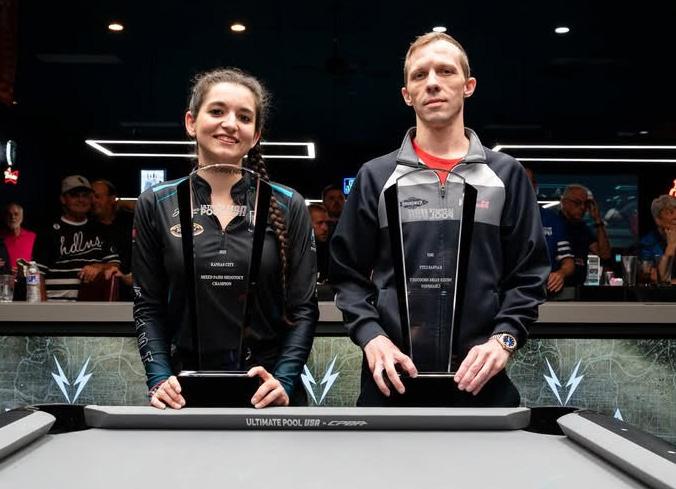
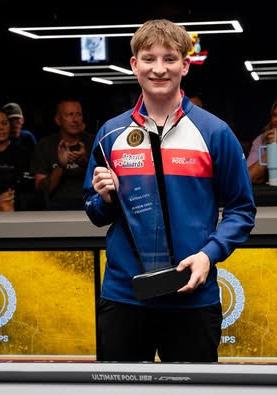
In his previous performance in the Iowa Open finals, he came up short but this time, Bustamante claimed his first Ultimate Pool USA title as he became the Kansas City Shootout champion after defeating the always tough Justin Bergman 6-2.
This was followed by the Mixed Pairs Championship. Whittled down to the semi-finals, teams included Iowa Open runners-up Tom Cousins-Tarah Connor, Justin Bergman-Ashley Benoit, Sky Woodward-Janet Atwell and David Matlock-Emily Duddy.
With both matches rallying from behind, Bergman-Benoit eliminated Cousins-Connor and Wood-
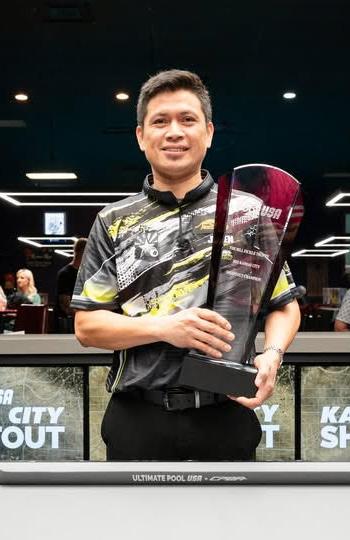
ward-Atwell knocked out Matlock-Duddy.
In a thrilling finale, Bergman missed the eight for the title giving Woodward-Atwell just 22 seconds to force a 6-ball shootout – they came just two balls short making Bergman and Benoit the Kansas City Mixed Pairs Champions.
Sunday was a big day as the last three events finished up.
The Kansas City Women’s Open had a full field of 64 players. In a rematch of the Boston Women’s Open finals, Ashley Benoit and Emily Duddy lagged for the break once more. Capturing her second title of the weekend, Benoit exacted her revenge in a 6-1 thrashing of Duddy.
Holly Figueroa defeated Renee Young 4-2 to take the Women’s Open Second Chance title.
The Kansas City Junior Open Championship drew 32 players and in his final appearance as a junior, Kaden Herrbach won his second consecutive title with a commanding 6-2 win over Brady Deverna.
Henry Cha eked out a 5-4 over Cory Data in the Junior Open Second Chance event.
The final event of the weekend saw the close of Kansas City Open. This tournament drew a whopping 192 players and when the smoke had cleared, it was Ricky Evans who claimed the title with an 8-4 victory over Joe Prince.
It’s hard to top an event like this but a special announcement was made during the tournament that the legendary David Matlock is the inaugural Ultimate Pool USA Hall of Fame inductee. As written on the Ultimate Pool USA page, it reads “A trailblazer, champion, and legend of the sport, David’s contributions to the game have set the standard for excellence in American pool.”
Congratulations to David and all the newly minted champs!
Ultimate Pool USA would like to thank their sponsors. They include Ozone Billiards, Brunswick Billiards, Viking Cues, Valhalla, Smart Rack, Hero Tips, CPBA, Ozone Billiards, Jam Up, Hotel Planner and the Fort Worth Billiards Superstore of Fort Worth, TX.

After a few months off, the Ultimate Pool USA National Championships are next! It will be held at Harrah’s Cherokee Casino Resort in Cherokee, NC. Dates are November 13th-15th. Sure hope to see you there!
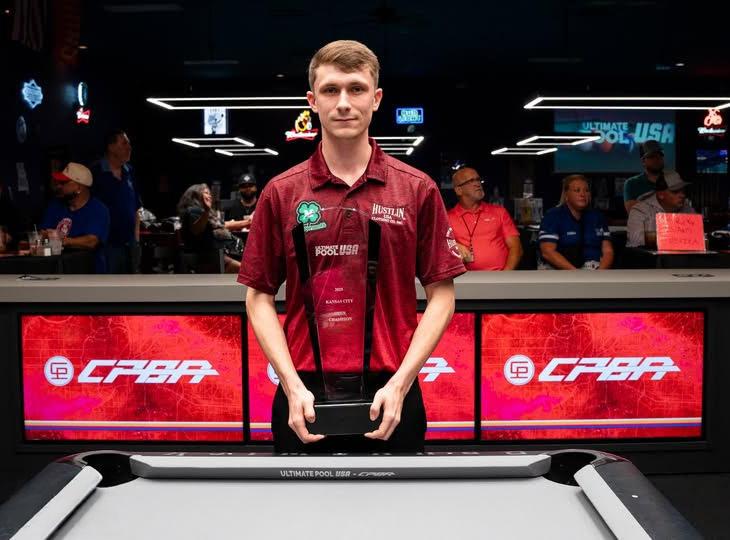
Article by Skip Maloney - AzB Staff / Photos courtesy Erwin Dionisio
You think pool is hard, with all that has to be learned about shot selection, approach, stance, stroke, and cue-ball control? Try doing it in a wheelchair.
Everything that the standing-up, walk-around-the-table guys and gals have to learn pretty much goes out the window. Competitors in a wheelchair have to learn everything from a literal and figurative different angle.
“Like anybody else, really,” said Shane Tyree, Billiard Congress of America’s CEO, “they have to adapt.”
“Their fundamentals are different,” he added. “They have to adapt to sitting, the angle of their stick and their elbows not being as straight as they should be. They have to do what works best for them.
“Even the strategy is different. Able-bodied people will try, for example, to play for position from the center of the table, while wheelchair competitors tend to play position based on their proximity to the rails.”
This discourse regarding aspects of wheelchair competition came about as the BCA’s National Wheelchair Championships in 8-ball and 9-ball got underway (and concluded) at the Oakley Lindsay Center in Quincy, IL this past week (July 7-8 for 8-ball and July 9-10 for 9-ball). Both Championships were won by West Virginia’s Derrick Bonds, who, at 30, was competing in his first national wheelchair event, which drew 16 entrants.
Lest there be any doubt as whether ‘wheelchair’ competitors can compete on a level playing field against
competitors not so confined, Bonds came to Quincy, IL having won West Virginia Moose Lodge’s 8-Ball Championships, twice (’17/’19) and claimed title to the Billiard Congress of America’s 10-Ball Ohio State Championships in 2022, both Open events. In addition to winning this past week’s 8-Ball Wheelchair event, Bonds had to contend with a competitor who’s earned ‘legend’ status as one of the
better-known wheelchair competitors of all time, Harrison OH’s Charlie Hans, who’s chalked up 13 wheelchair titles, including 11 APA Wheelchair Championship titles. He is currently the two-time defending champion of that annual event.
Bonds faced Hans three times this week, once in the 9-ball competition and twice in 8-ball, the chronological
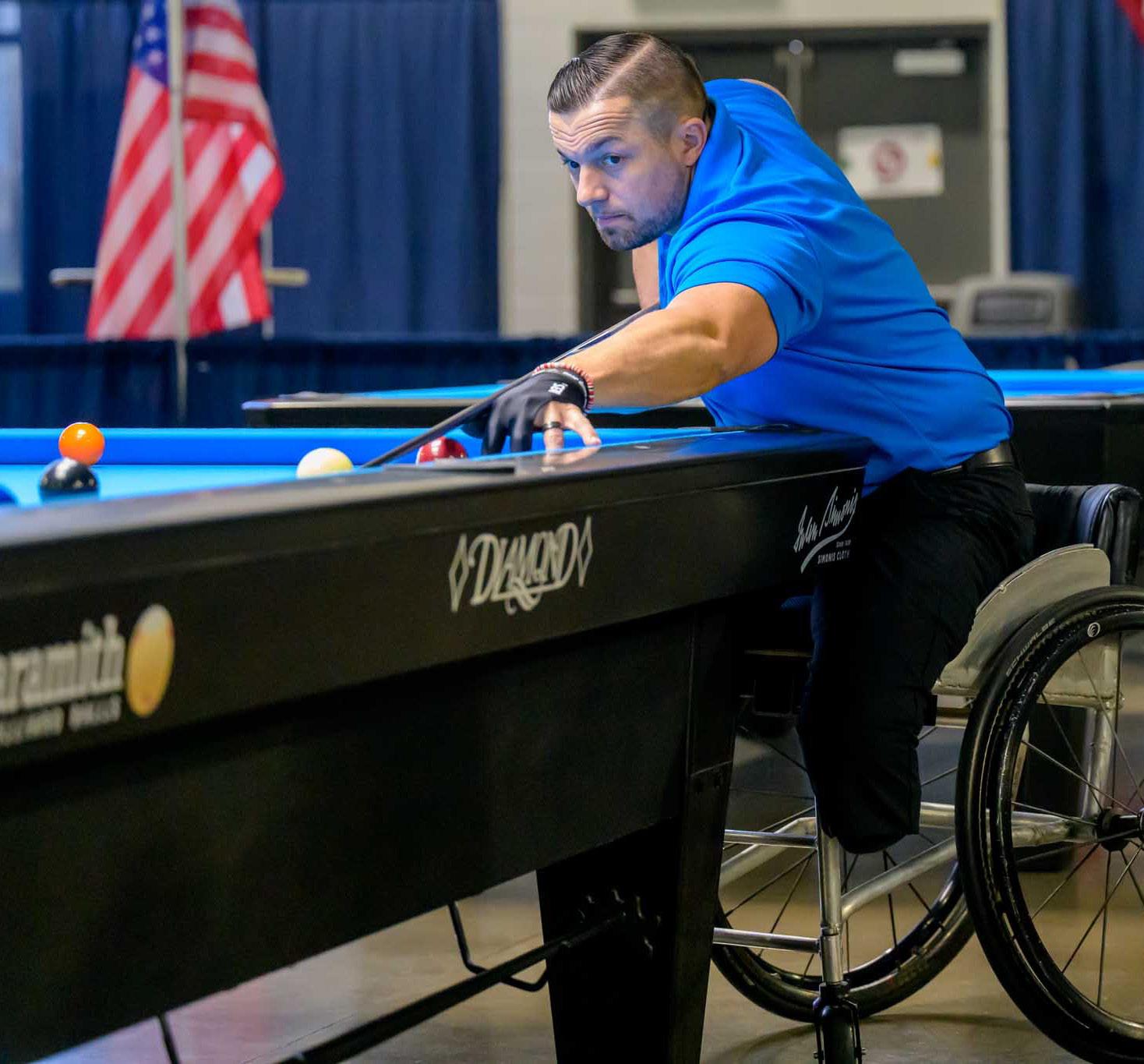
first of the two wheelchair events. In that 8-ball event, they met the first time in the second round of Stage 1, double-elimination play and again in the finals of the three-match Stage 2.
Bonds won all three of the matches he needed to win for qualification to Stage 2. After opening against Emede Reyes, Bonds ran right into Hans, who’d opened with a double-hill win over Bill Larson, before Bonds shut him out, as well. The third shutout over Jeffrey Dolezal put Bonds into the four-player Stage 2. Hans, in the meantime, moved to the loss side of the double-elimination Stage 1 bracket and started his trek to the finals by shutting out Brenda Caves. He gave up two racks in his next match against Charles Interrante and then shut out Dan Hall to qualify for the Stage 2 proceedings.
In the opening-round of the single-elimination Stage 2, Bonds, who’d qualified from the winners’ side of Stage 1, met Bret Clifton, who’d qualified from the loss side. Similarly, Hans, who’d qualified from the loss side, picked up the other Stage 1 competitor who’d qualified from the winners’ side, Keith Hill.
Bonds defeated Clifton 5-2, while Hans eliminated Hill 5-3. Bonds, though he’d fall behind initially (1-3) in the final, came back to win five straight and claim his first National wheelchair title with a 6-3 victory over Hans.
Bonds and Hans meet up a ‘memorable’ once in 9-ball championships
Twenty hours after winning his first national wheelchair title by defeating Hans in the 8-ball final, Bonds greeted him a third time, in the opening round of the 9-Ball Championships. They came within a match of facing each other a fourth time, which would have occurred in the opening round of the 8-ball event’s Stage 2.
Presumably ‘on to each other’ when they shook hands and came out
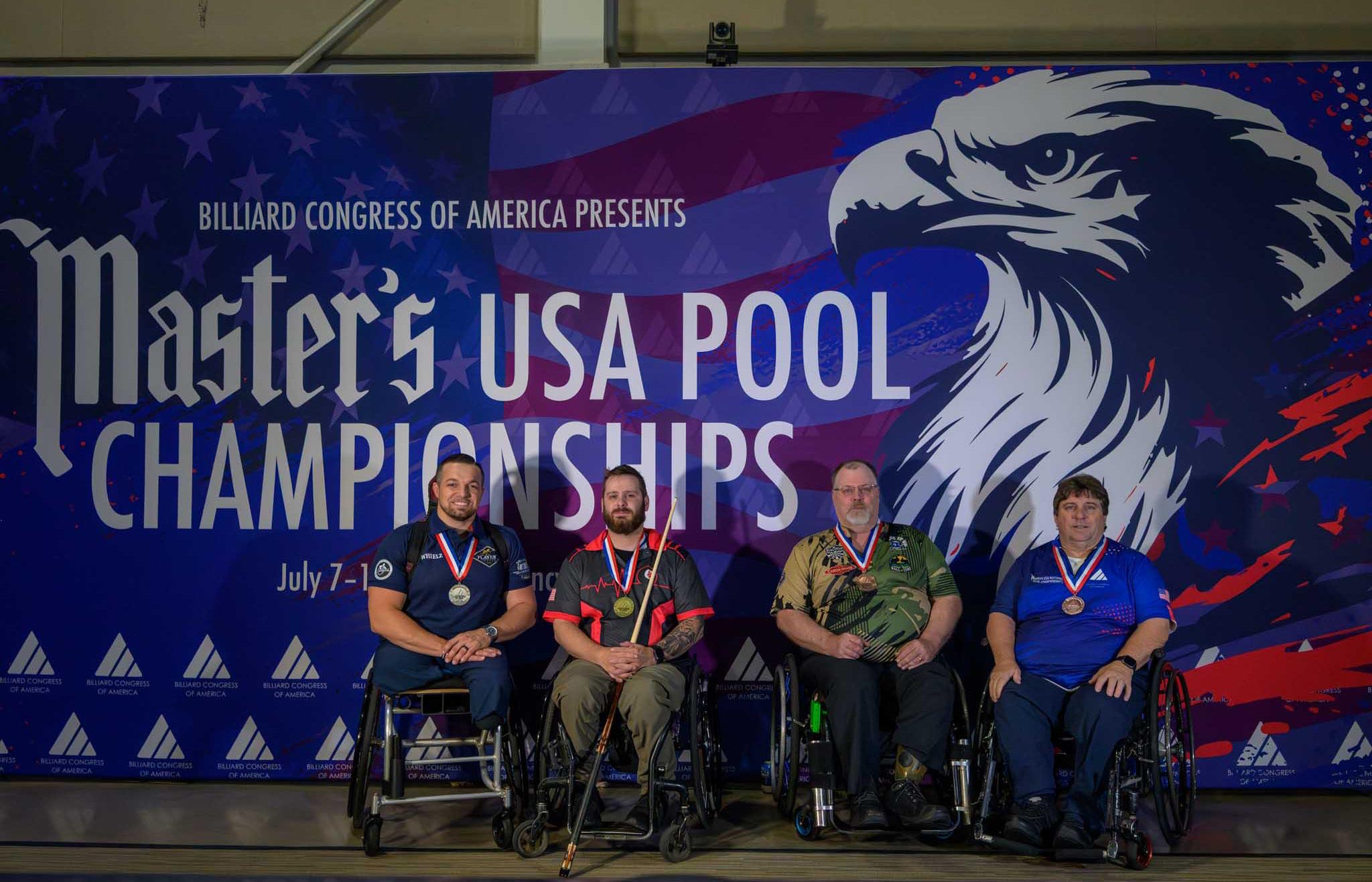
shooting 9-ball, Bonds and Hans battled back and forth to double hill, before Bonds prevailed. This time, though, Bonds advanced to pick up the competitor he’d faced in the opening round of the 8-ball event’s Stage 2, Bret Clifton. Clifton and Bonds played double-hill ball until Clifton prevailed, sending Bonds over for what might have been a rematch versus Hans on the loss side. Clifton and Jeffrey Dolezal advanced to Stage 2 from the winners’ side.
On the loss-side bracket of 9-ball’s Stage 1, Bonds won three to qualify for Stage 2, downing Dan Hall 6-2, Mark Jones 6-1 and then surviving another double-hill battle, this time against Christopher Parnell. Hans opened up his loss-side campaign by shutting out Emede Reyes and eliminating Charles Interrante 6-3. In the final qualifying round, Hans faced Bill Larson, who defeated him 6-1, ending any anticipation for a Bonds/Hans rematch in one of the Stage 2 semifinals.
Bonds downed the winners’ side-qualified competitor Dolezal 7-1, as Clifton was busy eliminating Larson 7-2. As he’d done in the semifinals of the 8-ball competition against him, Bonds claimed his second national wheel-
chair title with a 7-3 victory over Clifton.
“At some point, you just have to free stroke,” Bonds told Shane Hulsey, sports reporter for the Muddy River News in Quincy, IL in a Wednesday report. “You just have to go for it, and it either works or it doesn’t. It happened to work in my favor. I just kind of switched the momentum and held onto it as long as I could, and it worked out.”
Bond, according to Hulsey, had adopted that free-and-easy attitude from the beginning, when, at the age of 18, after an accident at a Motocross event had put him in a wheelchair, his Dad signed him up to play in a local pool tournament, at which he finished as runner-up. Six years later, he would begin the competitive play that would eventually bring him to this past weekend’s event.
“With big events like this,” Bonds told Hulsey, “I try really hard not to have expectations. I come in, play my game and hope good things happen.”
Good pool advice, in or out of a wheelchair, and it earned him a national title.
“It’s pretty sweet,” Bonds said. “I’m going to try to be back next year.”
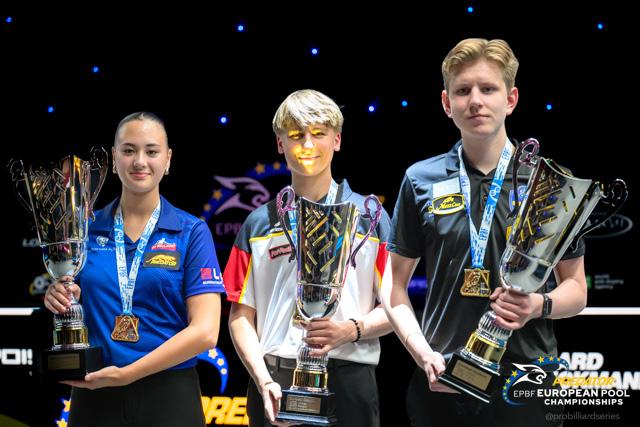
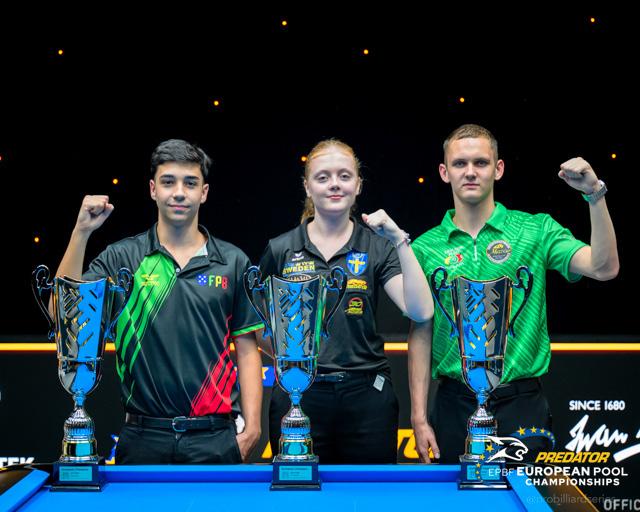
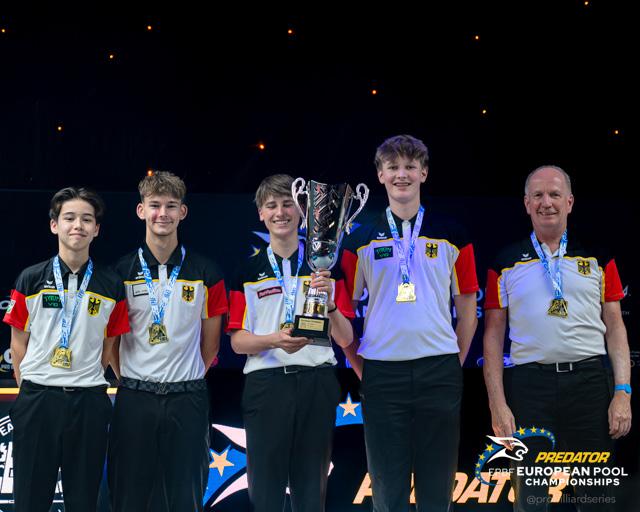
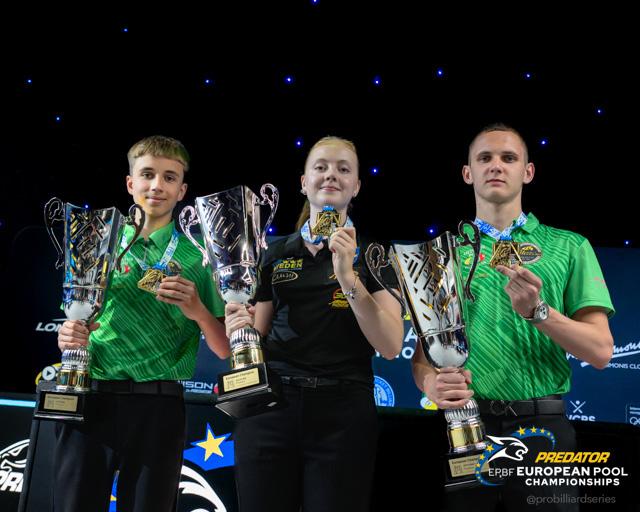
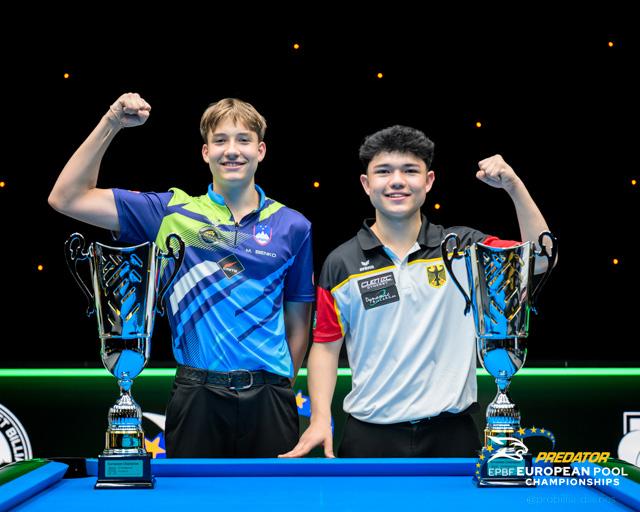
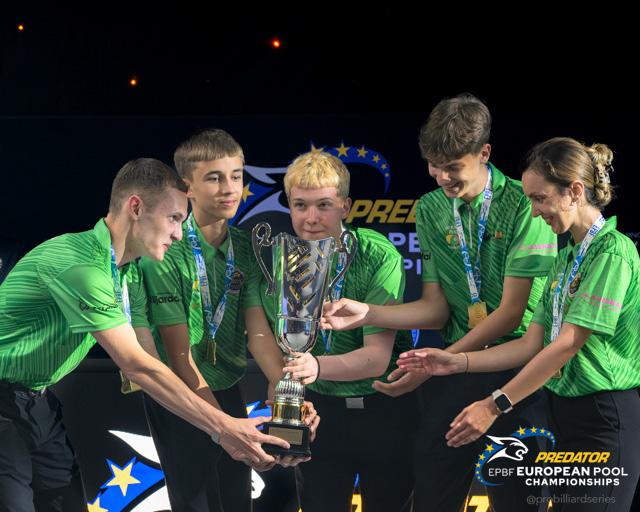
Five-time US Open Champion. Three-time World Champion. One of the greatest to ever pick up a cue—Earl “The Pearl” Strickland is ready to make history once again.
This August, the legend returns to the World Nineball Tour stage, taking on two of the biggest events on the calendar: the Florida Open and the US Open Pool Championship.
Will you be there to witness the magic?
First Stop: The Florida Open Caribe Royale Resort, Orlando 5–10 August 2025
Earl joins a stacked field of 256 elite players—including Fedor Gorst, Shane Van Boening, and Skyler Woodward—at the Florida Open, with fans flying in from across the country to catch the action.
Then It’s Off to Atlantic City: The US Open Pool Championship
Harrah’s Resort, Atlantic City 25–30 August 2025
The US Open is Strickland’s playground—and this year, he returns to Harrah’s on a mission. With five US Open titles to his name, can The Pearl push for one more?
This August, Earl Strickland cruises across the East Coast to chase glory, fire up the crowd, and remind the world why he’s one of the all-time greats.
Don’t miss your chance to see a true icon up close, live, and chasing history.
Tickets and rooms are going fast—secure yours now.

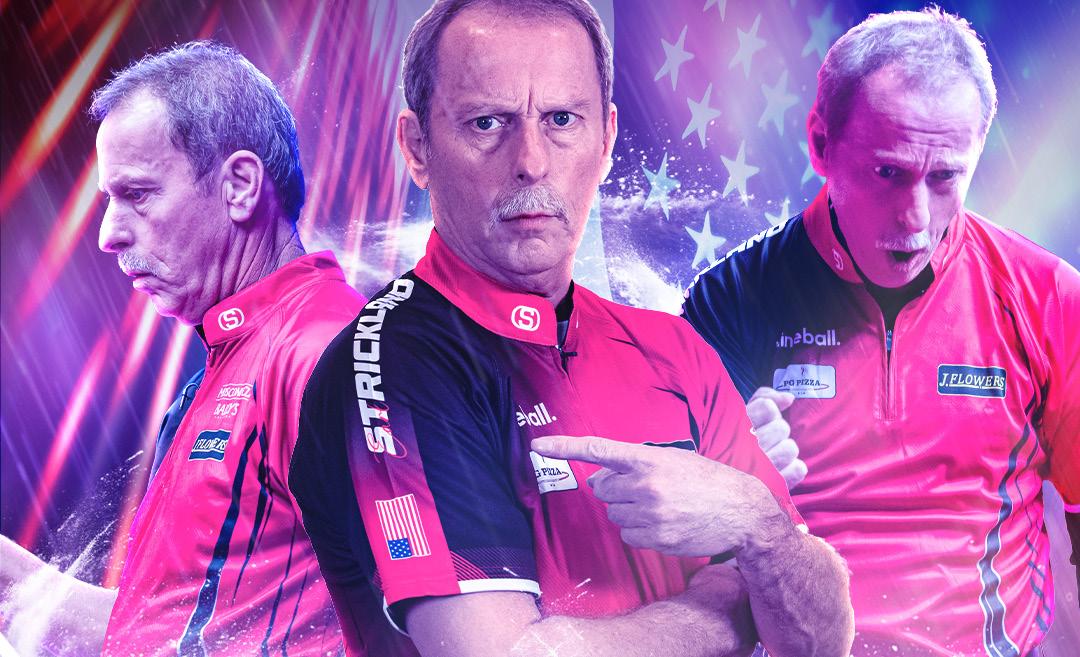
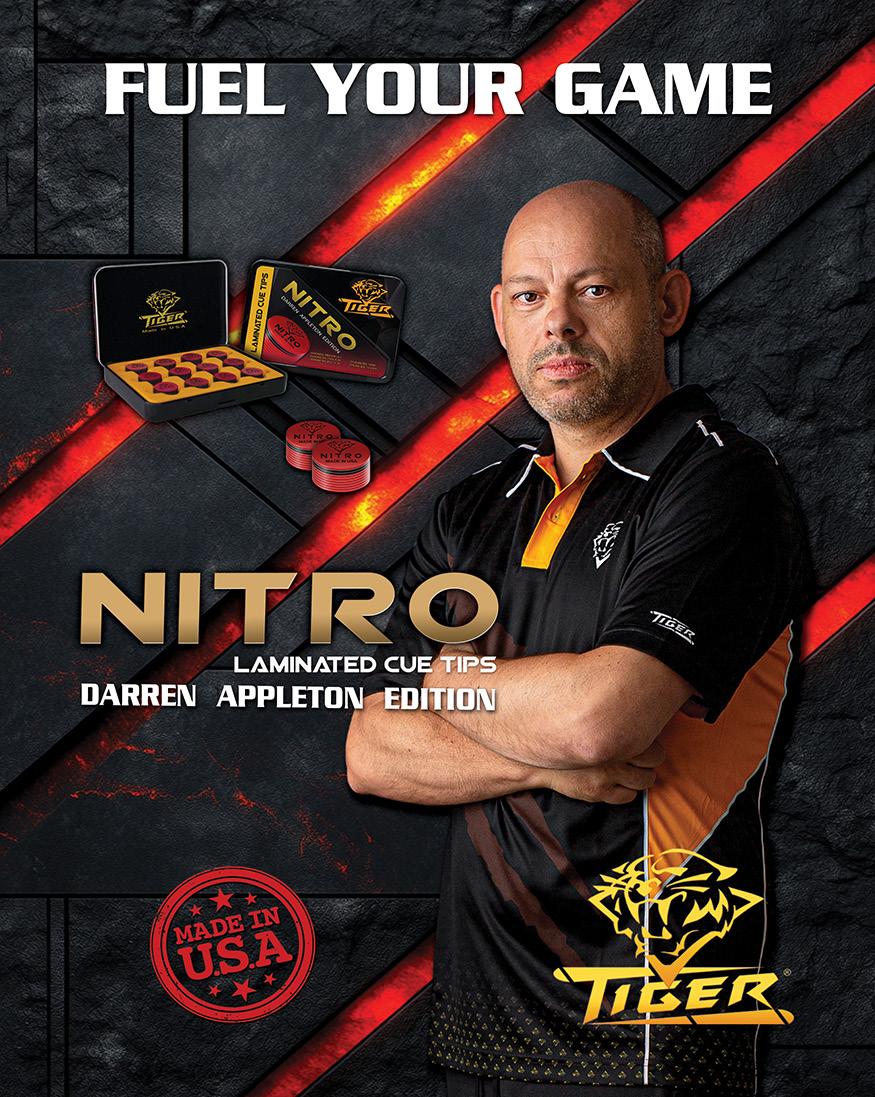
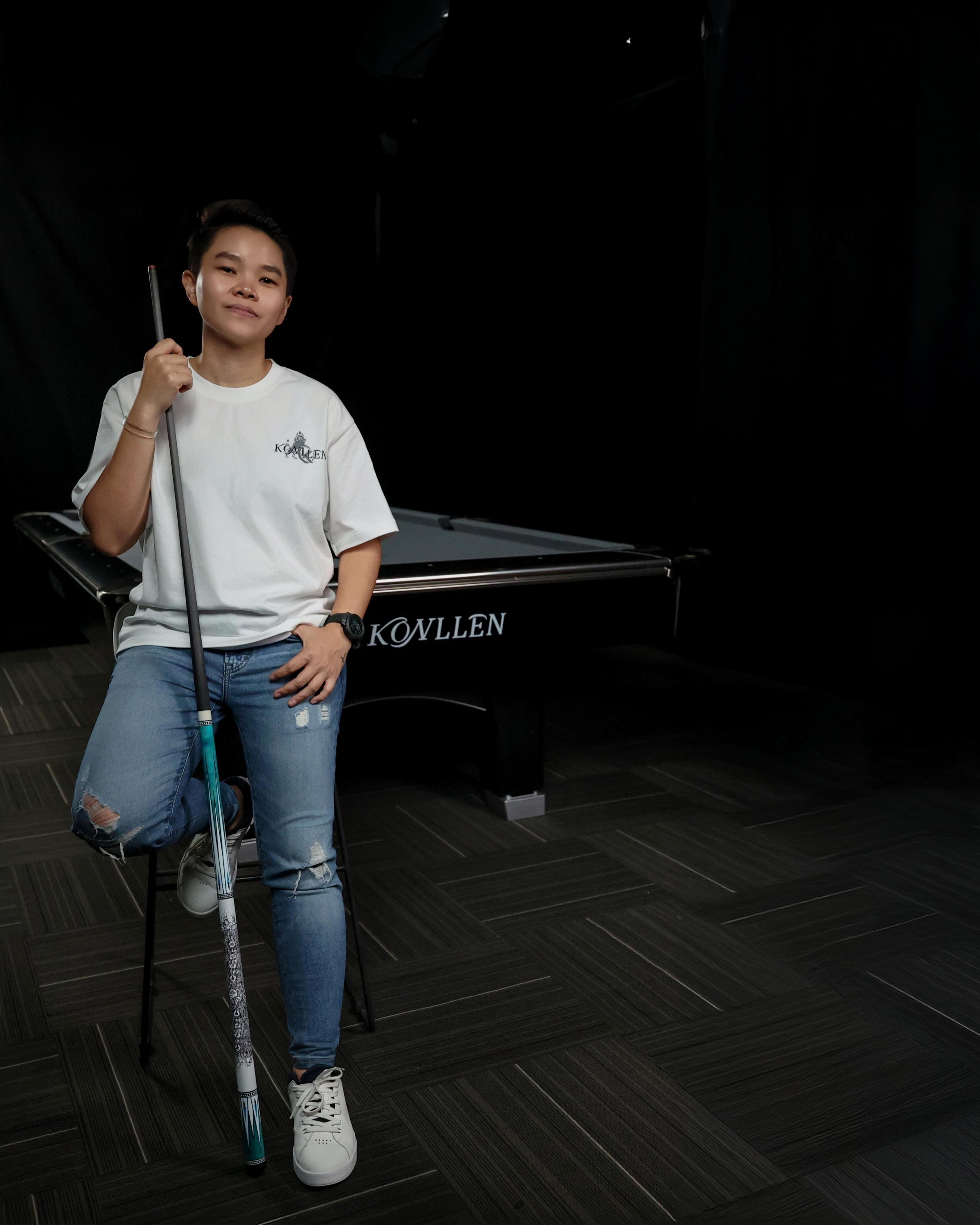
Under the quiet spotlight of the billiards world, where precision meets poetry and every stroke is a silent symphony of intent, a new chapter has been written.
Annita Kan Jaya, the rising star from Indonesia, has officially joined hands with KONLLEN Billiard Co., Ltd., forging a partnership that promises not only performance—but possibility.
This month, the agreement was sealed—a meeting not merely of brand and player, but of vision and purpose. Annita, known for her sharp focus and graceful resilience at the table, will now wield KONLLEN’s master-crafted pool cues, cue cases, and precision-engineered extensions, tools that speak the language of champions.
For KONLLEN, this is more than an endorsement. It is a continuation of a journey that began in 1993, when the brand first took its place in the world—a spark ignited by passion for cue sports, and soon fanned into a flame of innovation. Now a USA-registered company, KONLLEN has become a trusted companion to professionals across continents, offering not just equipment— but excellence, purpose, and promise.
Annita’s voice, calm and resolute, carried a note of gratitude and determination during the signing:
“With KONLLEN, I feel empowered to play my truest game. Their craftsmanship lets me focus— completely and fearlessly—on what I came here to do.”
In her hands, the cue is no longer merely wood and carbon—it becomes an extension of thought, of instinct, of will. KONLLEN’s dedication to detail, from the balance of the shaft to the artistry of the inlay, transforms every break, every bank, into a quiet triumph of design meeting discipline.
This union is not happenstance. It is the deliberate weaving of two narratives—Annita’s ascension through the competitive ranks, and KONLLEN’s ceaseless pursuit of perfection. Together, they step into a future lit by ambition and carved by dedication.
As KONLLEN continues to open doors for professionals across the globe, it remains true to its founding spirit: to give players not just a cue—but a voice, a path, and the finest tools to chase greatness.
And for Annita, the road ahead is no longer just a journey. It is a stage—and her story, with KONLLEN by her side, has only just begun.
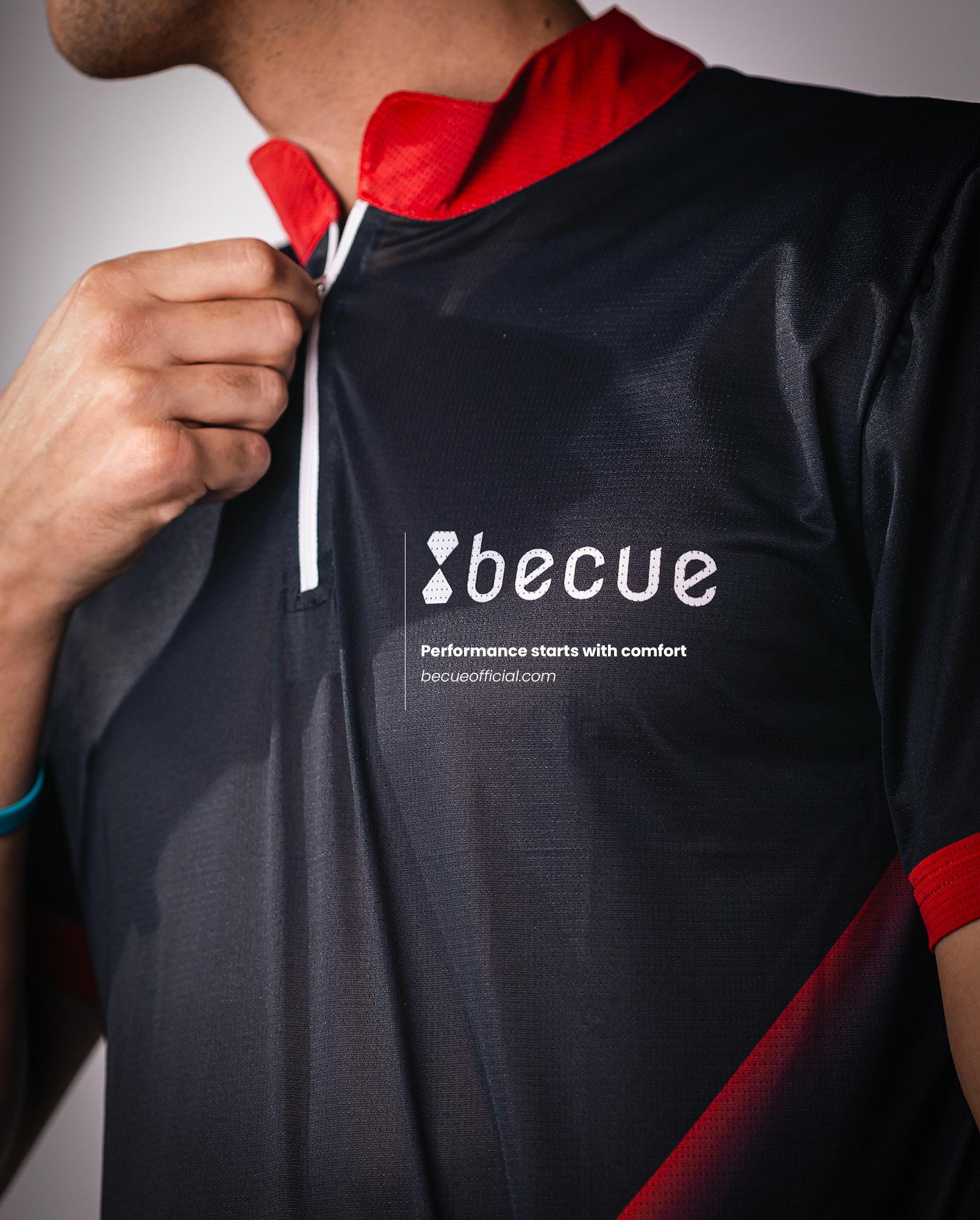
Jul 02 - Jul 06
Oneida World Women's 8-Ball Championship
Oneida Casino Green Bay, WIsconsin
1 Jasmin Ouschan $30,000
2 Chezka Centeno $18,600
3 Chia Hua Chen $13,000
3 Marharyta Fefilava $13,000
5 Kristina Tkach $8,000
5 Kristina Zlateva $8,000
5 Meng-Hsia Hung $8,000
5 Tzu-Chien Wei $8,000
9 Ana Gradisnik $4,000
9 Chieh-Yu Chou $4,000
9 Chihiro Kawahara $4,000
9 Kelly Fisher $4,000
9 Pia Filler $4,000
9 Samia Konishi $4,000
9 Seo Seoa $4,000
9 Shui Ching Chiang $4,000
17 April Larson $1,500
17 Ashley Benoit $1,500
17 Jordan Helfrey $1,500
17 Nguyen Bich Tram $1,500
17 Nina Torvund $1,500
17 Sofia Mast $1,500
17 Wan-Ling Wang $1,500
17 Yuki Hiraguchi $1,500
Jul 03 - Jul 06
Universal x CPBA 99 Open 2025
99 Billiards Club
Hanoi,
1 Alexis Ferrer $16,000
2 Yu-Lung Chang $6,000
3 Kun Lin Wu $2,000
3 Xi He Zhu $2,000
5 AJ Manas $1,000
5 Aloysius Yapp $1,000
5 Jui An Hsu $1,000
5 Lin Ta-Li $1,000
9 Baseth Mocaibat $500
9 Bui Truong An $500
9 Bui Van Huy $500
9 Carlo Biado $500
9 Deanmark Castroneuvo $500
9 James Aranas $500
9 Jesson Marabi $500
9 Patric Gonzales $500
17 Andri Januarta $250
17 Ba Manh Nguyen $250
17 Che-Wei Fu $250
17 Chris Alexander $250
17 Harry Vergara $250
17 Quoc Hoang Duong $250
17 Hoang Phong Nguyen $250
17 Jefrey Consigna Roda $250
17 Li Si Yu $250
17 Lian-Han Toh $250
17 Luong Duc Thien $250
17 Michael Baoanan $250
17 Mickey Krause $250
17 Phuc Long Nguyen $250
17 The Kien Do $250
17 Van Nguyen $250
Jul 04 - Jul 06
NC State 9-Ball Open
Breaktime Billiards & Sports Bar Clemmons, NC
1 Corey Sykes $3,500
2 Mike Davis $2,100
3 Gregorio Sanchez $1,500
4 Eric Roberts $1,000
5 BJ Ussery $500
5 Joao Sias $500
7 Hunter White $300
7 Josh Heeter $300
9 David Tickle $100
9 Josh Roberts $100
9 Landon Hollingsworth $100
9 Onyx Stinson $100
Jul 05 - Jul 06
Rack Race Stop #12
Rack and Grill II
Augusta, Georgia
1 Johnny Archer $960
2 Jason Steman $500
3 Mike Wise $300
4 Doug Cogdell $200
5 Calvin Le $120
5 Tracy Prescott $120
Jul 06 - Jul 12
2025 USA National Men's 9-Ball Pool Championship
Oakley-Lindsay Center
Quincy, Illinois
1 Oscar Dominguez $4,500
2 Sam Henderson $2,500
3 Damion Pongpanik $1,000
3 Ricky Evans $1,000
5 Hayden Ernst $625
5 Hunter Lombardo $625
5 Lukas Fracasso-Verner $625
5 Payne McBride $625
Jul 06 - Jul 12
2025 USA National Pool Women's 8-Ball Championship
Oakley-Lindsay Center
Quincy, Illinois
1 Savannah Easton $4,000
2 Sofia Mast $2,000
3 April Larson $1,000
3 Melissa Helland $1,000
5 Ashley Benoit $500
5 Emily Duddy $500
5 Jordan Helfrey $500
5 Kelly Wyatt $500
Jul 06 - Jul 12
2025 USA National Pool Women's 10-Ball Championship
Oakley-Lindsay Center
Quincy, Illinois
1 April Larson $4,000
2 Melissa Helland $1,950
3 Savannah Easton $900
3 Sofia Mast $900
5 Ashley Benoit $500
5 Avah Weems $500
5 Kelly Wyatt $500
5 Laura Semko $500
Jul 06 - Jul 12
2025 USA National Men's 10-Ball Pool Championship
Oakley-Lindsay Center
Quincy, Illinois
1 Lukas Fracasso-Verner $5,000
2 Sam Henderson $3,000
3 Oscar Dominguez $1,250
3 Ricky Evans $1,250
5 Carl Morgan $625
5 Hunter Lombardo $625
5 Jamison Gall $625
5 Max Eberle $625
Jul 09 - Jul 13
2025 Midwest Billiards and Cue Expo 9-Ball
Big Dog Billiards
Des Moines, IA
1 Shane Van Boening $6,000
2 Roberto Gomez $4,000
3 Devin Poteet $3,000
4 Josh Roberts $2,100
5 Demitrios Jelatis $1,200
5 Miguel Salvilla $1,200
Jul 09 - Jul 13
2025 Midwest Billiards and Cue Expo One Pocket
Big Dog Billiards
Des Moines, IA
1 Shane Van Boening $7,500
2 Roberto Gomez $4,500
3 Josh Roberts $2,500
Jul 10 - Jul 13
Kamui Slovenia Open 2025
Tri Lilije Hall
Lasko
1 Marco Spitzky $6,600
2 Mario He $5,060
3 Maks Benko $3,300
3 Mieszko Fortunski $3,300
5 Daniel Maciol $1,925
5 Mateusz Sniegocki $1,925
5 Roman Hybler $1,925
5 Szymon Kural $1,925
9 Albin Ouschan $1,375
9 Jere Virtaranta $1,375
9 Luca Menn $1,375
9 Michal Muklewicz $1,375
9 Ramazan Akdag $1,375
9 Stefan Kasper $1,375
9 Walter Laikre $1,375
9 Wiktor Fortunski $1,375
17 Ante Sola $797
17 David Zalman $797
17 Dennis Laszkowski $797
17 Dimitrios Strevinas $797
17 Juri Pisklov $797
17 Karl Gnadeberg $797
17 Kristian Mrva $797
17 Maximilian Lechner $797
17 Omar Fidalgo $797
17 Pascal Enfroy $797
17 Petr Urban $797
17 Roberto Bartol $797
17 Sambor Stachowiak $797
17 Tomasz Kaplan $797
17 Wojciech Szewczyk $797
17 Yuma Dorner $797
33 Azuolas Tadaravicius $330
33 Bircan Cakir $330
33 Dmitro Skorokhodov $330
33 Dominik Jastrzab $330
33 Dominik Regieli $330
33 Faruk Terzic $330
33 Felix Vogel $330
33 Holger Gries $330
33 Hubert Lopotko $330
33 Marius Skoneczny $330
33 Quinten Pongers $330
33 Radoslaw Babica $330
33 Ralf Souquet $330
33 Tobias Bongers $330
33 Ugar Turku $330
33 Yannick Pongers $330
Jul 10 - Jul 13
Kamui Slovenia Women's Open 2025
Tri Lilije Hall
Lasko
1 Ina Kaplan $3,520
2 Vania Franco $2,200
3 Ana Gradisnik $1,650
3 Christine Steinlage $1,650
5 Bojana Sarac $990
5 Johanna Indlekofer $990
5 Melanie Suessenguth $990
5 Sandra Baumgartner $990
9 Darya Siranchuk $440
9 Izabella Jonska $440
9 Katarzyna Wesolowska $440
9 Lena Primus $440
9 Linnea Hjalmarstrom $440
9 Maja Globocnik $440
9 Sara Iannini $440
9 Vivien Heine $440
Jul 12 - Jul 12
Q City 9-Ball Tour Stop Breaktime Billiards
Cary, NC
1 Nathan Childress $450
2 Onyx Stinson $250
3 Reagan Wallace $200
4 Thomas Sansone $155
5 Taylor Coffey $55
5 Tim Nelson $55
Jul 12 - Jul 16
2025 Indonesia Men's Open
Indonesia
1 Sean Mark Malayan $25,000
2 Kun Lin Wu $12,000
3 Alexis Ferrer $6,000
3 Kyle Amoroto $6,000
5 Carlo Biado $3,000
5 Derin Asaku Sitorus $3,000
5 Kouki Sugiyama $3,000
5 Yoni Rachmanto $3,000
9 Alexandros Kazakis $1,375
9 Baseth Mapando $1,375
9 Edward Koyongian $1,375
9 Jeffrey De Luna $1,375
9 Jonas Magpantay $1,375
9 Julian Serradilla $1,375
9 Richard Alinsub $1,375
9 Yip Kin Ling $1,375
17 Acis Tadique $750
17 Andri Januarta $750
17 Bryant Saguiped $750
17 Che-Wei Fu $750
17 Deanmark Castroneuvo $750
17 Dimitris Loukatos $750
17 Jack de Luna $750
17 Jerico Bonus $750
17 Jui An Hsu $750
17 Jung-Lin Chang $750
17 Ming Wang $750
17 Naoyuki Oi $750
17 Sun Yi Hsuan $750
33 Bachrain Rauf $500
33 Bader Al Awadi $500
33 Bobby Lee $500
33 Cao Van Hao $500
33 Ching Ting Tang $500
33 Darryl Chia Soo Yew $500
33 Denis Grabe $500
33 Edwin Gamas $500
33 Feri Satriyadi $500
33 Hui-chan Lu $500
33 Irsal Nasution $500
33 Irwanto $500
33 Ismail Kadir $500
33 Jefry Zen $500
33 Jesson Marabi $500
33 Jose Alberto Delgado $500
33 Jundel Mazon $500
33 Marco Teutscher $500
33 Muhammad Bewi Simanjuntak
$500
33 Muhammad Zulfikiri $500
33 Ponco Klinton Manurung $500
33 Raymund Faraon $500
33 Rico Del Wijaya $500
33 Rico Kui $500
33 Rudy Saw $500
33 Yi Chang $500
Jul 14 - Jul 17
2025 Knight Shot 9-Ball Open
Dubai
1 Johann Chua $12,000
2 Fedor Gorst $6,000
3 David Alcaide $3,000
3 Mickey Krause $3,000
5 Francisco Sanchez-Ruiz $2,250
5 Jeffrey Prieto $2,250
5 Jonas Souto Comino $2,250
5 Moritz Neuhausen $2,250
9 Imran Majid $1,500
9 Lo Ho Sum $1,500
9 Niels Feijen $1,500
9 Ruslan Chinakhov $1,500
13 AJ Manas $750
13 Jan Van Lierop $750
13 Jeffrey Ignacio $750
13 Mohammed Hassan A-Baabad $750
Jul 14 - Jul 18
2025 Indonesia Women's Open
Indonesia
1 Seo Seoa $18,000
2 Mu Yan Zhang $10,500
3 Chezka Centeno $5,250
3 Pia Filler $5,250
5 Annabella Putri Rahmanda $2,625
5 Kelly Fisher $2,625
5 Rhaki Roj Montiza Constantino $2,625
5 Venus Lim Xin Yi $2,625
9 Ayako Maruoka $1,313
9 Carmille Buhat $1,313
9 Chia Hua Chen $1,313
9 Chieh-Yu Chou $1,313
9 Kristina Zlateva $1,313
9 Tzu-Chien Wei $1,313
9 Wan-Ling Wang $1,313
9 Yuki Hiraguchi $1,313
Jul 15 - Jul 18
2025 Indonesia Mixed Doubles Open
Indonesia
1 Chezka Centeno $15,000
1 Jeffrey De Luna $15,000
2 Denis Grabe $7,500
2 Pia Filler $7,500
3 Annabella Putri Rahmanda $3,750
3 Desi Aristia $3,750
3 Edward Koyongian $3,750
3 Sean Mark Malayan $3,750
5 Andri Januarta $1,875
5 Angeline Ticoalu $1,875
5 Cao Van Hao $1,875
5 Dimitris Loukatos $1,875
5 Juan Carlos Exposito $1,875
5 Kristina Zlateva $1,875
5 Tzu-Chien Wei $1,875
5 Xuan Vang Bui $1,875
Jul 19 - Jul 20
NWPA Tour 2025 Stop 4
The Pocket Boise, Idaho
1 Maryann McConnell $995
2 Melyssa Chasteen $700
3 Regene Lane $480
4 Shaundra Radford $330
5 Kathie MacDonald $210
5 Nicole Donisi $210
7 Ashley Julian $135
7 Tylyn Holzapfel $135
9 Adrianne Clevinger $95
9 Amy Burdick $95
9 Marion Poole $95
9 Mary Garcia $95
Jul 19 - Jul 20
2025 DFW 9-Ball Tour Stop 7 Stixx And Stones Billiards Lewisville, Texas
1 Vishwanath Reddy Saikam $1,200
2 Matt Wilson $850
3 Gavin Mathew $650
4 Gerardo Perez $440
5 Sammy Downs $330
5 Tom Vicario $330
7 Easton Rogers $250
7 William Banda $250
9 Hector Guerrero $170
9 Matthew Hooten $170
9 Robert Reighter $170
9 Shawn Morris $170
13 Jason Gladden $100
13 John Hodkinson $100
13 Juan Parra $100
13 Nitin Malik $100
Jul 19 - Jul 19
Lucasi Women's Open 9-Ball Stop 4
Village Cue Club
North Palm Beach, Florida
1 Kaylee McIntosh $750
2 Briana Miller $500
3 Jeannie Seaver $300
3 Jessica Barnes $300
5 Cindy Pyfrom $75
5 Crystal McCormick $75
5 Kim Housman $75
5 Robin Verner $75
Jul 21 - Jul 26
World Pool Championship 2025
Saudi Arabia
1 Carlo Biado $250,000
2 Fedor Gorst $100,000
3 Bernie Regaliaria $50,000
3 Kledio Kaci $50,000
5 Ameer Ali $25,000
5 Francisco Sanchez-Ruiz $25,000
5 Jefrey Consigna Roda $25,000
5 Ping-Chung Ko $25,000
9 Anthony Raga $15,000
9 Casper Matikainen $15,000
9 James Aranas $15,000
9 Jeffrey Ignacio $15,000
9 Konrad Juszczyszyn $15,000
9 Mario He $15,000
9 Patric Gonzales $15,000
9 Quoc Hoang Duong $15,000
17 Eklent Kaci $7,000
17 Jayson Shaw $7,000
17 Johann Chua $7,000
17 Kun Lin Wu $7,000
17 Lo Ho Sum $7,000
17 Luong Duc Thien $7,000
17 Marco Teutscher $7,000
17 Marvin Asis $7,000
17 Maximilian Lechner $7,000
17 Michael Feliciano $7,000
17 Mickey Krause $7,000
17 Mieszko Fortunski $7,000
17 Oliver Szolnoki $7,000
17 Pijus Labutis $7,000
17 Shane Van Boening $7,000
17 Wiktor Zielinski $7,000
33 AJ Manas $3,500
33 Aleksa Pecelj $3,500
33 Aloysius Yapp $3,500
33 Ang Tuan Nguyen $3,500
33 Bui Truong An $3,500
33 Che-Wei Fu $3,500
33 Chris Melling $3,500
33 Daniel Maciol $3,500
33 David Alcaide $3,500
33 Denis Grabe $3,500
33 Dimitris Loukatos $3,500
33 Fahad Aldhayan $3,500
33 Francesco Candela $3,500
33 Jani Uski $3,500
33 Joao Grilo $3,500
33 Jonas Souto Comino $3,500
33 Joshua Filler $3,500
33 Jui An Hsu $3,500
33 Marc Bijsterbosch $3,500
33 Mauricio Garcia $3,500
33 Max Eberle $3,500
33 Mohammad Soufi $3,500
33 Moritz Neuhausen $3,500
33 Naoyuki Oi $3,500
33 Robbie Capito $3,500
33 Roland Garcia $3,500
33 Sanjin Pehlivanovic $3,500
33 Seo Seoa $3,500
33 Thorsten Hohmann $3,500
33 Tobias Bongers $3,500
33 Tyler Styer $3,500
33 Wojciech Szewczyk $3,500
65 Albin Ouschan $2,000
65 Alex Pagulayan $2,000
65 Alexandros Kazakis $2,000
65 Alexis Ferrer $2,000
65 Amil Andre Gangflot $2,000
65 Bader Al Awadi $2,000
65 Fraser Patrick $2,000
65 Gerson Martinez $2,000
65 Husain Ali Yaqoob $2,000
65 Jan Van Lierop $2,000
65 Jose Alberto Delgado $2,000
65 Khalid Alghamdi $2,000
65 Lee Vann Corteza $2,000
65 Lukas Fracasso-Verner $2,000
65 Mahmoud Charif $2,000
65 Mark Kalagayan $2,000
65 Michael Baoanan $2,000
65 Minuk Ha $2,000
65 Mohamed Al-Balkhi $2,000
65 Mohammed Baabad $2,000
65 Mustafa Alnar $2,000
65 Nguyen Henry $2,000
65 Oscar Dominguez $2,000
65 Petri Makkonen $2,000
65 Pin-Yi Ko $2,000
65 Ping Han Ko $2,000
65 Ri Teng Liu $2,000
65 Riku Romppainen $2,000
65 Roman Hybler $2,000
65 Sam Henderson $2,000
65 Stefan Kasper $2,000
65 Yu-Lung Chang $2,000
97 Abdulaziz Al-Amoudi $1,000
97 Abdullah Al-Enezi $1,000
97 Abdullah Saeed O Alshammari $1,000
97 Al Waleed -Mudayan $1,000
97 Asim Ashi $1,000
97 Elliott Sanderson $1,000
97 Felix Vogel $1,000
97 Fitim Haradinaj $1,000
97 Georgi Georgiev $1,000
97 Hamza Al Awaidi $1,000
97 Hui-chan Lu $1,000
97 Hunter Lombardo $1,000
97 Imran Majid $1,000
97 James Georgiadis $1,000
97 JJ Faul $1,000
97 John Morra $1,000
97 Khalid Alotaibi $1,000
97 Marlon Caneda $1,000
97 Martin Daigle $1,000
97 Mateusz Sniegocki $1,000
97 Meshary Al-Hazzah $1,000
97 Mohammed Al-Duais $1,000
97 Muhammed Hamoud A Alghumayz $1,000
97 Niels Feijen $1,000
97 Pham Phuong Nam $1,000
97 Po Cheng Kuo $1,000
97 Ralf Souquet $1,000
97 Rogelio Sotero $1,000
97 Sulaiman Aljulaidan $1,000
97 Sullivan Clark $1,000
97 Szymon Kural $1,000
97 Wesam Hamamm $1,000
Jul 26 - Jul 26
Q City 9-Ball Tour Stop
Mickey Milligan's Sports Bar New Bern, NC
1 Danny Farren $600
2 Tommy Prater $440
3 Damon Kotke $250
4 George Edinger $150
5 Larry Cheek $55
5 Travis Guerra $55
Florida Open
Aug 05 - Aug 10
Caribe Royale Orlando, Florida
2025 Battle of the Bull
Aug 11 - Aug 16
Wolf's Den Billiards Roanoke, Virginia
Arizona Women's Billiards Tour 2025 Stop 5
Aug 16 - Aug 17
Pockets Billiards Tucson, AZ
The West Coast Women's Tour 2025 Stop 4
Aug 16 - Aug 16
Buffalo Billiards
Petaluma, California
NWPA Tour 2025 Stop 5
Aug 16 - Aug 17
Players Sports Bar
Kennewick, Washington
2025 U.S. Open 9-Ball Championship
Aug 18 - Aug 23
Harrah's Resort Atlantic City
Atlantic City, NJ
Each month looks ahead at the events on our calendar to give both players and fans the information they may use to plan their activities.
2025 WPBA Felt Colorado Classic
Aug 21 - Aug 24
Felt Billiards Englewood, CO
McDermott Classic 2025
Aug 26 - Aug 31
Amazin Billiards Malden, Ma
Monica Webb Battle of the Junior Champions III
Aug 29 - Aug 31
Borderline Billiards Bristol, TN
Tiger Florida Tour 2025 Stop
Sep 06 - Sep 06
Brewlands Bar & Billiards Lakeland, Fl
2025 China Open
Sep 06 - Sep 14
Shanghai
Shanghai,
JPNEWT Tour 2025 Stop #5
Sep 13 - Sep 14
Shooter's Family Billiards Wayne, NJ
WPA World 10-Ball Championship 2025
Sep 17 - Sep 28
Quan Khu 7 Stadium Ho Chi Minh,
2025 Women's World 9-Ball Championship
Sep 17 - Sep 28
Quan Khu 7 Stadium Ho Chi Minh,
Arizona Women's Billiards Tour 2025 Stop 6
Sep 20 - Sep 21
Dozer's Grill Mesa, Arizona
West Coast Women's Tour 2025 Stop 5
Sep 20 - Sep 20
The Jointed Cue Sacramento, CA










Shane Van Boening
Kledio Kaci
Aloysius Yapp
Pijus Labutis
Jasmin Ouschan





Cue brands typically on the site: Mottey, James White, Southwest, Joss West, Manzino, Scruggs, Runde, Szamboti, TAD, Schick, Gina, Cohen



Authorized Dealer of: Shelby Williams, Larry Vigus, Mike Bender, Josh Treadway, Pete Tonkin, Jim Pierce, Ariel Carmelli in addition to Predator, Pechauer, Viking, Meucci, and Jacoby.
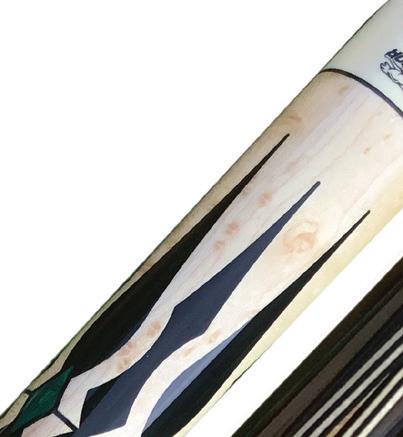
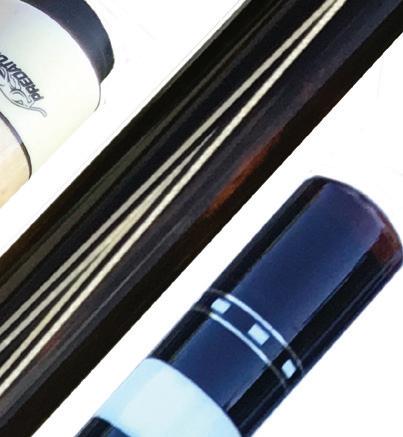




Cues, Cases, Accessories & More!


